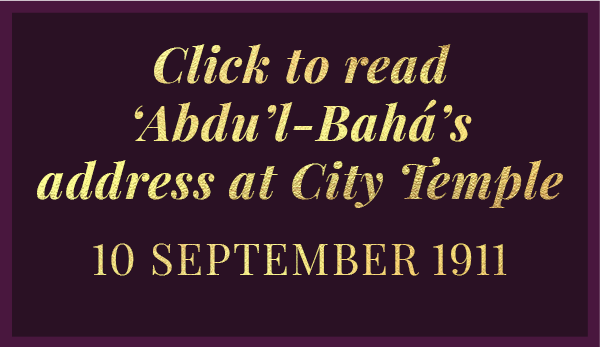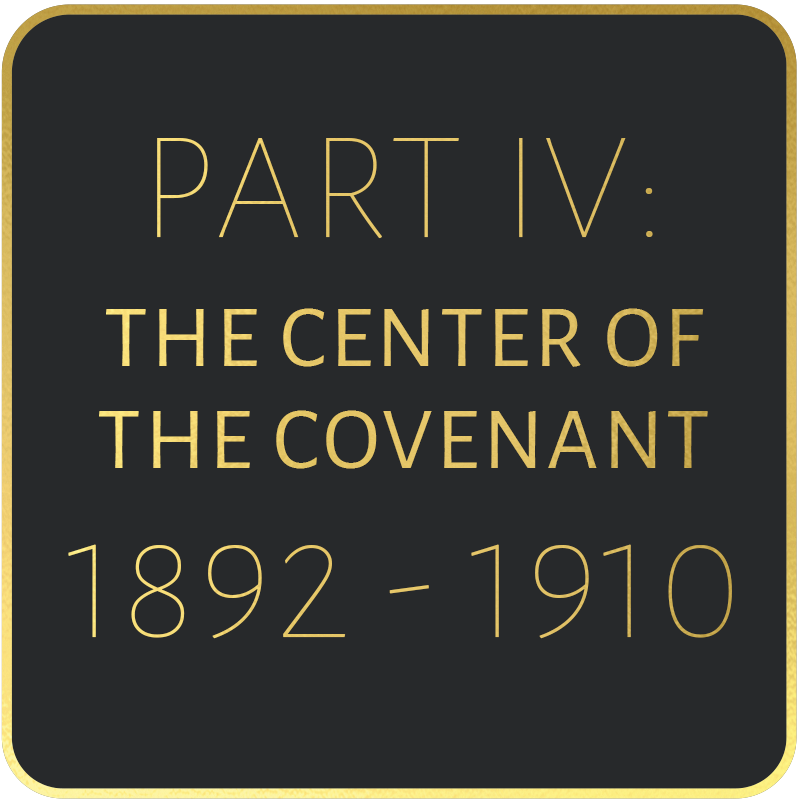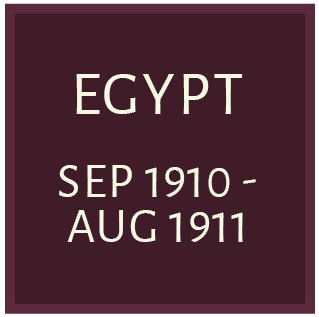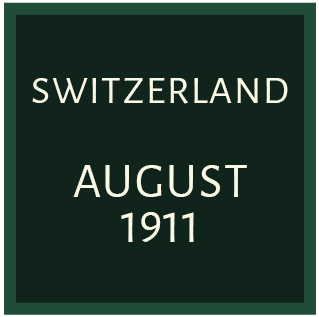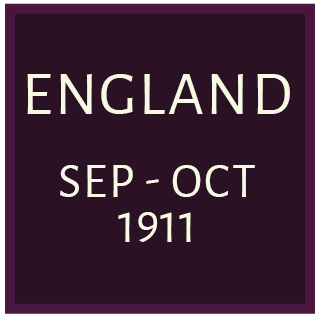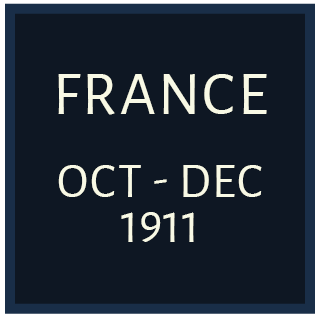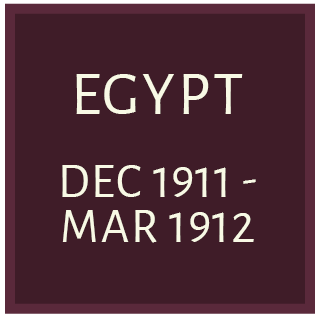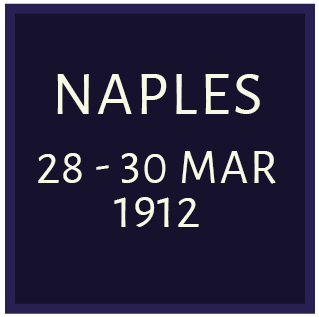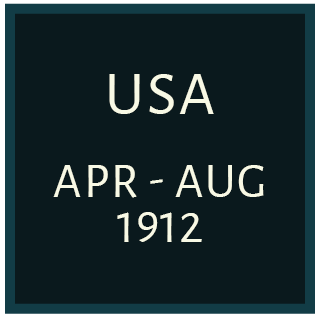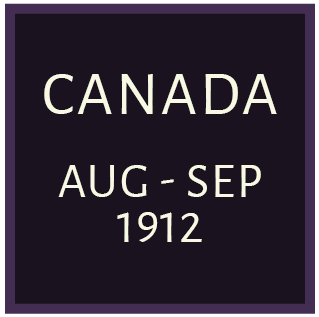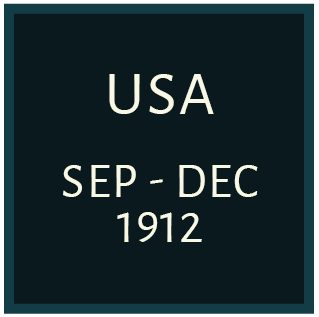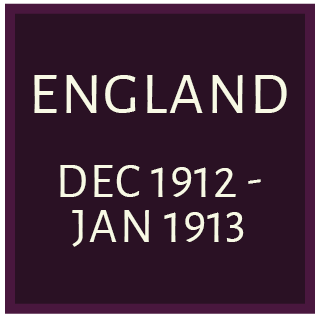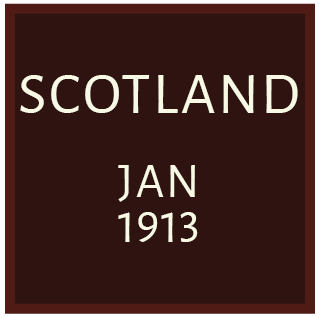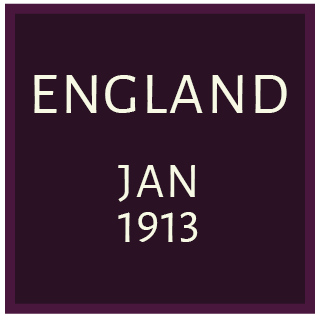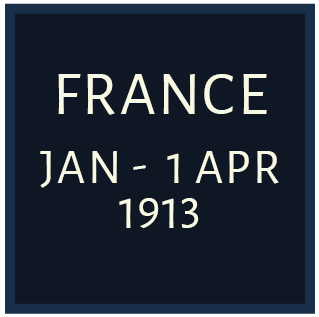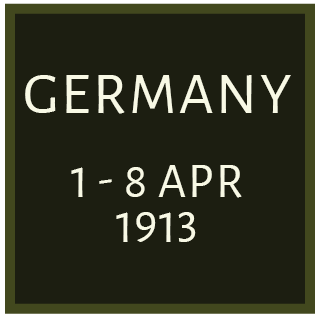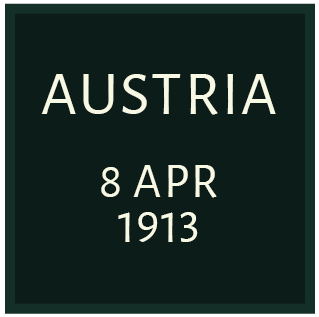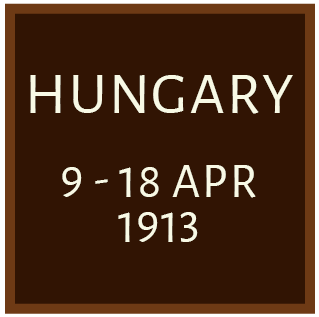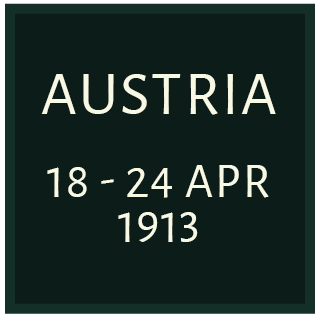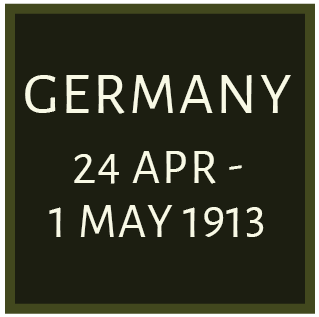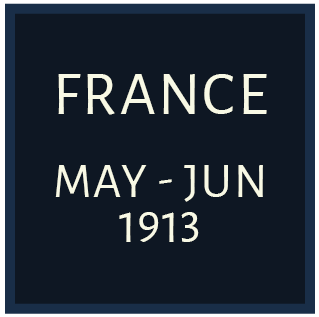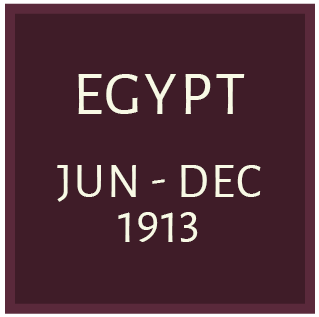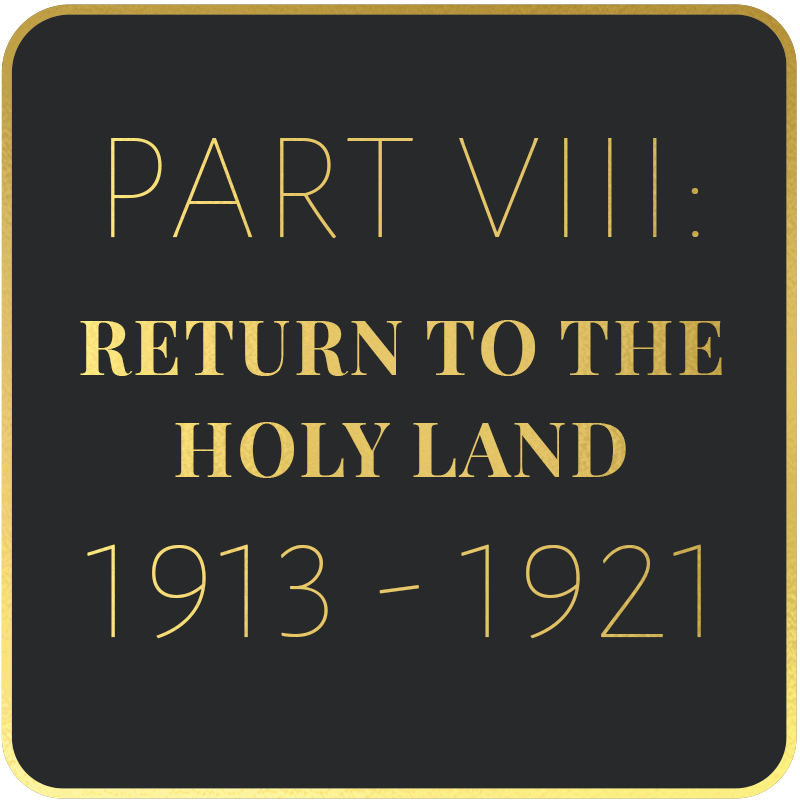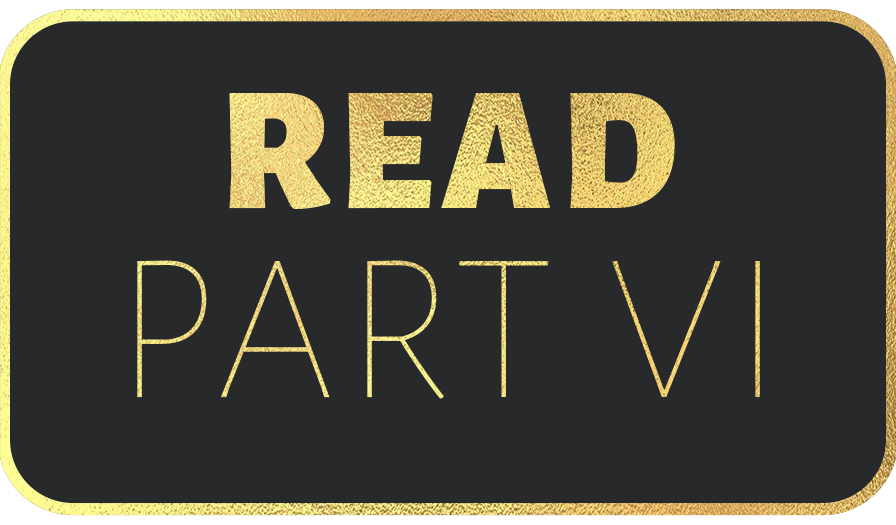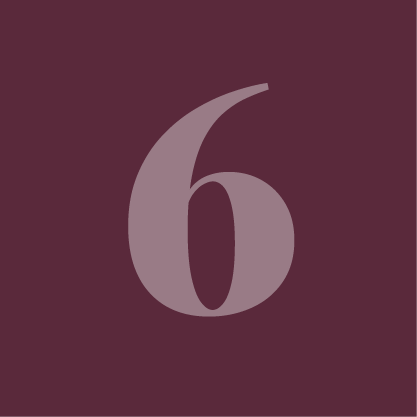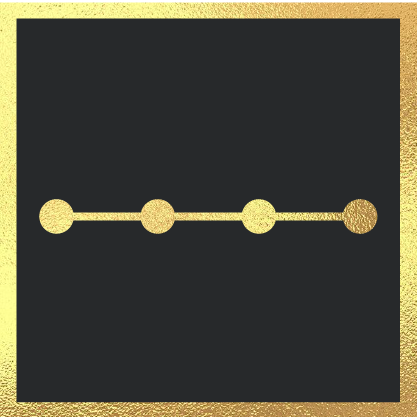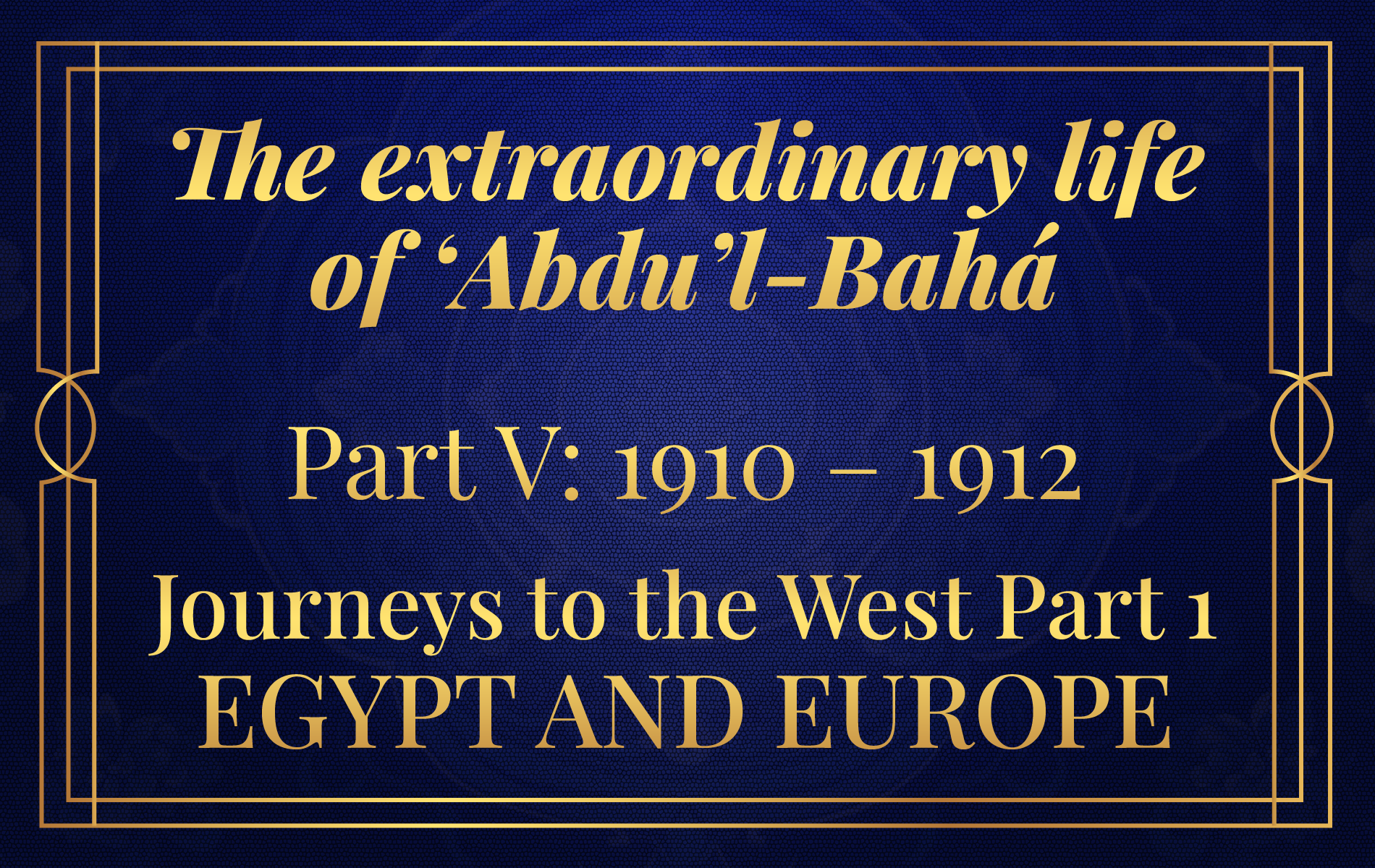
Written and illustrated by Violetta Zein
This part covers the life of ‘Abdu’l-Bahá from the age of 66 in 1910 to the age of 68 in 1912.

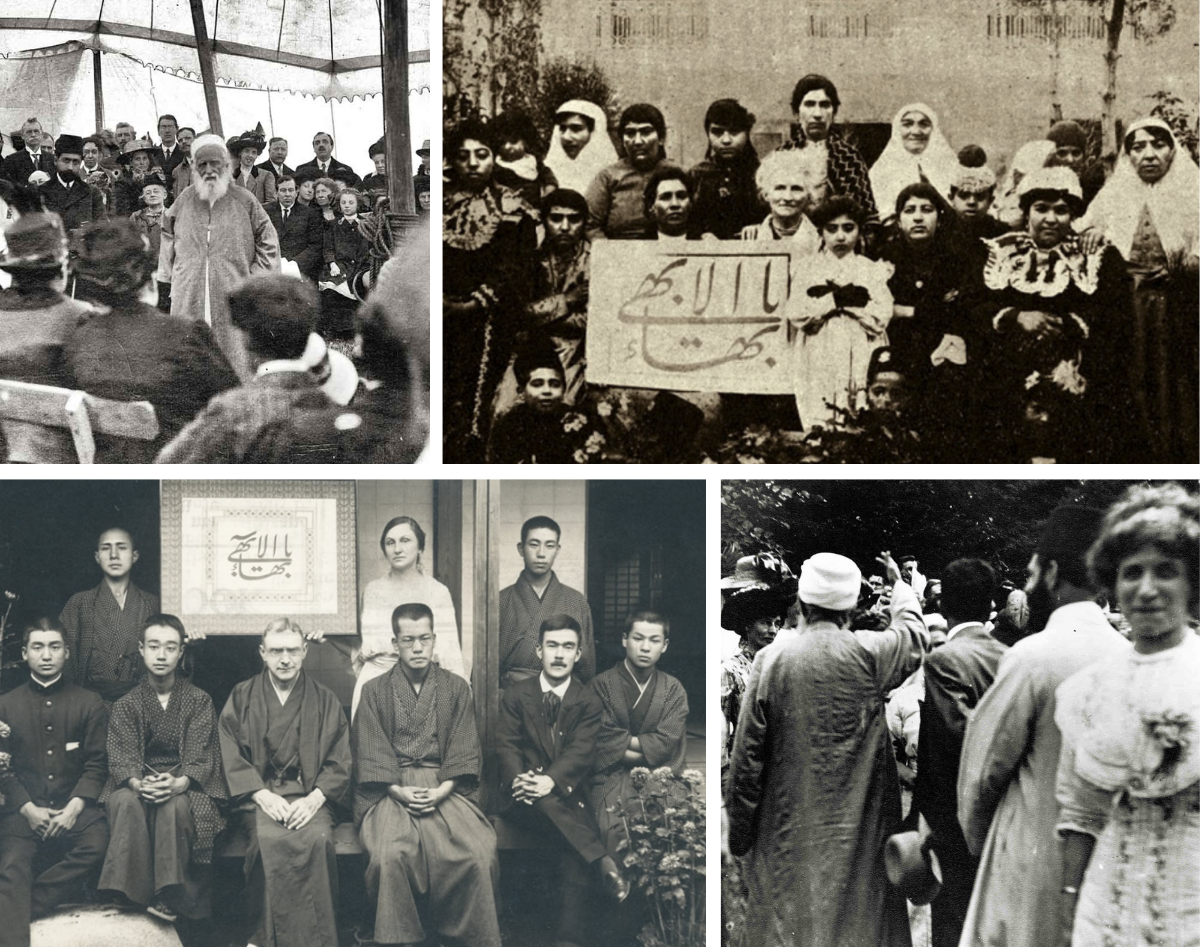
Photo-montage showing ‘Abdu'l-Bahá participating in historic activities both in America, while He was visiting (the laying of the foundation stone of the House of Worship and the Unity Feast in West Englewood, New Jersey) and His direct encouragement of bold initiatives by Western believers in far-flung places: Susan Moody in Persia (See part IV) and Agnes Alexander in Japan (See Part VIII "Worldwide missions during the ministry of ‘Abdu'l-Bahá")
The establishment of the Bahá'í Faith in the West is one of the three overarching goals of 'Abdu'l-Bahá's Ministry, with the safe interment of the sacred remains of the Báb and the erection of the first Bahá'í House of Worship in 'Ishqábád, and stands as the most outstanding achievement that will forever be associated with His Ministry. 'Abdu'l-Bahá Himself participates actively and personally in the historic activities that His Western disciples boldly initiate and vigorously pursue through the propelling power of the Covenant.
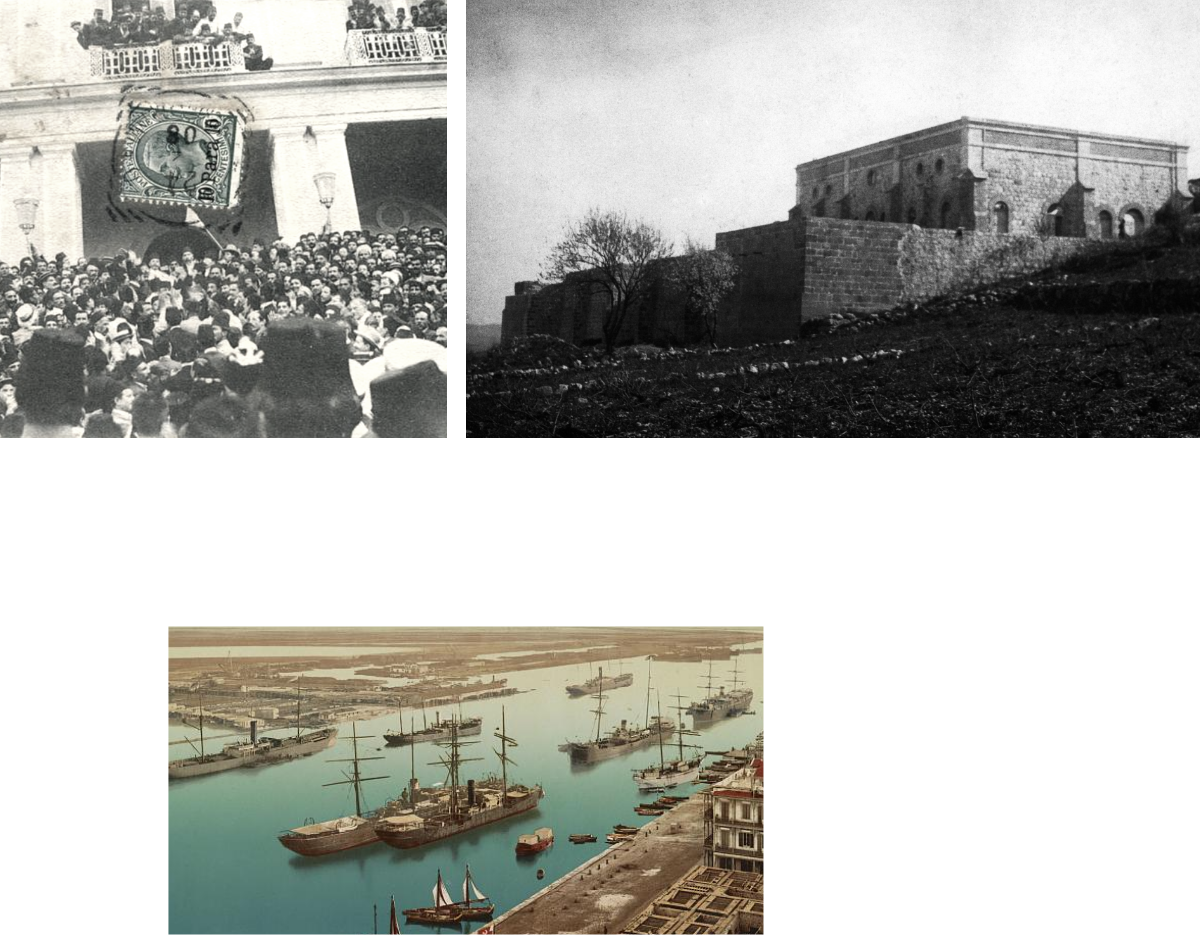
In 1910, all of the crises and responsibilities that have monopolized the first nearly twenty years of 'Abdu'l-Bahá's ministry are no longer obstacles:
The crisis of the Covenant-breakers which has tragically and constantly interfered with 'Abdu'l-Bahá’s plans for the last decade has been providentially resolved.
'Abdu'l-Bahá is free for the first time, after the Young Turks Revolution. It is as if God has taken the shackles from 'Abdu'l-Bahá’s neck and placed them on His royal adversary’s, Sulṭán ‘Abdu’l-Ḥamíd II, who has been so duped by Mírzá Múḥammád ‘Alí.
'Abdu'l-Bahá has finally fulfilled His sacred obligation to Bahá'u'lláh. He has safely returned the holy remains of the Báb to the Holy Land, then reverently and ceremoniously interred them on Mount Carmel, within the solid Shrine He has built at tremendous personal cost.
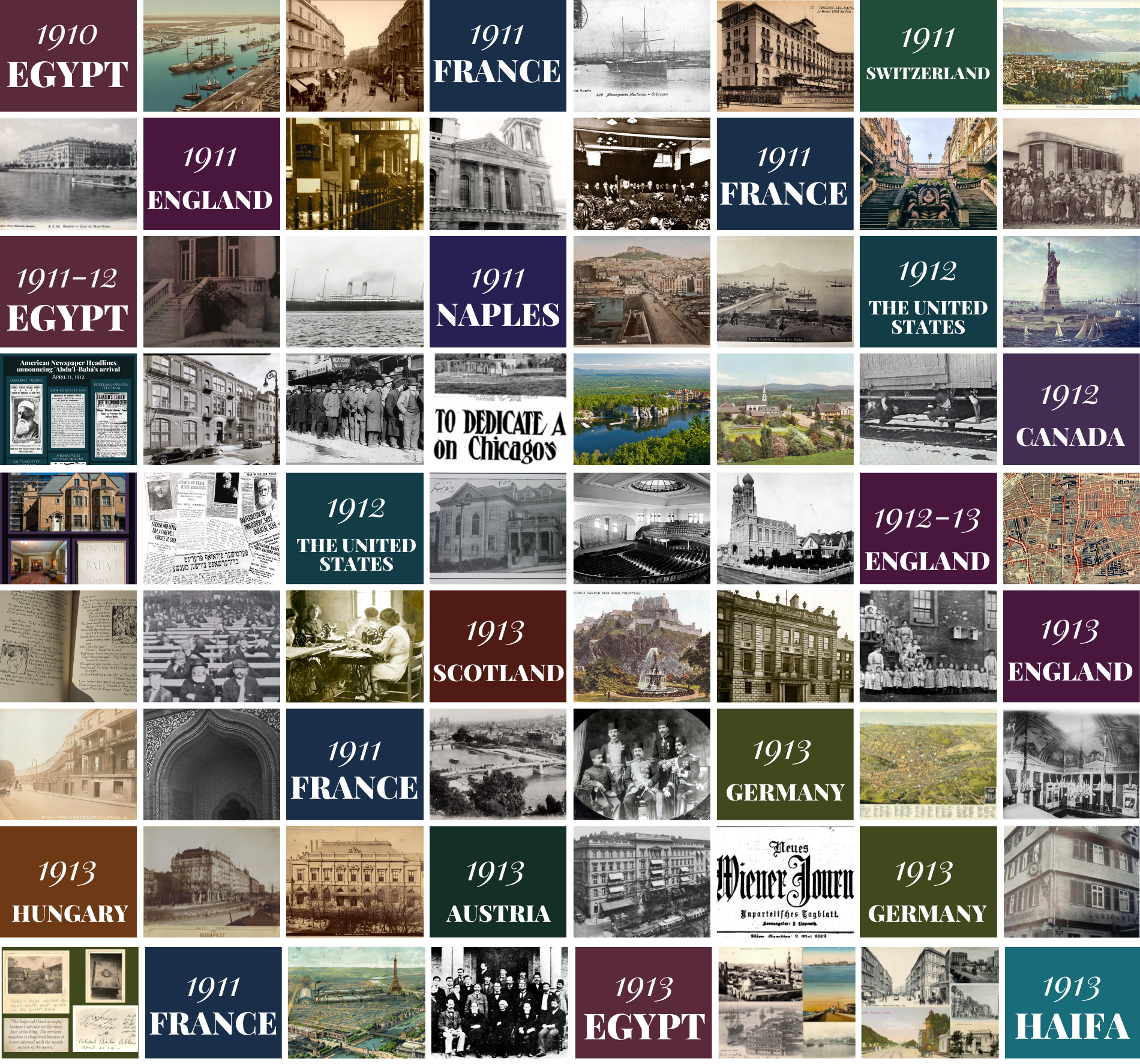
Between 1910 and 1913, ‘Abdu’l-Bahá travels to the West on a mission to spread the teachings of Bahá’u’lláh. The historial Earl Redman in his extensive research, estimates that in His Journeys to the West, 'Abdu'l-Bahá will give at least 495 talks in 63 cities and towns and estimates at least 100,000 people heard Him speak in Egypt, North America coast-to-coast, Canada Europe from Scotland to Hungary. 'Abdu'l-Bahá returns home to the Holy Land more than three years later, on the eve of the First World War.
At the age of 66, this is the first journey He undertakes as a free man. At this point in His life after forty years of imprisonment, ‘Abdu’l‑Bahá is broken in health. He suffers from several illnesses brought on by an entire life spent in exile and imprisonment. 'Abdu'l-Bahá's mind is free from the constant anxieties of laying the Báb's Holy Remains to rest. For the first time in 66 years, since the inception of the Faith, the center of its Covenant is now free from any imprisonment from any government. With this new-found freedom, 'Abdu'l-Bahá arises
with sublime courage, confidence and resolution to consecrate what little strength remained to Him, in the evening of His life, to a service of such heroic proportions that no parallel to it is to be found in the annals of the first Bahá’í century.
Shoghi Effendi, God Passes By
What 'Abdu'l-Bahá will accomplish in the West is a feat but particularly when one remembers the words of Shoghi Effendi:
He Who, in His own words, had entered prison as a youth and left it an old man, Who never in His life had faced a public audience, had attended no school, had never moved in Western circles, and was unfamiliar with Western customs and language, had arisen not only to proclaim from pulpit and platform, in some of the chief capitals of Europe and in the leading cities of the North American continent, the distinctive verities enshrined in His Father’s Faith, but to demonstrate as well the Divine origin of the Prophets gone before Him, and to disclose the nature of the tie binding them to that Faith.
This is a brief overview of 'Abdu'l-Bahá's herculean undertaking, in graphic summary form:
'Abdu'l-Bahá spent 1,194 days in the West.
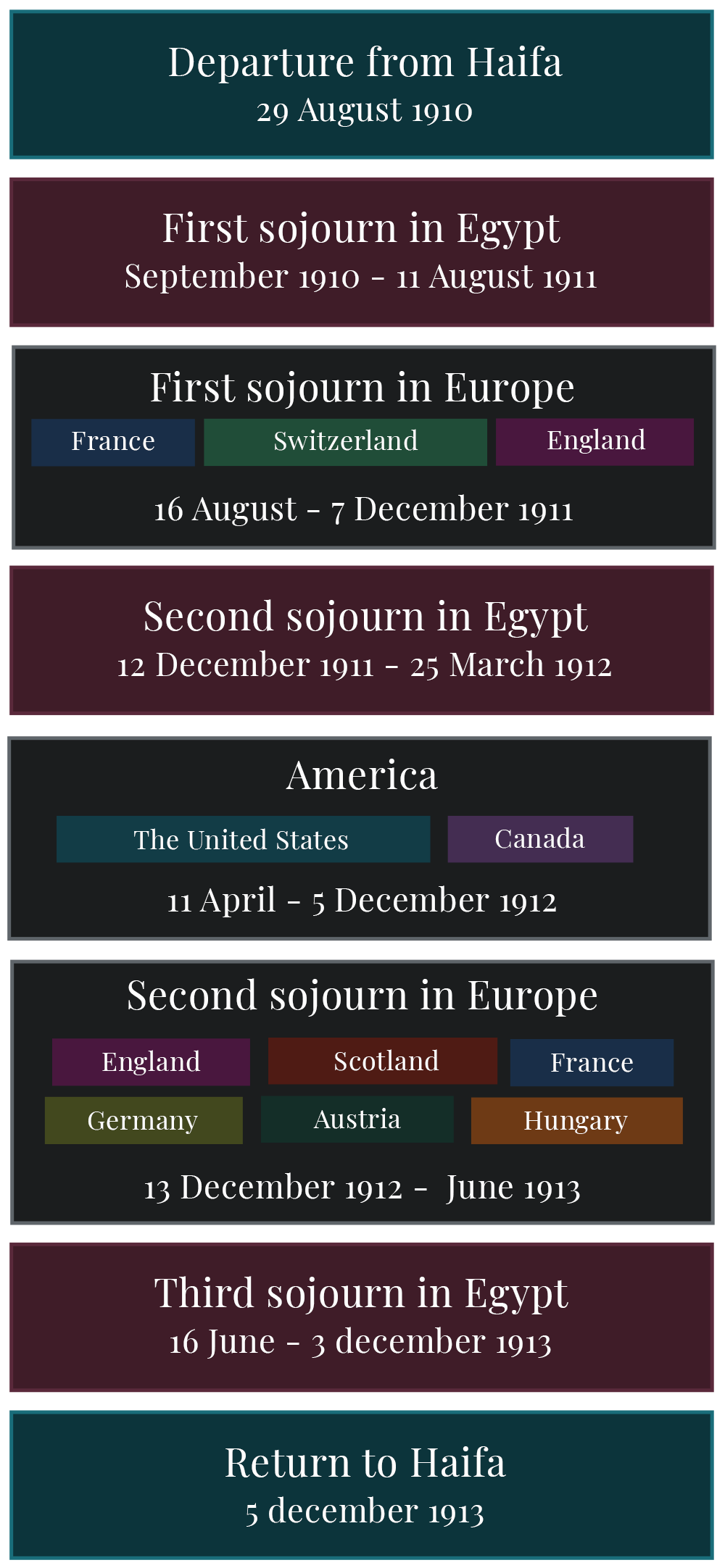
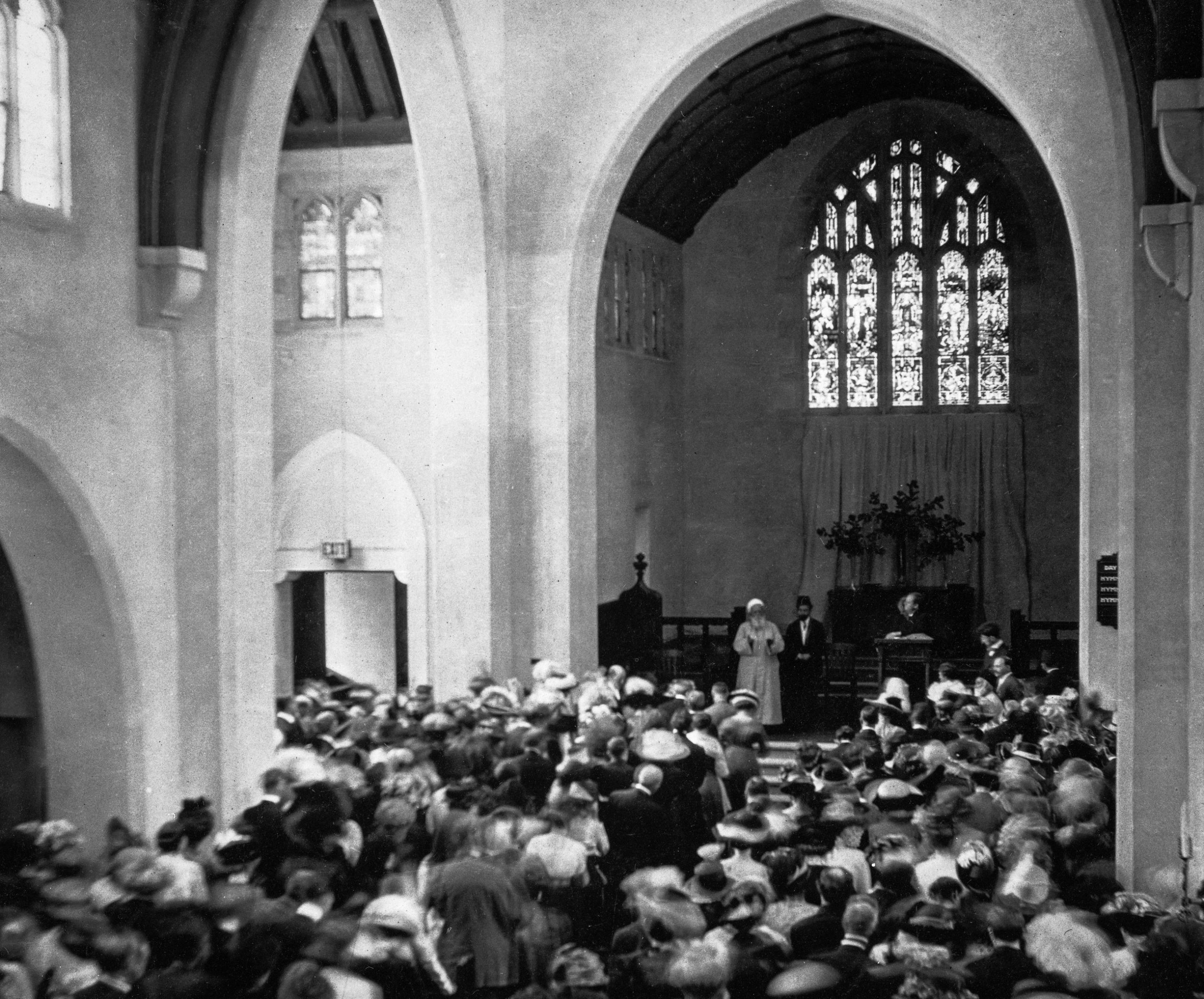
‘Abdu’l-Bahá addressing a large gathering at the Plymouth Congregational Church, Chicago, Illinois, 5 May 1912. Bahá'í Media Bank.
For the first time in History, the Son of a Manifestation of God travels to the West and explains the teachings of His Father's Faith, in person. 'Abdu'l-Bahá expounds on the basic principles of the Bahá'í Faith, God's latest Revelation to mankind and highlights with brilliance, simplicity, persuasiveness and force its key teachings for three full years:
Promises
The independent search after truth; the oneness of humanity; the basic unity of all religions; the abolition of religious, racial, class or national prejudices; the harmony between religion and science; the equality of men and women; the concept of compulsory education; the idea of a universal auxiliary language; the abolition of the extremes of wealth and poverty; the institution of a world tribunal; the principle of work as worship; justice as the ruling principle in human society; and finally universal peace as the supreme goal of all mankind
Warnings
'Abdu'l-Bahá does not simply promulgate the teachings of Bahá'u'lláh. He also travels to the West with warnings, for all the people He meets, high and low alike. He repeatedly warns His audiences of an impending war, which, unstopped, will set Europe ablaze. He foreshadows radical changes in the balance of power in Europe, hints at Turkey's future problems, anticipates the persecution of Jews on the European continent, but still, always promises that the “banner of the unity of mankind would be hoisted, that the tabernacle of universal peace would be raised and the world become another world.”
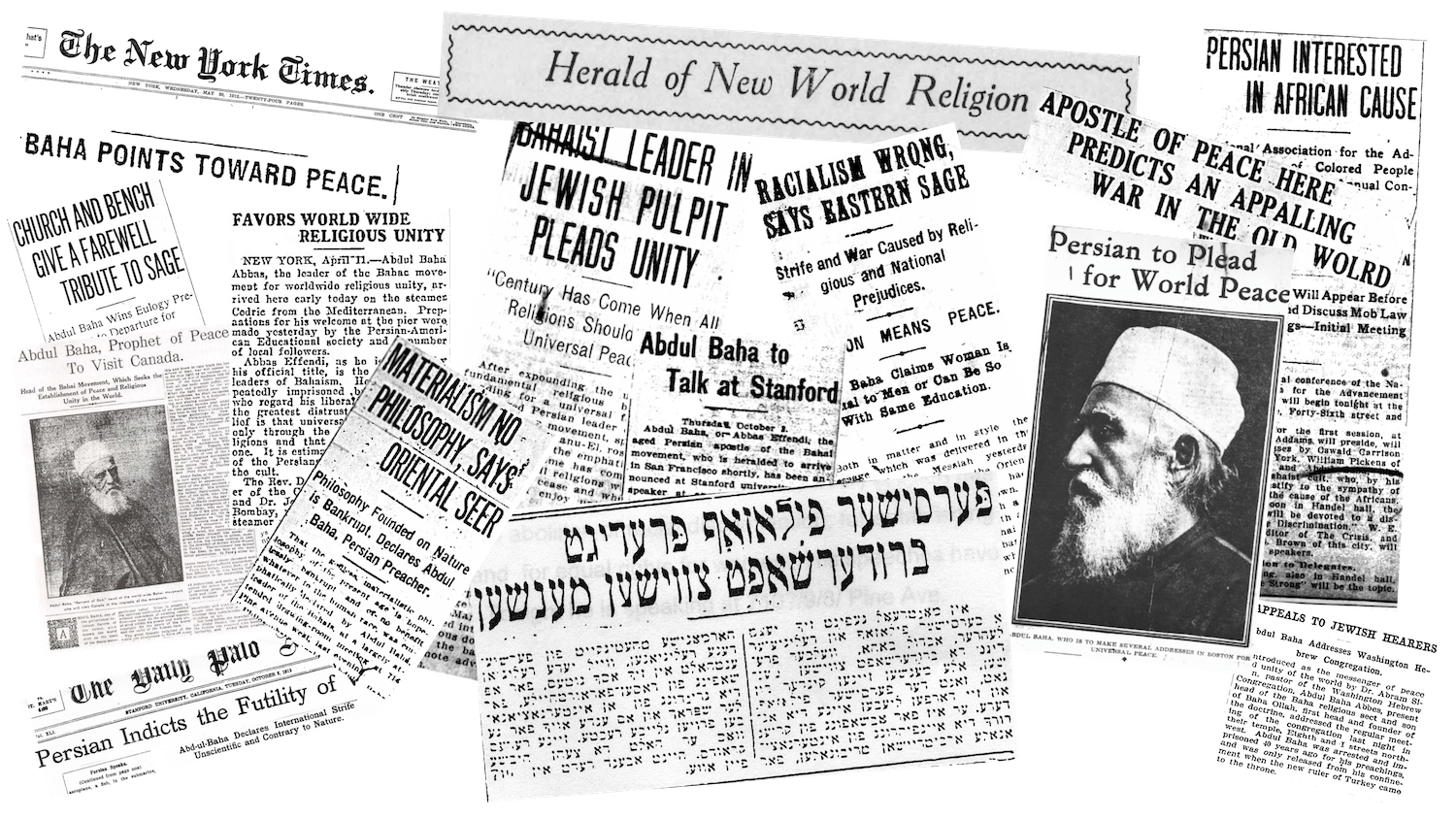
'Abdu'l-Bahá was fearless in championing social and racial minorities, his generosity was as bountiful as the sun shining on all. 'Abdu'l-Bahá had only contempt for attacks on Him by religious fanatics. He was wonderfully frank when demonstrating Jesus Christ's prophetic Mission to an audience of Jews, or speaking to the Divine origin of Islam in a church or a synagogue, or speaking about the necessity of religion to an audience of materialists, agnostics or atheists. 'Abdu'l-Bahá unequivocally glorified Bahá'u'lláh at all times and in front of all audiences. 'Abdu'l-Bahá adamantly, and several times, refused to ingratiate Himself with titled or wealthy people in England and the United States.
But the most remarkable element, in 'Abdu'l-Bahá's Journeys to the West, was the most remarkable element in 'Akká: 'Abdu'l-Bahá's stainless character. Just imagine what all those those people saw up close, who were able to observe 'Abdu'l-Bahá up close during His Journeys to the West! 'Abdu'l-Bahá's spontaneity, his wonderful sense of humor, His genuine and warm loving kindness bestowed to both strangers and friends, Bahá'ís or non-believers, rich or poor, high and low. 'Abdu'l-Bahá shines like the sun. He cannot stop Himself from being the one who gives from dawn to midnight, every single day, every ounce of His energy through daily acts of constant unfailing kindness, attention, generosity, love, gentleness towards everyone, whether on board His ship, to a crowd of children in the Bowery, while pacing in the streets, parks or public squares, in slums or mansions, in intellectual gatherings or Bahá'í meetings.
'Abdu'l-Bahá could never stop bestowing His generosity and being the Mystery of God: the incarnation of every single Bahá'í Virtue and the embodiment of every single Bahá'í ideal. In the West, hundreds, thousands of people saw 'Abdu'l-Bahá with a level of intimacy few outside His direct family, pilgrims, or residents of 'Akká had so far witnessed. 'Abdu'l-Bahá lived and existed in the West exactly as He had in 'Akká for four decades. He ministered to the needy and was at all times aware of a hurt heart or a humble person ignored. He was at home everywhere because there were needy people everywhere. He was indifferent to the tourist attractions and did not care for His comfort or His health. He said in Paris:
I did not come to see expensive hotels or furnishings, but to meet My friends. I did not come to Paris to conform to the customs of Paris, but to establish the standard of Bahá’u’lláh.
Star of the West, Volume XVI, Number 5, page 528
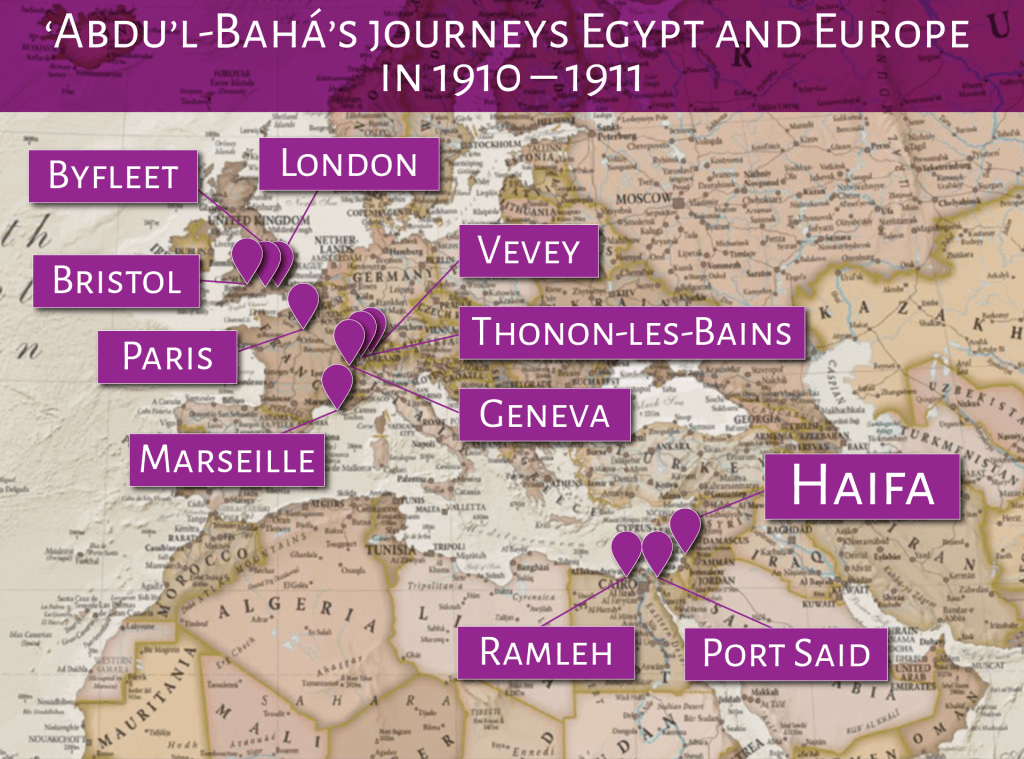
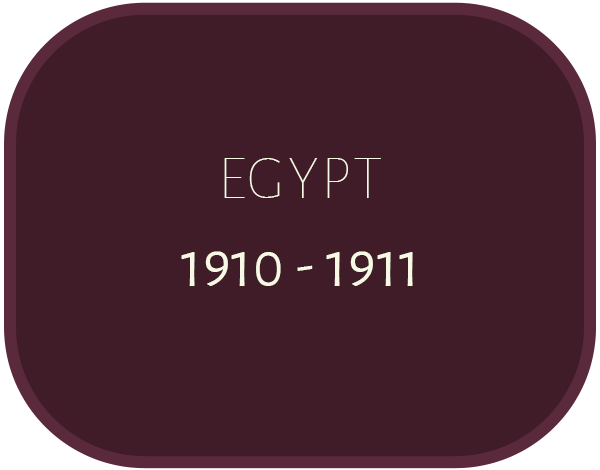
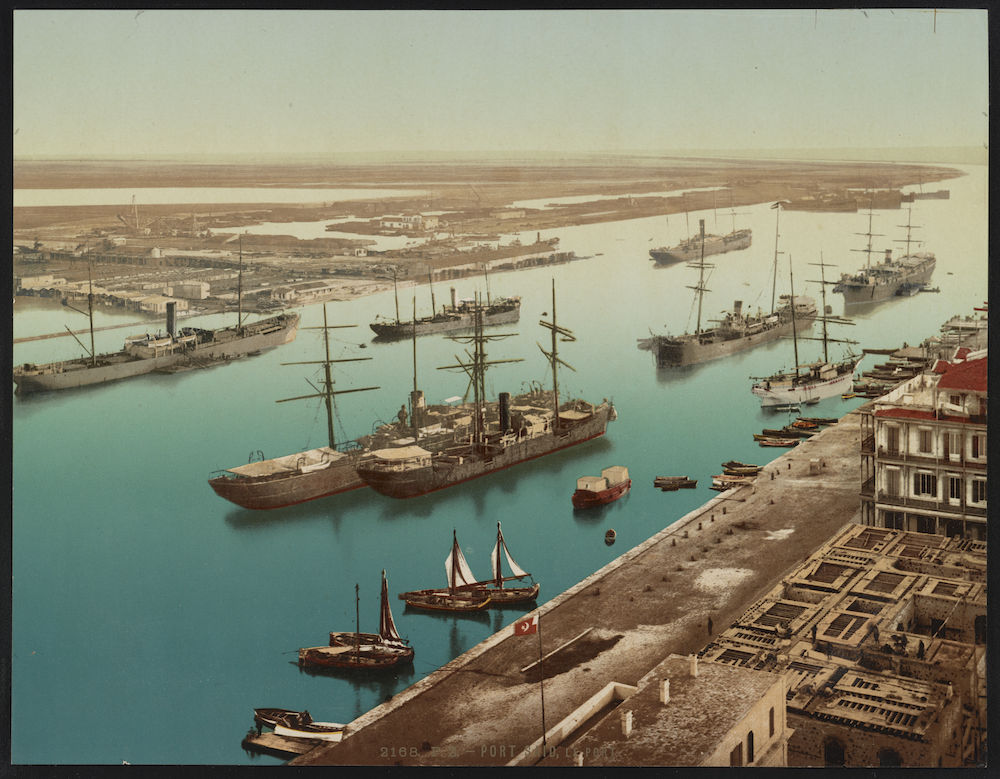
The port in Port Said, Egypt, circa 1890-1910. Library of Congress.
‘Abdu’l-Bahá leaves Haifa on 29 August 1910, stepping onto the steamer Kosseir after having visited the Shrine of the Báb. He leaves the Holy Land without informing a single member of His family except for Mírzá Jalál, His son-in-law, who helps Him leave. unnoticed. While on board the steamer, He writes a letter to His sister, the Greatest Holy Leaf, informing her He has left and that as few details as possible about His departure and travels should be circulated. We estimate arrives in Port Said on September 1, 1910 because all reports say He arrives in September, and the steamer journey from Haifa is almost always two days to Egypt.
No one in Port Said knows ‘Abdu'l-Bahá is arriving because not only has no one been warned, but ‘Abdu'l-Bahá also does not land at a regular deck, but one far away, from which He hires a carriage to the home of Ahmad Yazdí, from where word is sent to all the believers in Port Said that ‘Abdu'l-Bahá has arrived. 'Abdu'l-Bahá remains in Port Said for one month.
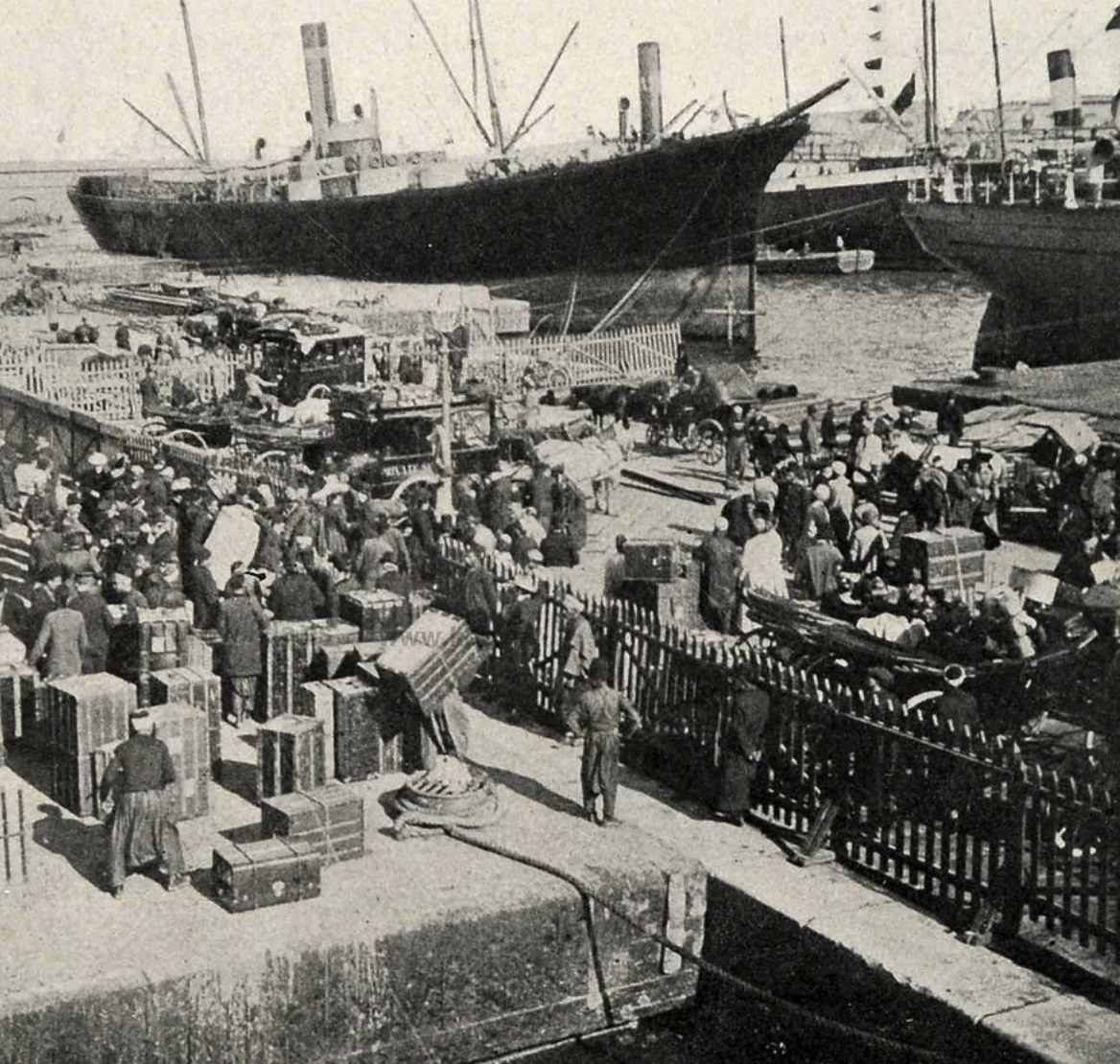
Steamship arriving at the port of Alexandria in 1910, the year 'Abdu'l-Bahá arrives. 5min.pw Flickr Account.
Once again, without forewarning anyone, ‘Abdu’l-Bahá leaves Port Said with the intention to travel to Europe. It becomes obvious that ‘Abdu’l-Bahá’s health at this stage will not permit the trip, which is aborted in Alexandria. After a few days in the Victoria Hotel, ‘Abdu’l- Bahá moves to a rented villa in Ramleh, a suburb of Alexandria.
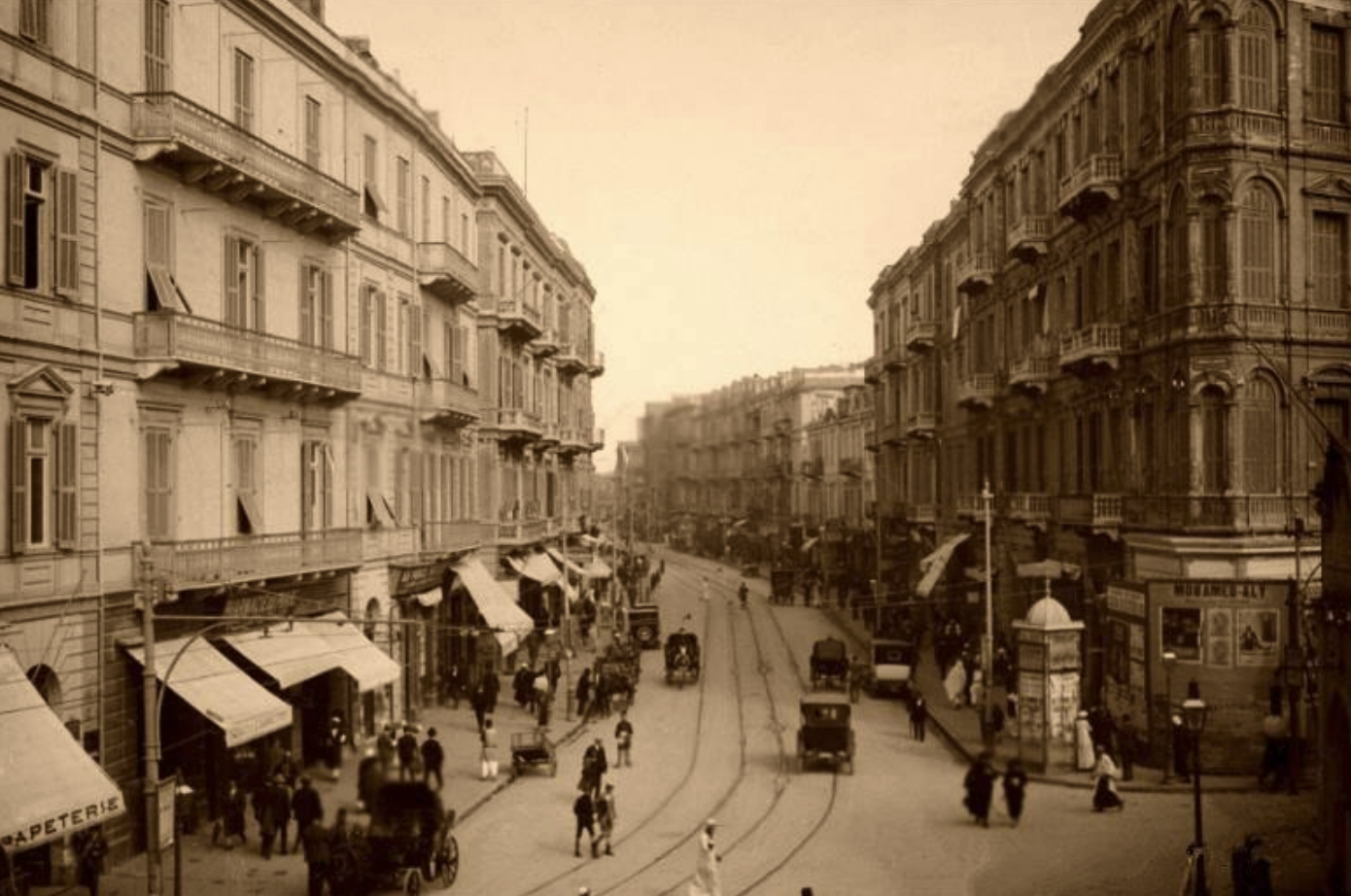
A street scene of Ramleh boulevard, Alexandria, photo by © Roger Viollet, Egypt in 1920 via Monarchy and Dynasty.
Three important things happen during ‘Abdu’l-Bahá’s stay in Ramleh. The first event of great significance is that a sudden change occurs and Egyptian and Persian journalists, until now openly hostile, take a great interest in ‘Abdu’l-Bahá, writing stories that contain praise, interest and respect.
Shaykh 'Ali Yusuf, the editor of the Arabic paper, al-Mu'ayyad, is one of the journalists who has previously attacked the Bahá'ís harshly, urging punitive measures against them. After he visits 'Abdu'l-Bahá, he publishes an article in the October 16, 1910 paper under the headline: 'Al-Mirza 'Abbas Effendi'. Here are the remarkable opening lines of his article, an omen of things to come on 'Abdu'l-Bahá's Journeys to the West, which are just beginning:
His Eminence Mirza 'Abbas Effendi, the learned and erudite Head of the Bahá'ís in 'Akka and the Centre of authority for Bahá'ís throughout the world, has reached the shores of Alexandria 'Abdu'l-Bahá stayed in the Victoria Hotel, but after a few days moved to a rented house. . .He is a venerable person, dignified, possessed of profound knowledge, deeply versed in theology, master of the history of Islam, and of its denominations and developments . . . whosoever has consorted with Him has seen in Him a man exceedingly well-informed, Whose speech is captivating, Who attracts minds and souls,dedicated to belief in the oneness of mankind . . .His teaching and guidance revolve round the axis of relinquishing prejudices: religious, racial, patriotic.
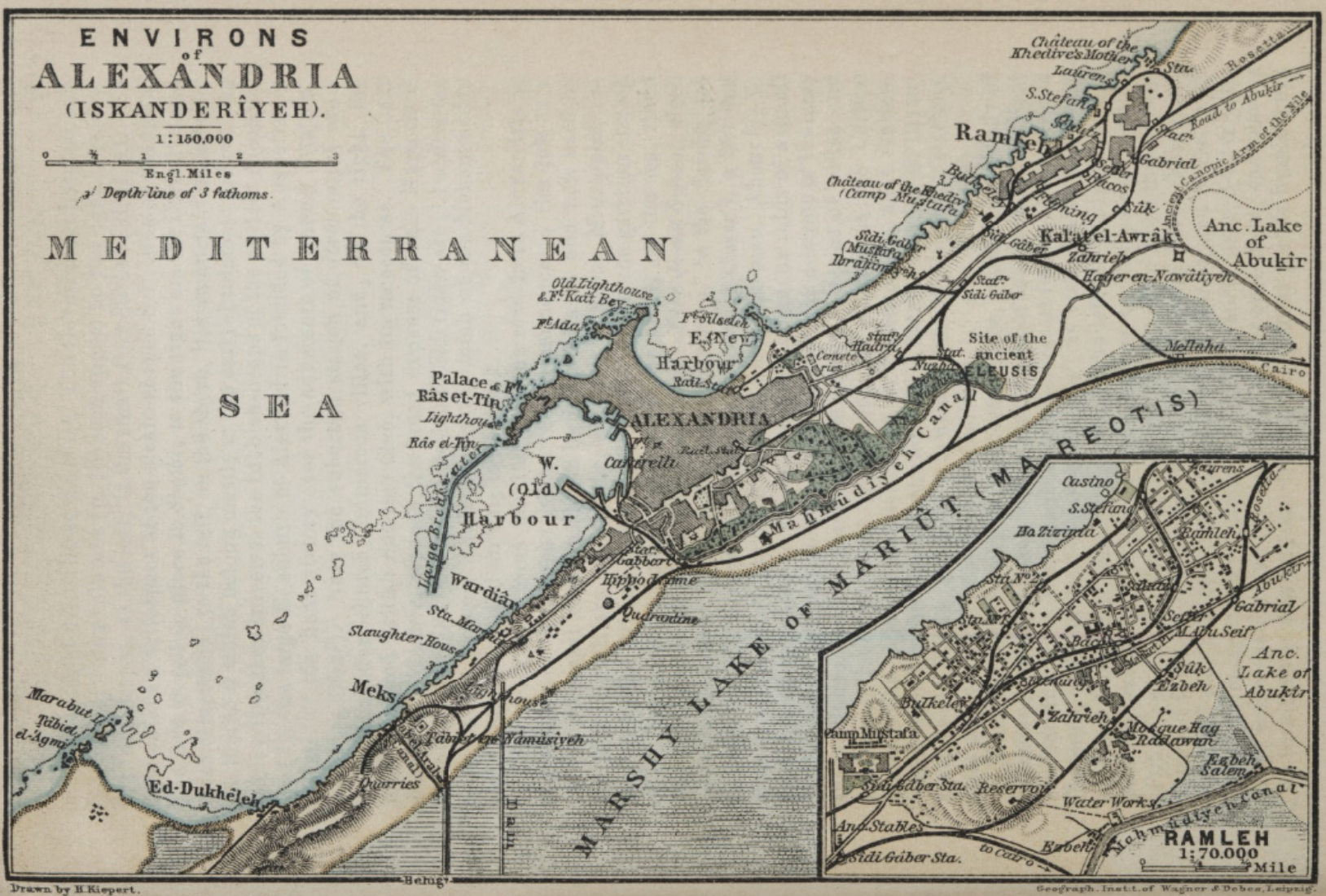
Postcard map of Alexandria with Ramleh as an inset, drawn by H. Kiepert. Rice Digital Scholarship Archive.
'Abdu'l-Bahá comes to Ramleh, a suburb of Alexandria when Ali Yazdi is eleven years old. A villa is rented for the Master and His family, not far from the Hotel Victoria, after 'Abdu'l-Bahá aborts His planned trip to Europe in order to regain His health. His villa is in a lovely residential neighborhood, next to the Mediterranean and the beaches, and boasts a garden with blossoms and flowering shrubs. Here, 'Abdu'l-Bahá receives guests: public figures, aristocrats, clerics, writers, but also the poor and needy, as is His lifelong custom, wherever He may be.
Ali Yazdi often visits, and becomes fast friends with Shoghi Effendi when the latter arrives, even going to school together for a time. Most of the time, when Ali stops by the Master's villa, he spends his time in the garden, waiting to catch a glimpse of 'Abdu'l-Bahá, when He comes out for His customary walk, again, something 'Abdu'l-Bahá does everywhere He goes, without fail. Ali waits to see Him talk to pilgrims from all corners of the world, just to hear His vibrant and melodious voice ring in the open air simply exhilarates the boy. He perceives a radiance about 'Abdu'l-Bahá, His unlimited kindness and love shines through Him and just seeing Him infuses the boy with a feeling of goodness, humility and exceeding happiness.
The young boy sees 'Abdu'l-Bahá very often at meetings and for Feasts. The first time 'Abdu'l-Bahá comes to Ali Yazdi's house to address a large group of Bahá'ís, everyone is gathered happily talking and waiting, but suddenly the room grows quiet. Ali Yazdi can hear 'Abdu'l-Bahá very beautiful, very resonant voice from outside, He sweeps into the room, His robe flowing, straight as an arrow, His head thrown back. He wears a white turban around an ivory-colored cap, His silver grey hair falling in waves at His shoulders. His beard is white, His forehead is broad and His eyes are keen. He looks at everyone and welcomes them all with Khushámadíd! Khushámadíd! (Welcome! Welcome!).
Ali Yazdi is behaving as he's been told to in the presence of the Master, hands crossed in front of him, looking down, but he is so anxious to lay eyes on 'Abdu'l-Bahá that he looks up quickly now and then. This is only the first time that Ali Yazdi hears 'Abdul-Bahá speak. Over the next nine months, he has the privilege of attending many such talks and hearing 'Abdu'l-Bahá speak on many subjects. These months are like heaven to Ali Yazdi, only there is still school, and there are still chores. When 'Abdu'l-Bahá leaves the boy is sad, but 'Abdu'l-Bahá is coming back soon.
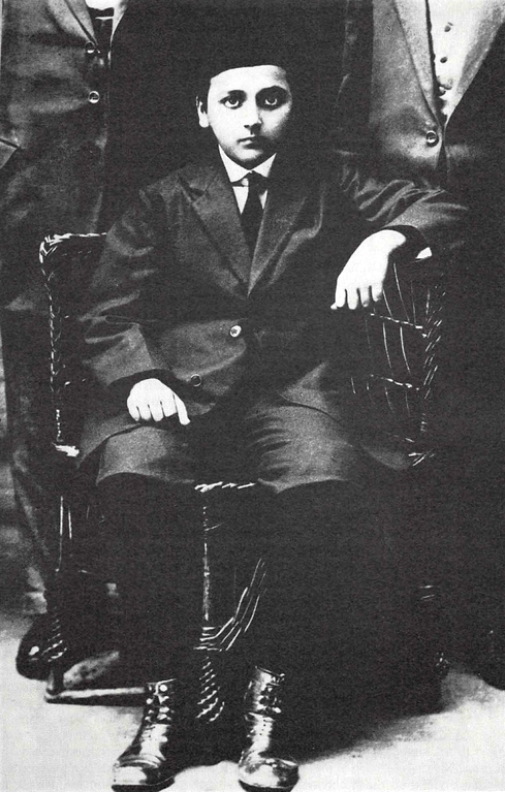
Shoghi Effendi, around 1911. From Bahá'í World Volume 13 page 81 via Baha'i Media.
Shortly after ‘Abdu’l-Bahá settles in Ramleh, He sends for His 13-year-old grandson, Shoghi Effendi. There are no exact dates for this trip of Shoghi Effendi to Egypt, but he returns the following year.
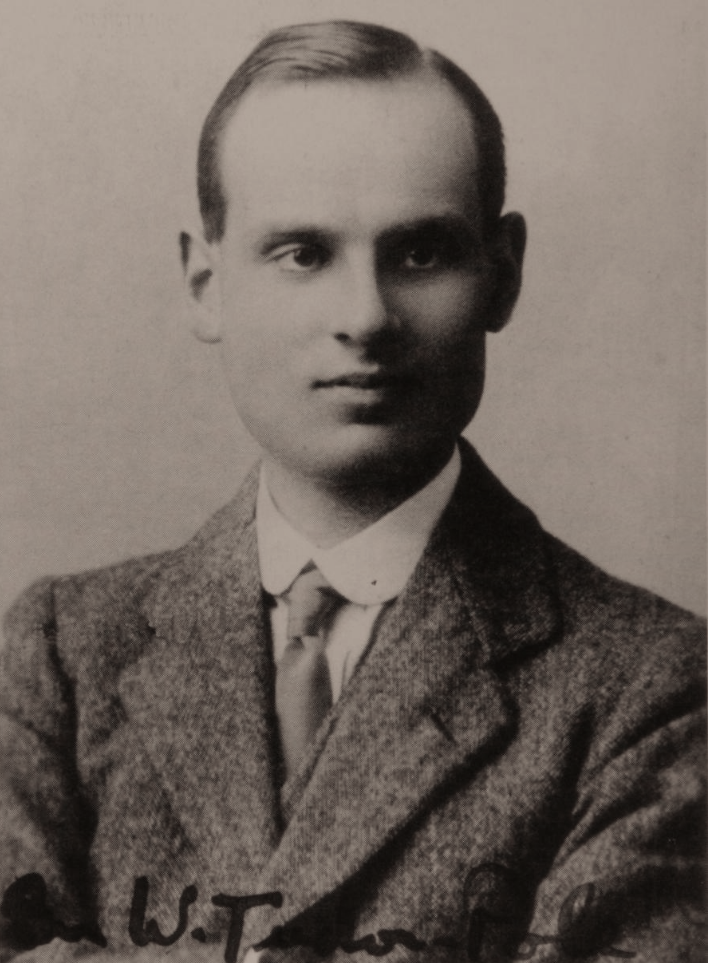
Major Wellesley Tudor Pole. 'Abdu'l-Bahá in America: 1912-2012.
The second important event that takes place in Ramleh in the Fall of 1911 is that Major Wellesley Tudor Pole meets 'Abdu'l-Bahá for the first time. Wellesley Tudor Pole is a British spiritualist. He has spent the last few years engrossed in the discovery of the "Glastonbury cup" which he believes is the Holy Grail, and has built a chapel for it called the "Oratory" (which 'Abdu'l-Bahá will bless next year in Bristol). On his travels to Constantinople to find proof connecting his cup to the Holy Grail, he hears of 'Abdu'l-Bahá and becomes fascinated with the Master's ability to exert such powerful influence from within the prison walls of 'Akká. He is determined to learn more and when he hears 'Abdu'l-Bahá is in Egypt, he travels to meet Him and spends nine days in His company. One event that will greatly affect Wellesley Tudor Pole is a mission 'Abdu'l-Bahá sends him on to find a nearly-blind Persian student in Paris, Tamaddunu'l-Mulk. After delivering the Master's message to him, Tammadun rejoins 'Abdu'l-Bahá in Egypt and recovers his sight, accompanying him to France and Switzerland on His journeys there in 1911.
Their connection will continue for decades through Tudor’s Pole’s enduring connection to Shoghi Effendi. Tudor Pole will remain in close contact with ‘Abdu’l-Bahá, will present for Him at the Universal Races Congress in 1911 and will host the Master in his home in Bristol in January 1913. In July 1920, Pole will be the recipient of a Tablet from ‘Abdu’l-Bahá delivered by Shoghi Effendi July 1920 and it is in Tudor Pole’s home that Shoghi Effendi will be found unconscious, having accidentally seen the telegram informing him of ‘Abdu’l-Bahá’s passing. Tudor Pole would continue to assist Shoghi Effendi in various capacities for many years.
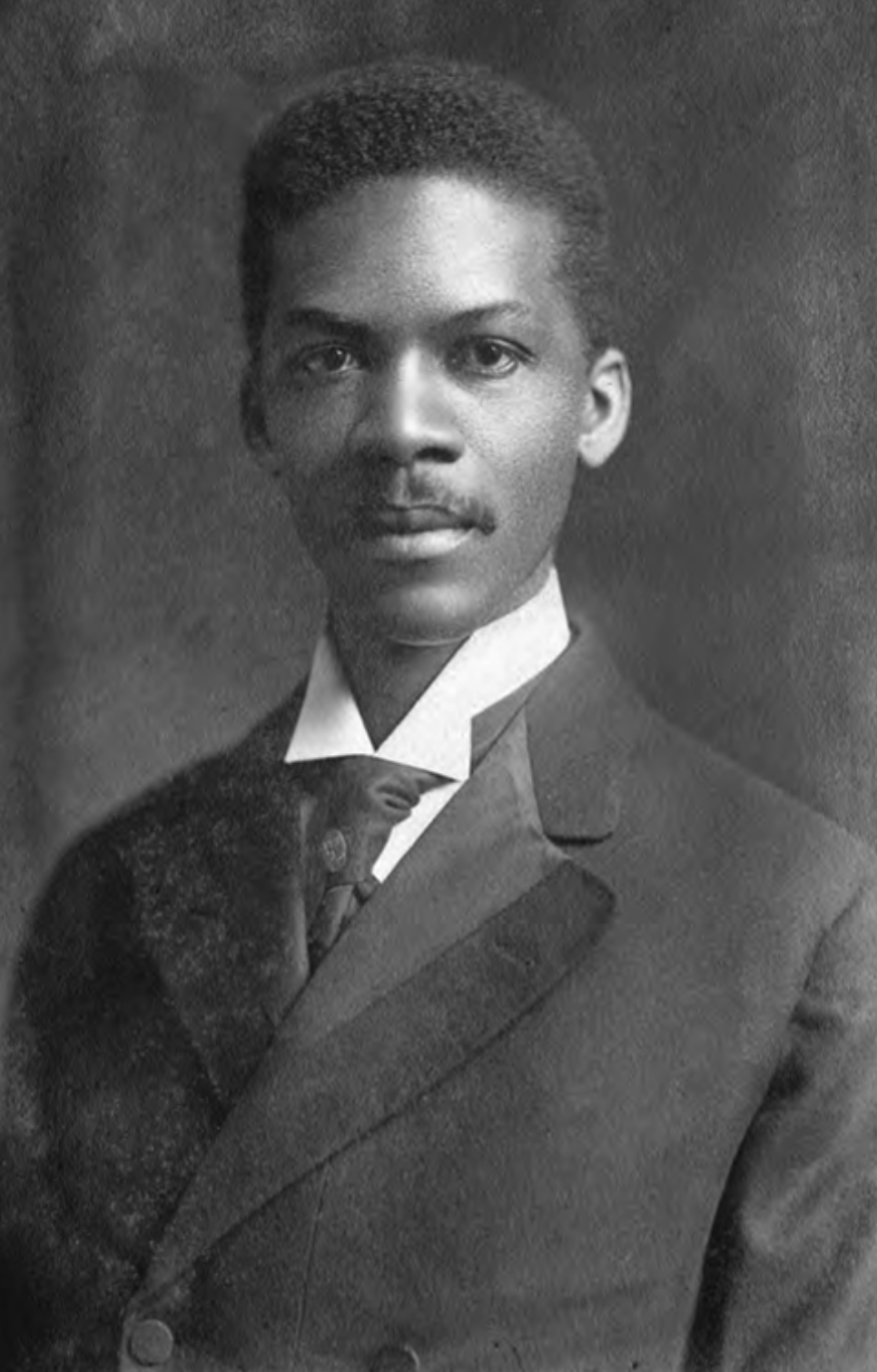
Louis G. Gregory as a young man, probably on graduating from Fisk University, 1896. Louis G. Gregory Bahá'í Museum.
The third event of note is the encounter between ‘Abdu’l-Bahá and future Hand of the Cause Louis Gregory. Louis Gregory arrives in Ramleh for a six-day pilgrimage at the direct invitation of 'Abdu'l-Bahá. Louis Gregory writes a wonderful portrait of 'Abdu'l-Bahá for us in Star of West, concluding with the message that 'Abdu'l-Bahá has imparted to him during his pilgrimage:
The Reality of Abdul-Baha, the supreme joy of the Kingdom, is found by promoting that Which tends to unity and harmony among the friends of God and the Whole human family.
Star of the West Volume 2 number 10,
One very significant thing happens during Louis Gregory's visit to Ramleh: 'Abdu'l-Bahá speaks in extraordinary terms about race unity and extolls the many benefits of interracial marriage for society and families. Listening, are Louisa Mathew and Louis Gregory, who, in a year's time, while 'Abdu'l-Bahá is in the United States will become the first interracial Bahá'í couple.
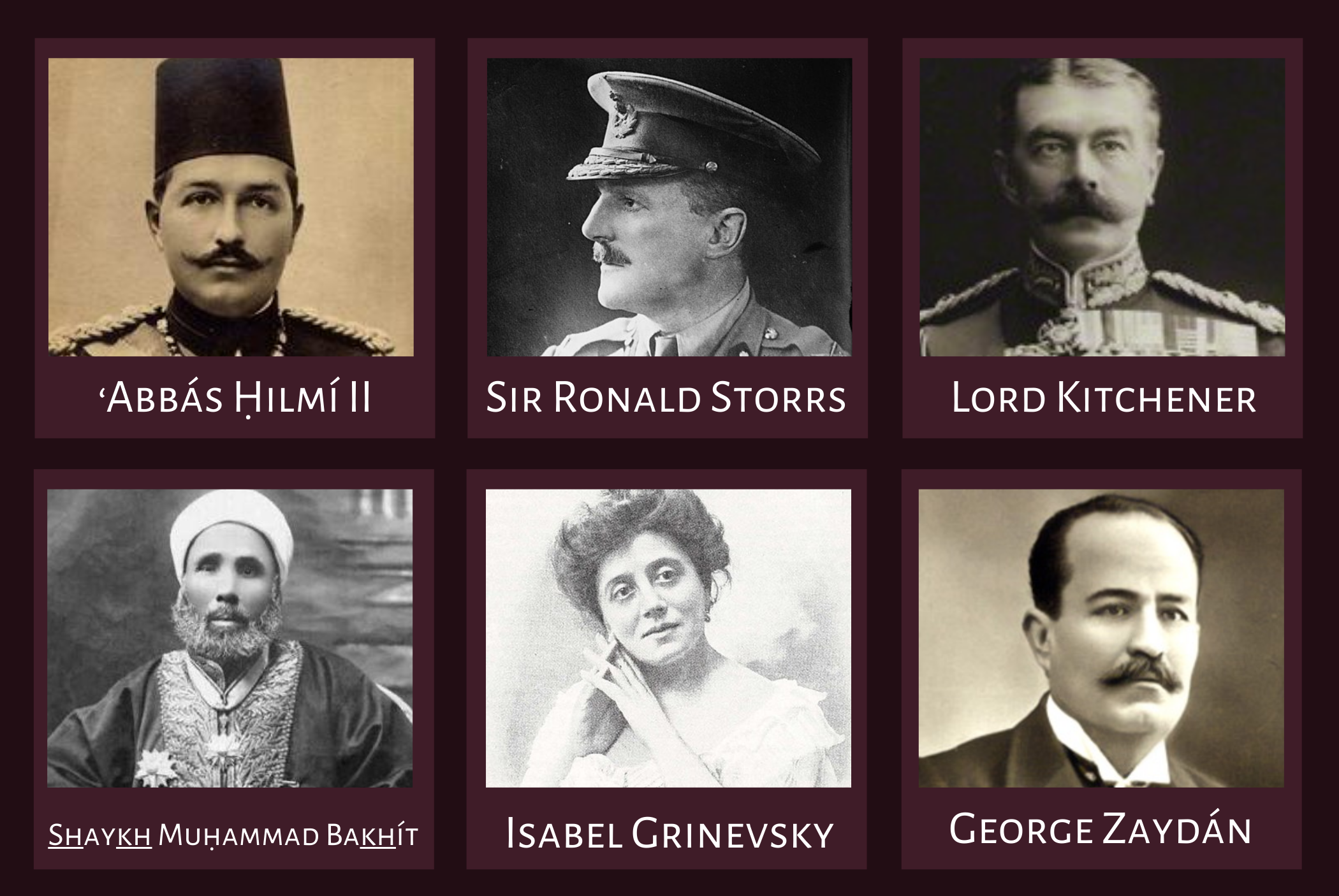
‘Abdu’l-Bahá leaves Ramleh, near Alexandria, for Cairo and takes residence in Zaytún, a suburb of Cairo. The newspaper stories about the Master display increasing praise, friendliness and admiration. It is during this time that ‘Abdu’l-Bahá meets the Khedive–the Governor of the entire Ottoman province of Egypt–‘Abbás Ḥilmí II several times, along with the Oriental Secretary of the British Agency, Ronald Storrs, the Russian poet Isabel Grinevsky, and George Zaydán, an eminent writer and celebrated newspaper editor. Below are photos of these notables 'Abdu'l-Bahá met along with others mentioned by Shoghi Effendi in God Passes By, over the course of 'Abdu'l-Bahá's three visits to Egypt: Lord Kitchener, the Muftí of Egypt, Shaykh Muḥammad Bakhít, and the Khedive’s Imám, Shaykh Muḥammad Ráshid (no photo found).
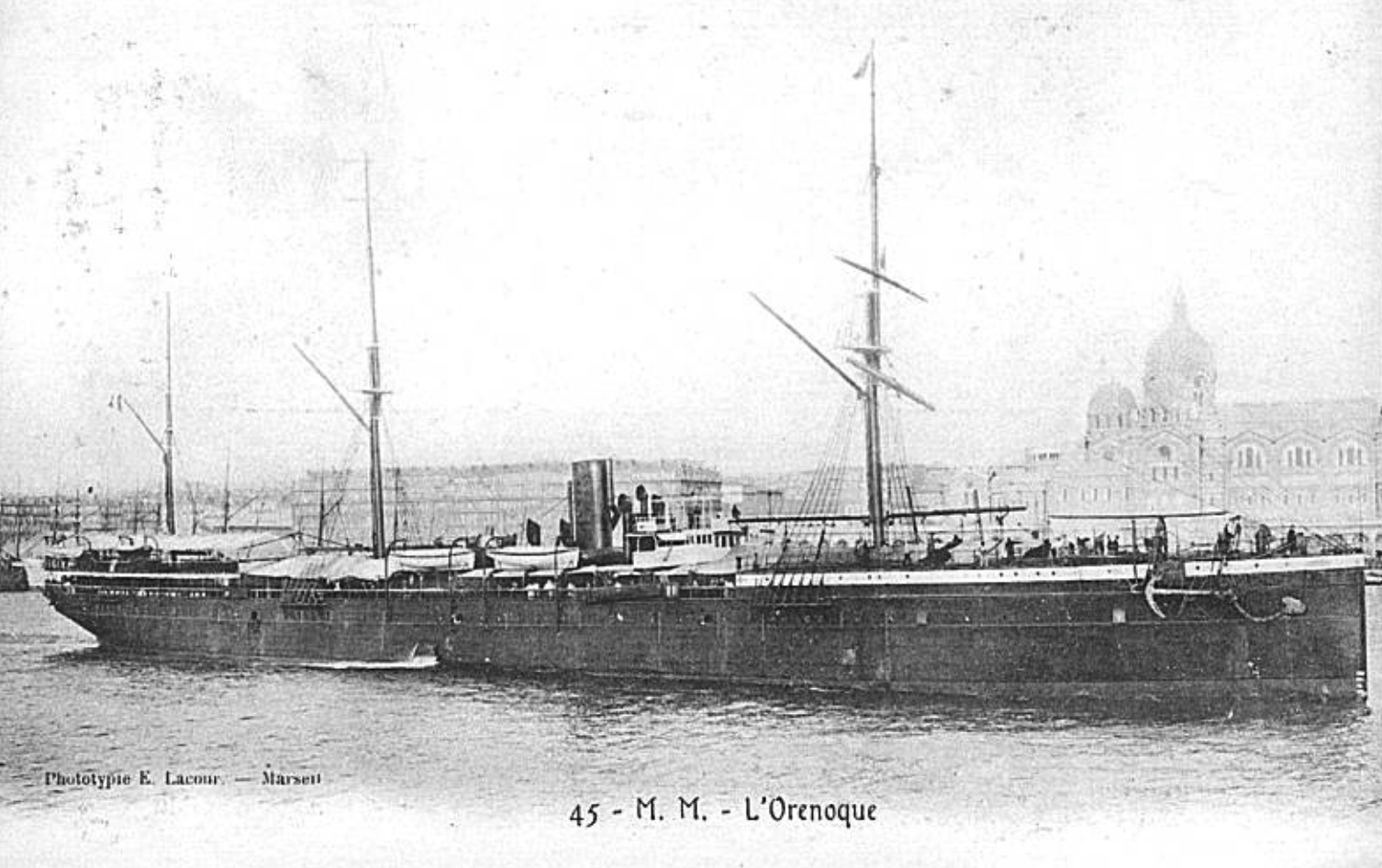
The L'Orénoque in Marseille. L'Encyclopédie des messageries maritimes.
‘Abdu’l-Bahá leaves Egypt from Alexandria aboard the L’Orénoque.
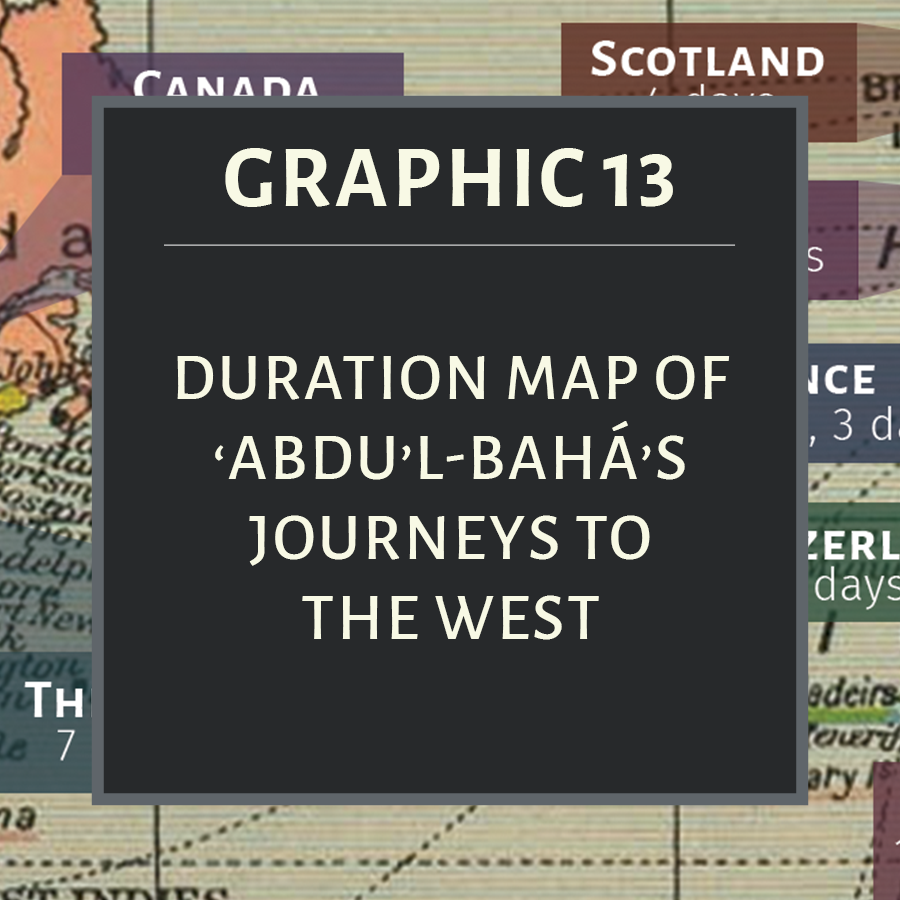
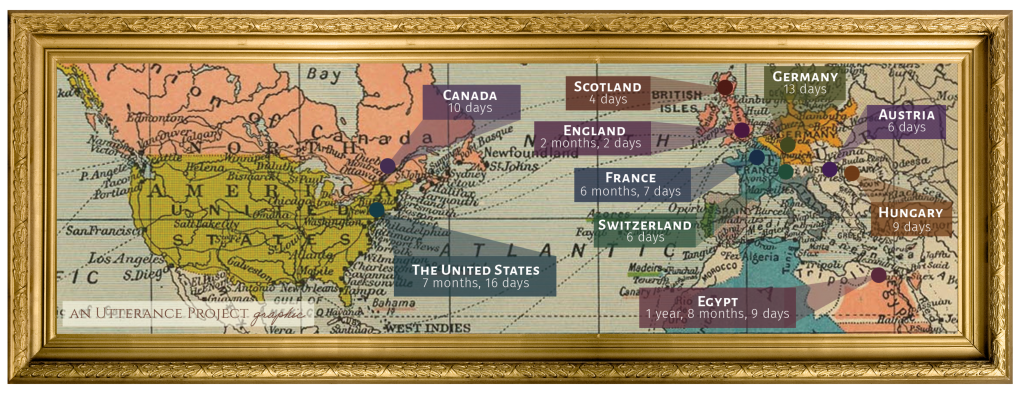
Map of the total time ‘Abdu’l-Bahá spent in each of the 10 countries He visited on 3 continents during His 3-year Journeys to the West. An infographic breaking down the visits and days spent is available here. See this Google Sheets document for formulas used in calculating duration. Original graphics by Violetta Zein. Base Map: 1910 map entitled “The World: Colonial Possessions and Commercial Highways” Edited by Sir Adolphus William Ward and others. Wikimedia Commons.
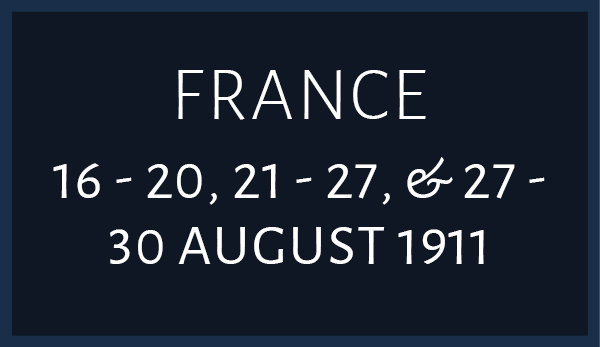
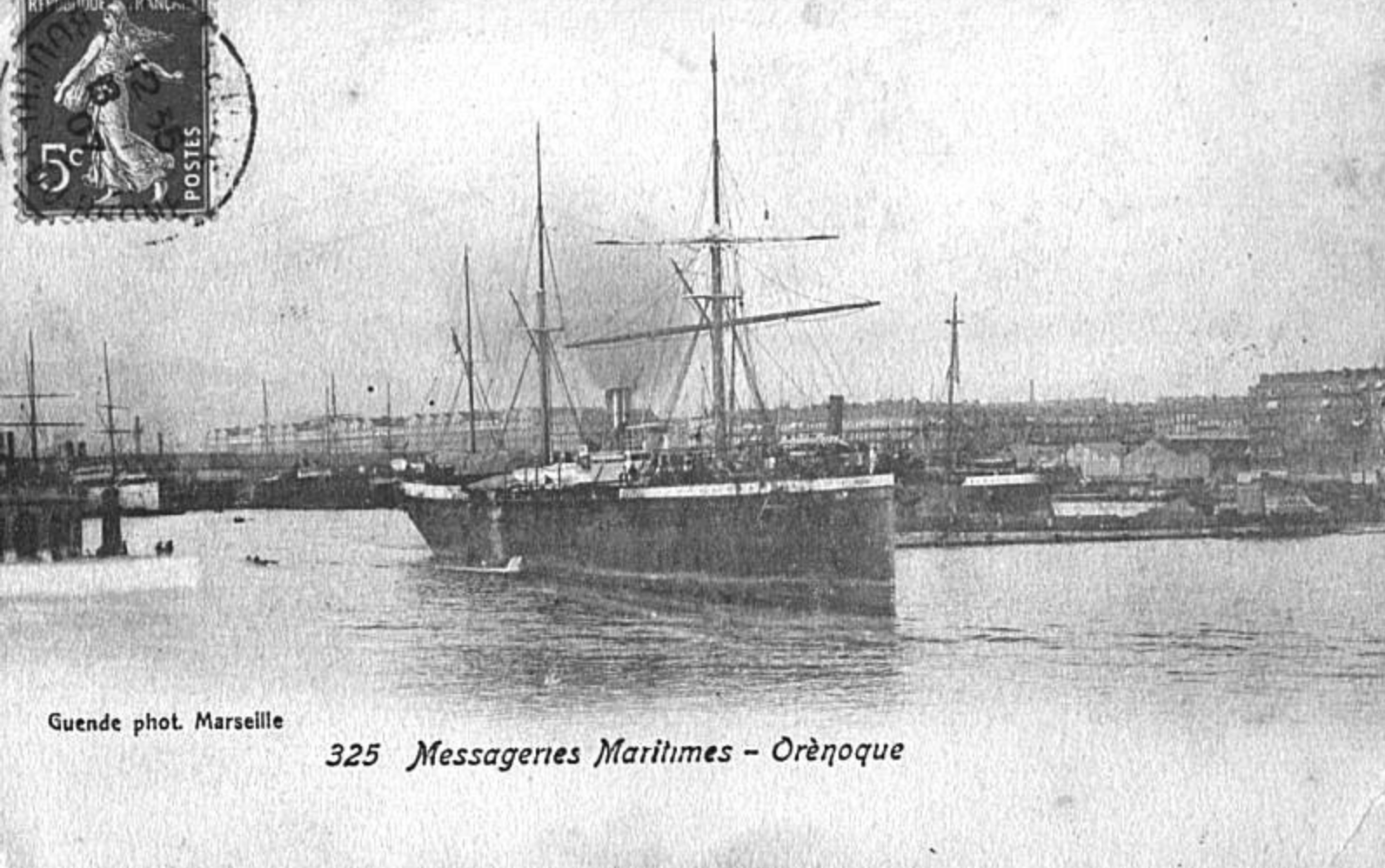
The L'Orénoque arriving at the port of Marseille in a backwards maneuver. L'Encyclopédie des messageries maritimes.
After five days at sea, 'Abdu'l-Bahá arrives in France and is greeted at the port of Marseille by Hippolyte Dreyfus Barney, the first French Bahá’í, French translator of Baháʼí Holy Writings and husband of Laura Clifford Barney, compiler of Some Answered Questions. They remain in Marseille for four days, then travel to Geneva on August 20, 1911, where 'Abdu'l-Bahá spends one day before taking the ferry to Thonon-les-Bains.
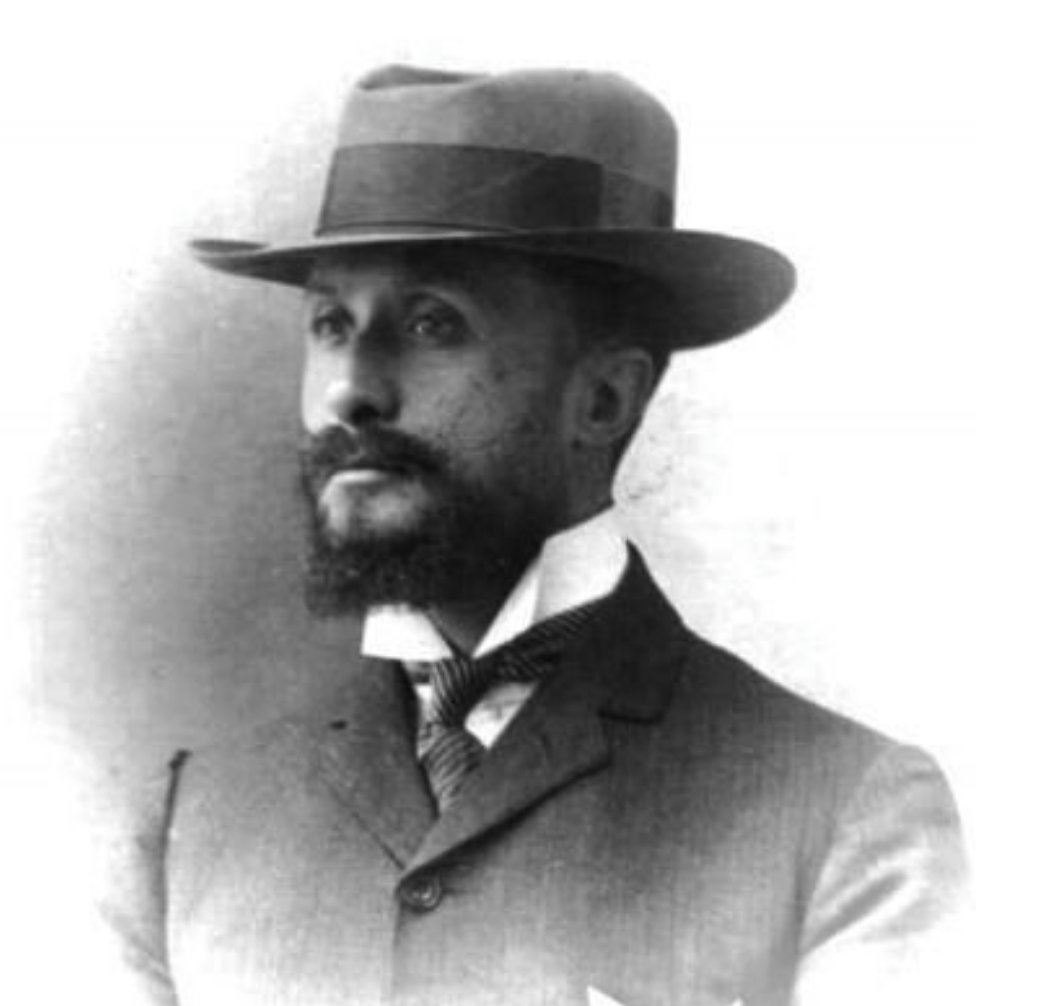
Hippolyte Dreyfus-Barney. Journeys Faith.
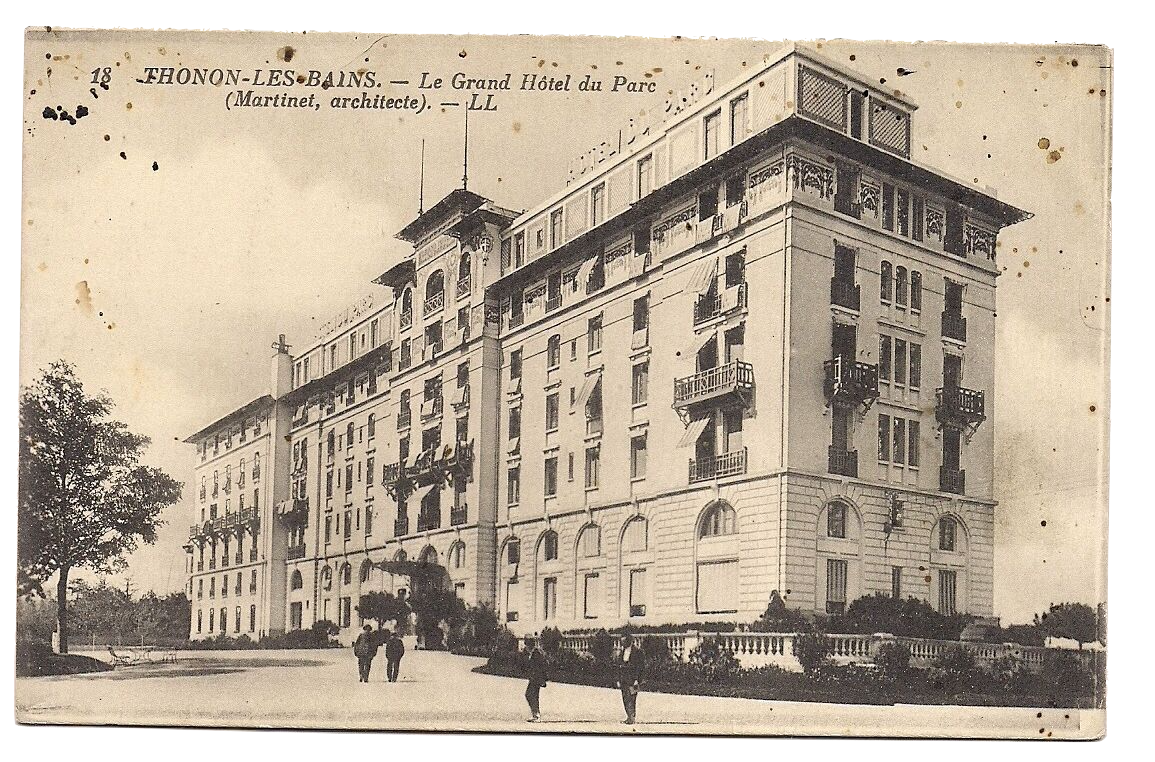
Entrance of the Grand Hôtel du Parc in Thonon-les-Bains where 'Abdu'l-Bahá stayed for nine days.
After a one-day stay in Switzerland, 'Abdu'l-Bahá is back in France, in the charming city of Thonon-les-Bains, staying at the Grand Hôtel du Parc.
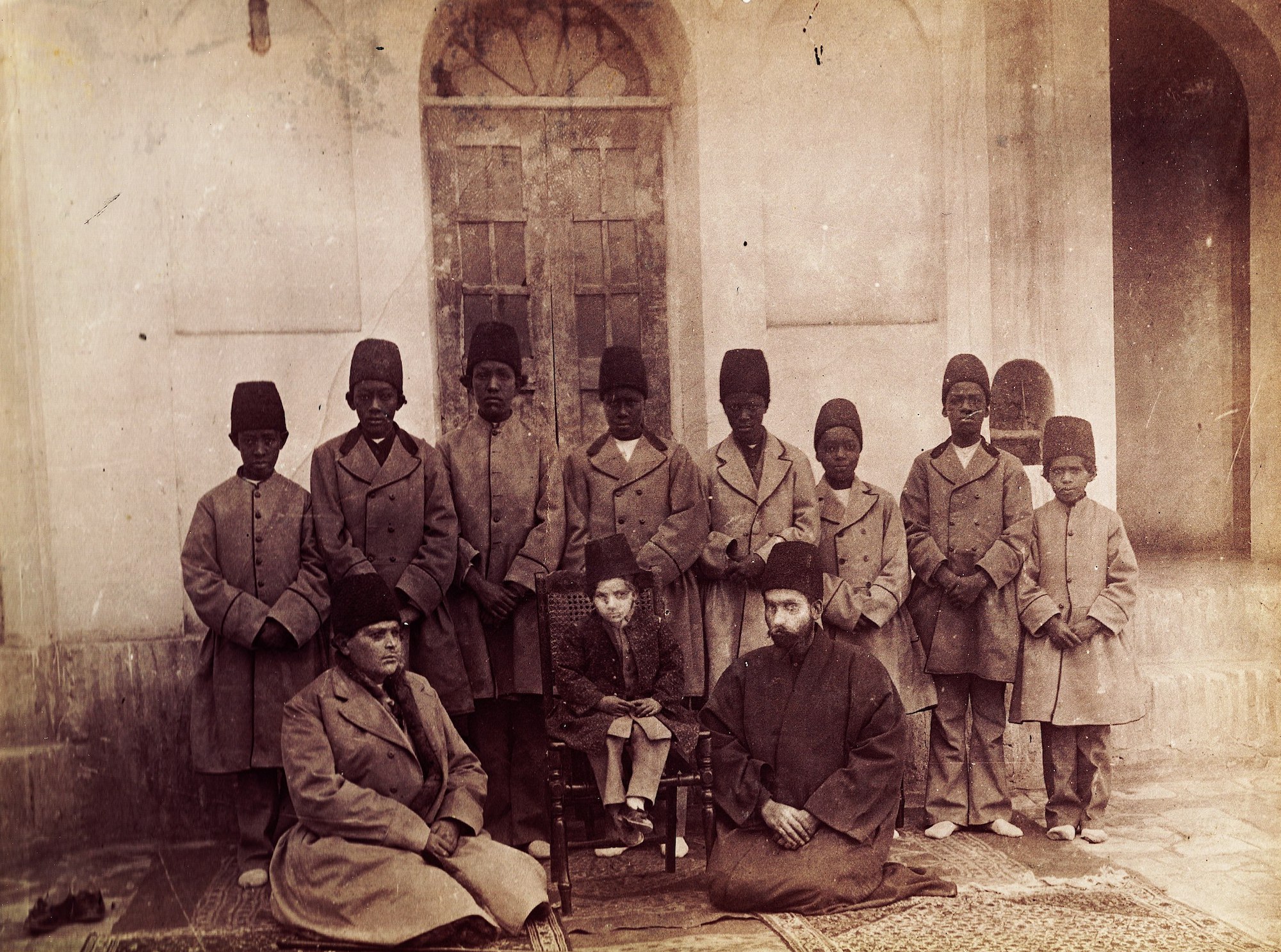
Masʻúd Mírzá, the Ẓillu’s-Sulṭán, eldest son of Náṣiri’d-Dín Sháh with his son Bahrám Mírzá Sardár Masʻúd, sitting on a chair, accompanied by two members of his court (Reza Qoli Khan, private secretary in the right and Aqabaji eunuch chief in the left) sitting on the right and eight African eunuchs, in the 1880s. Photograph: Farhad and Firouzeh Diba Collection of Qajar Photographs. Wikimedia Commons.
On 23 August 1911, A Persian man approaches Hippolyte Dreyfus-Barney. Hippolyte Dreyfus has met this man before, in Persia, he visited him in his tent while the man was on a hunting trip, and the man himself played a dark role in one of the Faith's most tragic episodes of martyrdom.
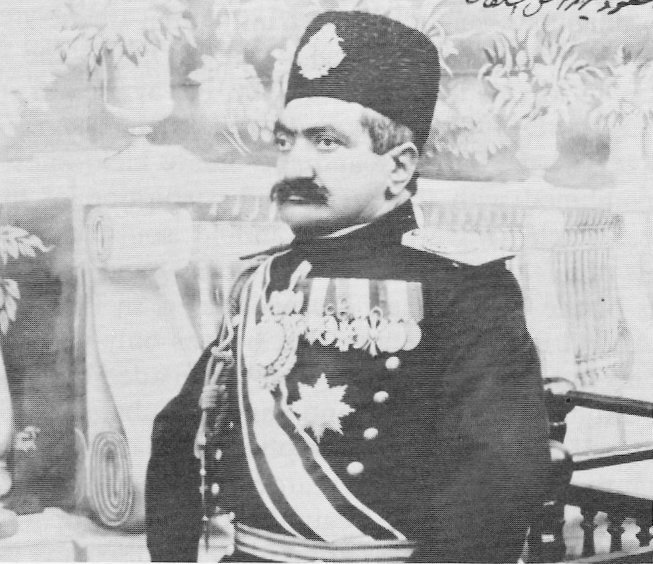
Masʻúd Mírzá, the Ẓillu’s-Sulṭán (Shadow of the King), governor of Iṣfahán. Scanned in from Balyuzi, H.M. (1985). Eminent Bahá'ís in the time of Bahá'u'lláh, page 34. Wikimedia Commons.
In March 1879, when he is Governor of Iṣfahán, Masʻúd Mírzá is faced with pressure to order the execution of two extraordinary Bahá'ís, the King of Martyrs and the Beloved of Martyrs.
The full, complex account is in Taherzadeh's masterful chapter by the same name, but Masʻúd Mírzá's role is complicated. He is pressured by the Sháh, by two wicked members of the Islamic clergy and by úlamás to put the two pure-hearted brothers to death. He meets with them several times and begs them to recant their faith, tries to beat them into submission, but in the end, the death warrant is signed by the clergy who has roused the entire population into a bloodthirsty rage.
Masʻúd Mírzá succumbs to the pressure and eventually orders their execution after trying to get the brothers to recant one last time. They are beheaded on March 17, 1879.

Grand Hôtel du Parc in Thonon-les-Bains where 'Abdu'l-Bahá stayed, the terrace were 'Abdu'l-Bahá is pacing is behind the curved cement wall in the foreground. Image courtesy of Daniel Caillaud.
Thirty-two years, five months and six days later, while visiting the Hôtel du Parc in Thonon-les-Bains, this very same man, Masʻúd Mírzá, sees 'Abud'l-Bahá pacing in the terrace of the hotel. He walks up the few steps from the terrace to the doorway of the covered veranda where Hippolyte Dreyfus is standing and asks him:
Who is that Persian nobleman?
That is 'Abdu'l-Bahá.
Masʻúd Mírzá begs, very humbly:
Take me to Him.
Hippolyte Dreyfus-Barney will confide to Juliet Thompson that he feels the man is a brute, mumbling out miserable excuses to 'Abdu'l-Bahá. But not 'Abdu'l-Bahá. The Master takes Masʻúd Mírzá in His arms and says:
All those things are in the past. Never think of them again.
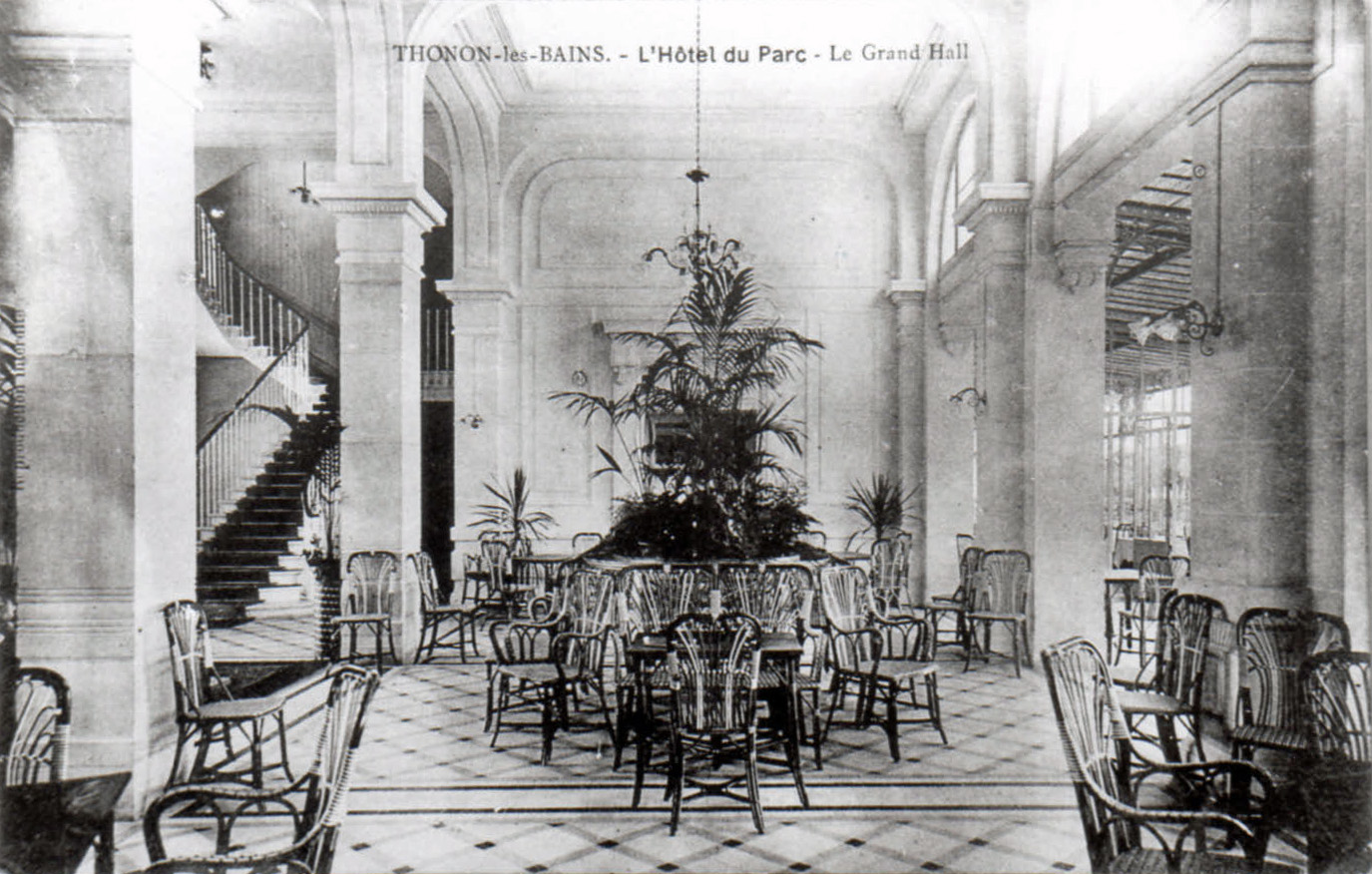
Grand Hôtel du Parc in Thonon-les-Bains, the main hall. Image courtesy of Daniel Caillaud.
Then, 'Abdu'l-Bahá invites Masʻúd Mírzá and his two sons Fírúz Mírzá and Ismá‘íl Mírzá, who had accompanied their father, to spend the day with Him.
Over the course of the following days, Masʻúd Mírzá, the Ẓillu’s-Sulṭán sends two more sons of his to meet 'Abdu'l-Bahá: Bahrám Mírzá and Sulṭán Ḥusayn Mírzá.
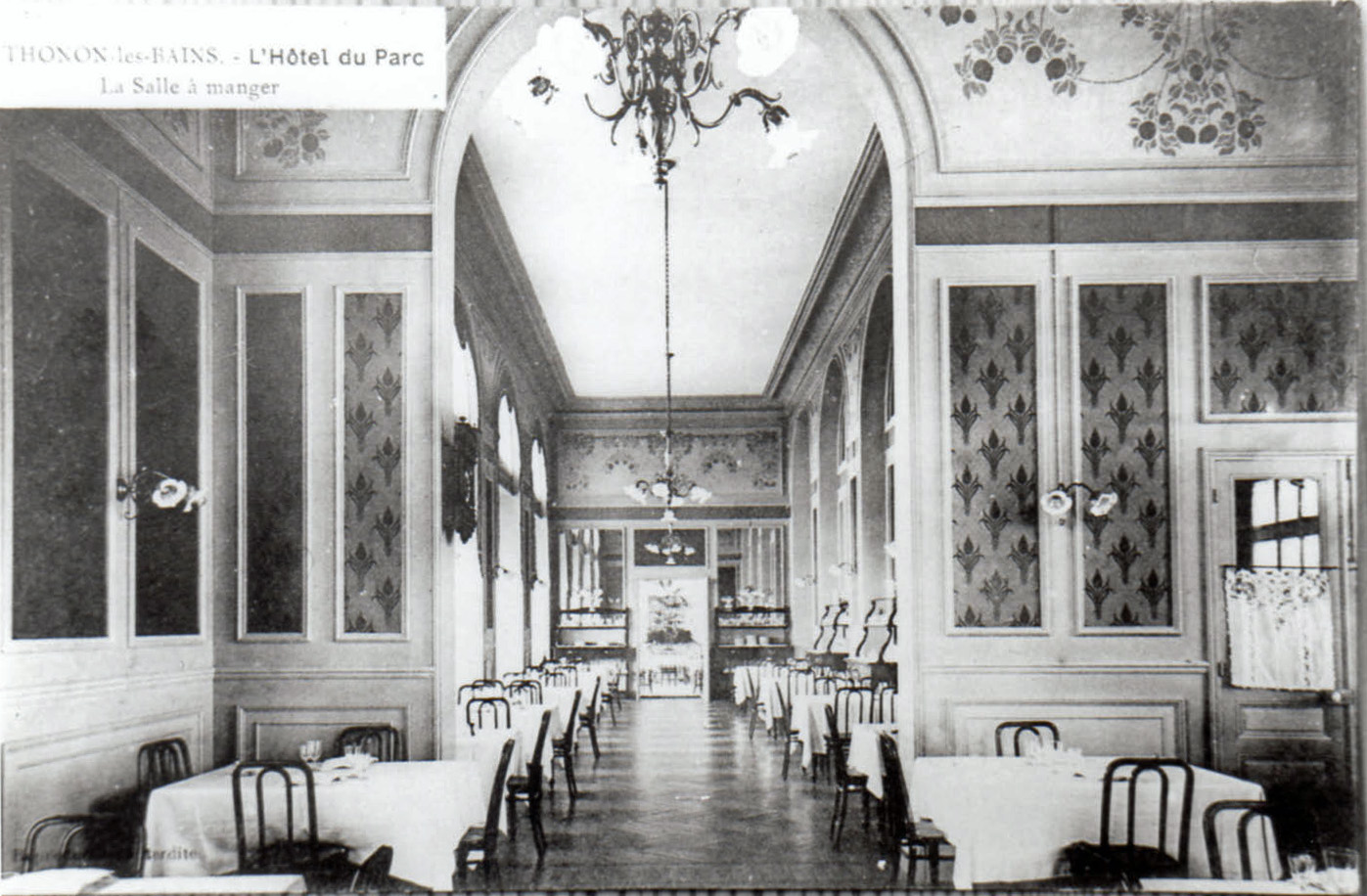
The dining room where 'Abdu'l-Bahá, Juliet Thompson and Hippolyte Dreyfus-Barney are having dinner on August 24, 1911 at the Grand Hôtel du Parc in Thonon-les-Bains. The columns 'Abdu'l-Bahá points to in His stirring speech can be seen at the base of the three arches on either side of the narrow part of the dining room in the background of the photograph. Postcard photograph courtesy of Daniel Caillaud.
At dinner on Thursday, August 24, 1911, 'Abdu'l-Bahá has a powerful conversation with Juliet Thompson and Hippolyte Dreyfus about Unity in the West and the suffering of Bahá'u'lláh in the Siyáh-Chál in Persia:
'Abdu'l-Bahá: Did you ever expect, Juliet, to be in Thonon with Me in such a gathering?
Juliet Thompson: No indeed I did not! May we all be in just such a gathering with You in New York!
'Abdu'l-Bahá: I have made a pact with the American friends. If they keep the pact I will come.
Juliet Thompson: The believers are much better friends than they were.
'Abdu'l-Bahá: I shall have to know that! Bahá'u'lláh," the Master continued, "was bound with a chain no longer than the distance from here to that post." With a sudden terrific agitation He rose and pointed to a column close to the table. "He could scarcely move. Then He was exiled to Baghdád, to Adrianople, to Constantinople, to 'Akká--four times! He bore all these hardships that unity might be established among you. But if, among themselves, the believers cannot unite, how can they hope to unite the world? Christ said to His disciples: 'Ye are the salt of the earth, but if the salt has lost its savour, wherewith shall it be salted?'
Hippolyte Dreyfus-Barney: It is not Juliet's fault.
'Abdu'l-Bahá: No, it is not Juliet's fault. If every one of the believers was like Juliet there would have been no trouble," said the Master--mercifully.
Juliet Thompson: If I had done my whole duty I might have accomplished more toward unity.
'Abdu'l-Bahá: I hope you will become perfect. Inshá'lláh, through the help of Bahá'u'lláh, you will be perfect. When you return to America, Juliet, I want you to do your best to bring about unity.
Juliet Thompson: I will do my utmost to carry out every suggestion you make to me, my Lord. I will work, not alone for the sake of the believers, but for the sake of others who would follow You if they could see You.
'Abdu'l-Bahá: Had it not been for these divisions, the Cause would have made great progress by now in America.
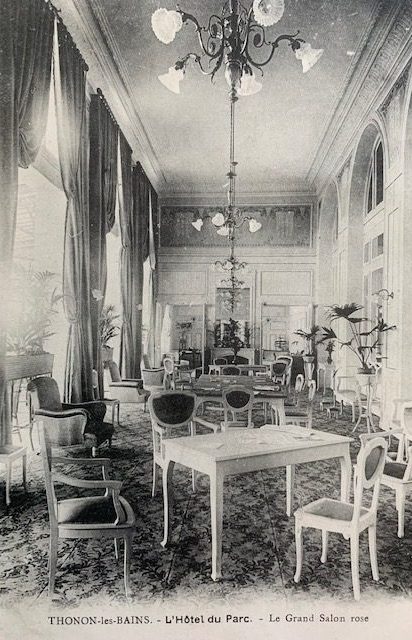
The Pink Salon in the Hôtel du Parc in Thonon-les-Bains where 'Abdu'l-Bahá had tea with the Prince after lunch on August 25, 1911. Image courtesy of Daniel Caillaud.
Masʻúd Mírzá, the Ẓillu’s-Sulṭán and his family have been voluntary exiles in Geneva since 1908 and 'Abdu'l-Bahá is finally free, traveling through Europe. On August 25, 1911, Prince Bahrám, one of Masʻúd Mírzá's sons, joins 'Abdu'l-Bahá for lunch in Thonon-les-Bains. The 26-year-old youth looks to Juliet Thompson like a Persian miniature with his ivory skin and fine features. He stomps out of the dining room ahead of the women but 'Abdu'l-Bahá later says "Bahrám Mírzá bad níst," (Prince Bahrám is not bad).
After lunch, 'Abdu'l-Bahá returns to "Le Grand Salon rose" (the big pink salon) and has coffee with Prince Bahrám on His right and Juliet Thompson on His left. At three o'clock in the afternoon, the Prince leaves.
This story of kindness on the part of 'Abdu'l-Bahá, in the face of the most grievous of wrongs, is the story of Thonon-les-Bains. 'Abdu'l-Bahá's very first significant stop on His Journeys to the West, in a seemingly tranquil little lake-side town is the theater of a spiritual story of immense significance, and possibly one of the most important events in His Journeys to the West.
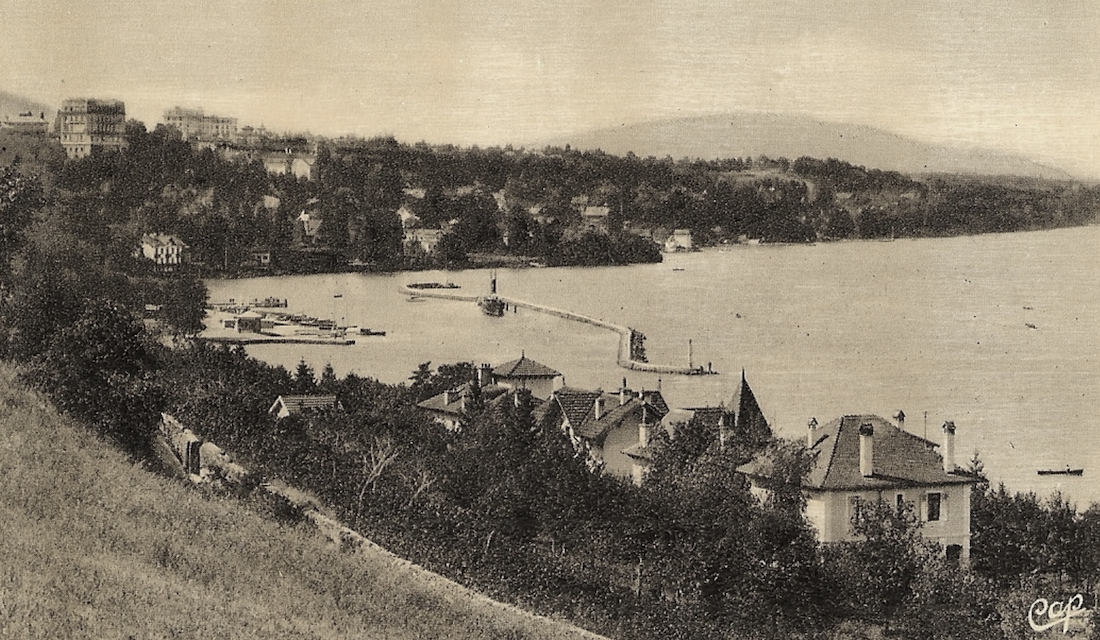
Thonon-les-Bains and the shores of Lake Geneva, which the Egyptian journalist was visiting when he stumbled upon 'Abdu'l-Bahá giving a marvelous talk. Postcard from Geneanet.
This is the fascinating story of 'Abdu'l-Bahá very first address in the West published in a foreign newspaper. And the reason it was published in the Egyptian newspaper of Al-Ahram, is a happy accident: the journalist stumbled upon 'Abdu'l-Bahá's talk by accident and decided to write about it.
On 28 August 1911, an Egyptian journalist is visiting Lake Geneva, and just happens to be in Thonon-les-Bains that evening. He arrives at the Hôtel du Parc, on the shore of the lake, and encounters a very unusual scene. The way he describes 'Abdu'l-Bahá's talk as a complete outsider who just chanced on this talk by complete coincidence is absolutely priceless, and we have this translation in English from the Al-Ahram article in Arabic of 16 September 1911 courtesy of Gamal Hassan:
I entered its Hôtel du Parc just to come by a huge gathering of various races on a long table, some of them are Persians of white turbans, others with black hats, and a company of citizens of various origins from France, England, America, and Italy, who were assembled in a very organized manner, in a state of absolute silence and reverence, and in perfect fellowship and friendliness. In their forefront there was a man of the seventh decade of life, white-haired, of middle height, dressed in a white attire, who was speaking to this audience very slowly and in Arabic, while the secretaries were recording, and interpreters translating into a number of widely spoken European languages. The audience were listening with attentive ears, comprehending hearts, and widely open eyes, as he said:
(The full text of the 11-paragraph talk-as opposed to the four paragraph abridged version in Star of the West below) is available here.)
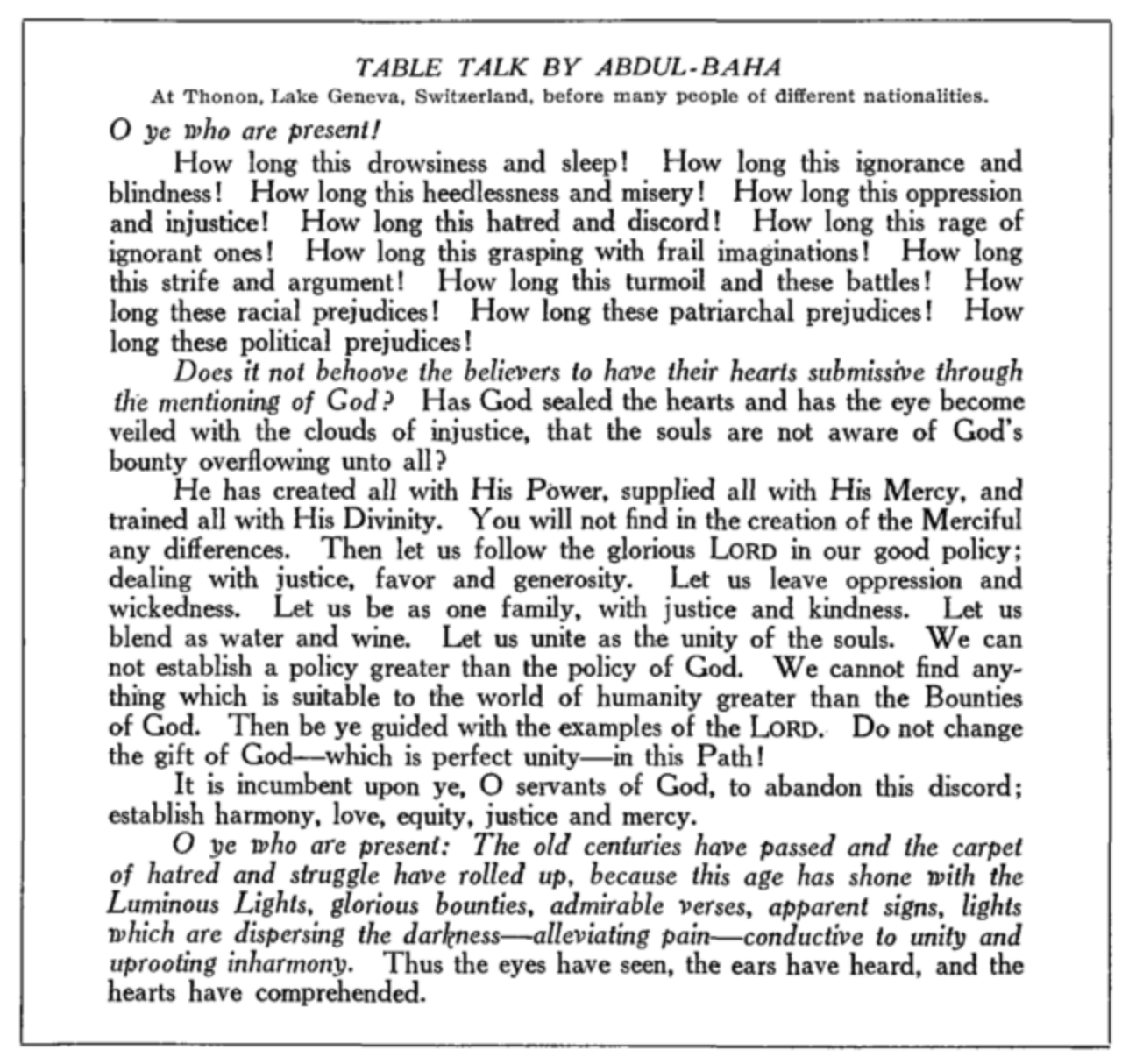
Abridged version of the same talk from Star of the West, Volume V, number 10 (8 September 1914), page 154.
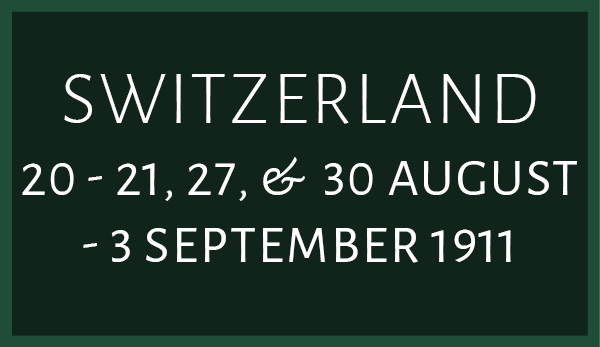

Aerial panorama of Lake Geneva (called Lac Léman in French) showing both the French and Swiss towns around the Lake. Geneva is on the bottom right and left sides of the card, Tonon is indicated straight above geneva on the outcropping of land into the lake, and Vevey is across the lake from Thonon. On this postcard, Geneva, Thonon-les-Bain and Vevey are almost in a straight line. Postcard from Daniel Foucher's personal collection. See the map below for 'Abdu'l-Bahá's ferry journeys on Lake Geneva.
This section of ‘Abdu'l-Bahá's Journeys to the West requires a very small parenthesis. The area where 'Abdu'l-Bahá travels to after arriving in Marseille, is the area bordering Lake Geneva (or Lac Léman, in French), and is an stunning corner of the planet. The Guardian will often come and seek solace in this country, though not in the same region. The postcard above gives a beautiful and contemporary view of many of the water-towns around the lake. 'Abdu'l-Bahá visited Vevey and Lausanne. All these towns with fresh spring water, clean air, lake views and mountain vistas are close to one another by ferry, which explains why 'Abdu'l-Bahá did so many day trips between Switzerland and France. A distance map is below.
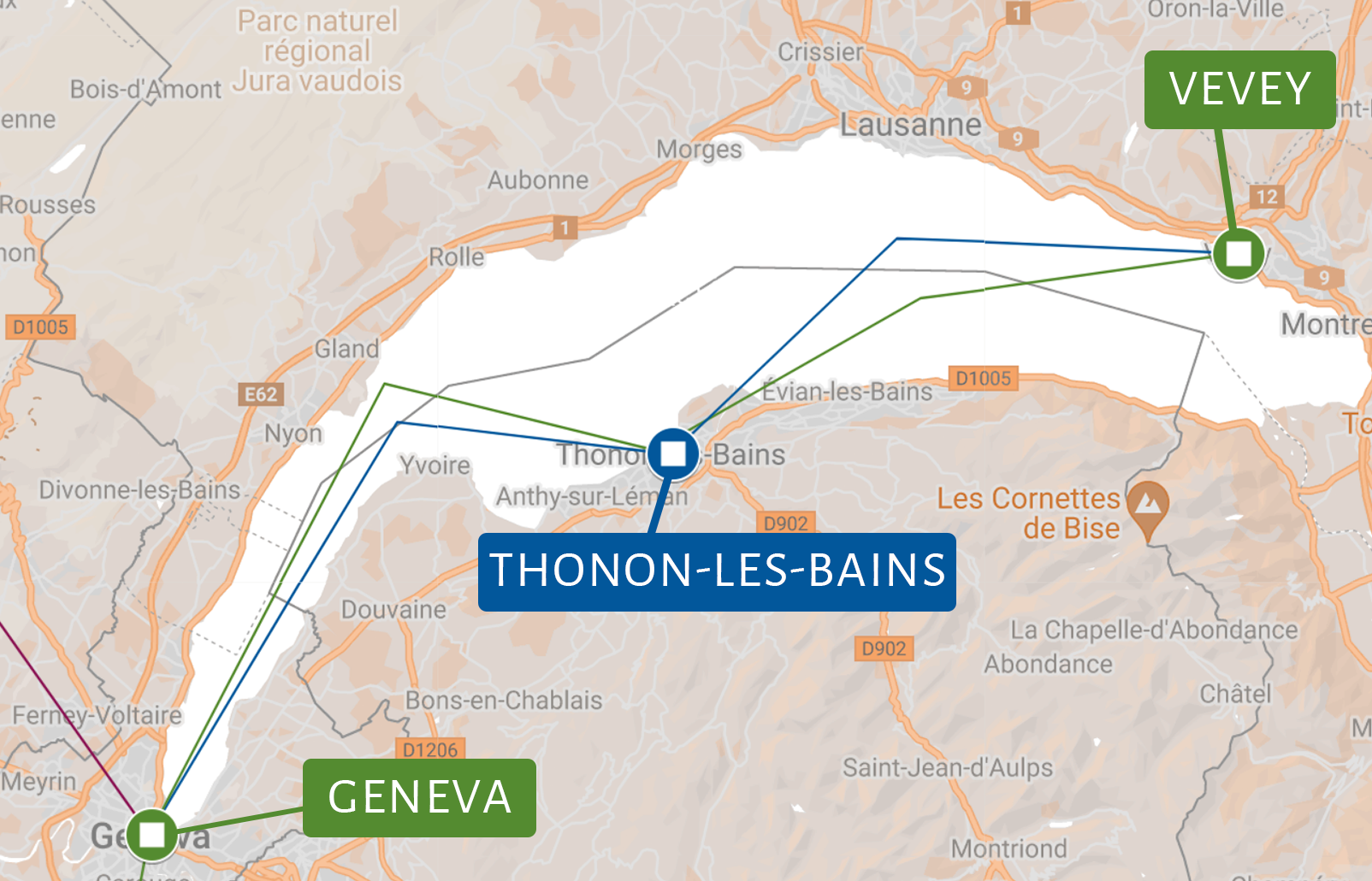
Still of the Map of 'Abdu'l-Bahá's journeys to the West, showing the four cities He visited around Lake Geneva, green are Swiss and the blue dot is French, Starting from the bottom left: Geneva, Lausanne, Vevey and right in the center, Thonon-les-Bains in France. The approximate distance is around 32.7 km is an estimate, as are all the journey lines in Parts V, VI, and VII.
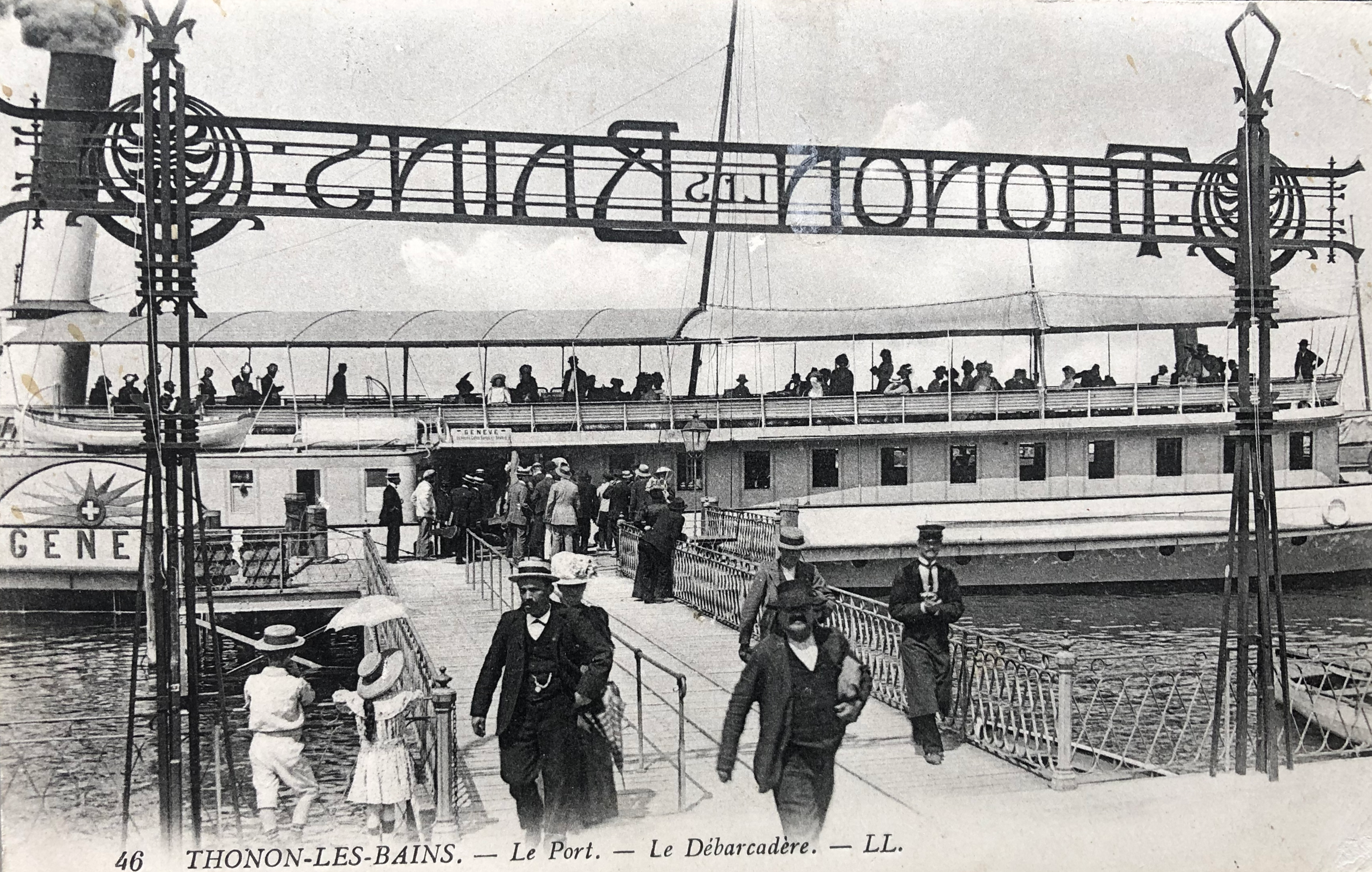
The wrought-iron Art Nouveau sign at the Thonon-les-Bains pier on Lake Geneva, from the tile of 'Abdu'l-Bahá. This is where 'Abdu'l-Bahá boards the ferry that takes Him to Vevey for a day trip. Postcard from Daniel Foucher's personal collection.
Juliet Thompson, that immortal writer, describes a ferry ride she took alone from Vevey as only a painter could and gives us a three-dimensional view of what 'Abdu'l-Bahá might have seen on the four ferry rides He took in the two weeks He remained on Lake Geneva:
I sailed from Vevey today down the Lake of Geneva. There was a heavy mist and the mountains loomed like phantoms through it. The lake, full of swans and white sails, gleamed. The Swiss shore was veiled to a tender green, its chalets and villages blurred like etchings on blotting paper.
The Diary of Juliet Thompson, Chapter 3
'Abdu'l-Bahá has planned a day-trip to Vevey, for Sunday, August 27, 1911, and on Saturday evening, Hippolyte Dreyfus-Barney tells Juliet Thompson to that he will wake her at 7 in the morning after he has woken 'Abdu'l-Bahá. At 6 in the morning on Sunday, 'Abdu'l-Bahá knocks on Juliet Thompson's door in the Hôtel du Parc in Thonon-les-Bains, and those of His companions and says, in English:
I want to go!
Juliet even hears 'Abdu'l-Bahá teasingly call "Mademoiselle!" at Tamaddunu'l-Mulk's door, because his interpreter had recently taken to wearing corsets to improve his posture. The party of 9 is brought down the hill to the dock in a big wagon. The dock is shaded by a dense grove of trees, and beneath these a bank of white lilies and a bench. When Laura Dreyfus-Barney and Juliet Thompson look out, they see 'Abdu'l-Bahá pacing on that bench, then turns inland and walks among the trees. But they lose sight of Him again and find Him back on the gangplank and they follow 'Abdu'l-Bahá onto the boat. Little children raise their eyes to His face and He tenderly caresses their heads.
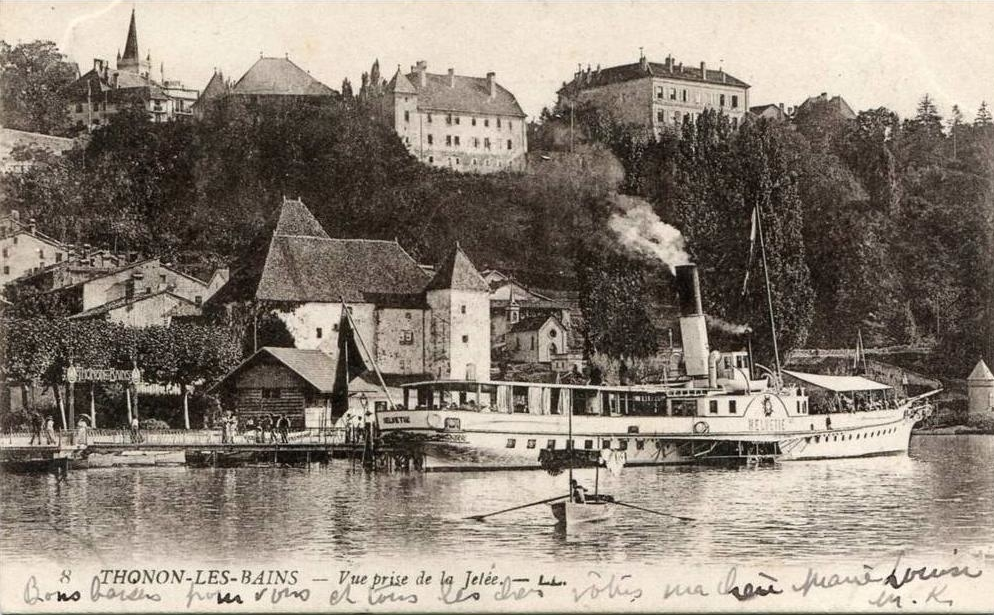
Thonon-les-Bains, view from the pier. You can see a steamer ferry, again, very similar to the one 'Abdu'l-Bahá would have taken. If you look very closely, on the bottom-left of the photograph, you will see the wrought-iron-side from the front, so you can read it says "Thonon-les-Bains" in beautiful Art Deco letters. That wrought-iron sign is still standing today in exactly the same place, but the trees have grown considerably. Postcard from Geneanet.
On the boat, 'Abdu'l-Bahá suddenly smiles and turns to Juliet:
You never dreamed, Juliet, that you would be with Me in a boat.
I have often dreamed that I was with You in a boat!
But you never thought it would be fulfilled in this way!
No, I never did. I couldn't have imagined this!
The Lake of Geneva seems like the Sea of Galilee to Juliet Thompson and 'Abdu'l-Bahá sits with His bronze 'abá around Him, His hands hidden in its sleeves, and He is majestic against the backdrop of the misty Alps. It is in this setting that 'Abdu'l-Bahá speaks vastly important words on the power of the Covenant for individual believers:
Others are passing from an immortal to a mortal kingdom, but the Bahá'ís are journeying, in the Ark of the Covenant, from a mortal to an immortal world. The Jews once turned to the Kingdom, but when they looked backward to mortal things, they became dispersed. Then Christ led men to the Kingdom; their signs have remained. God be praised that now you are on a Ship bearing you to immortal worlds. Day by day your signs will become clearer.
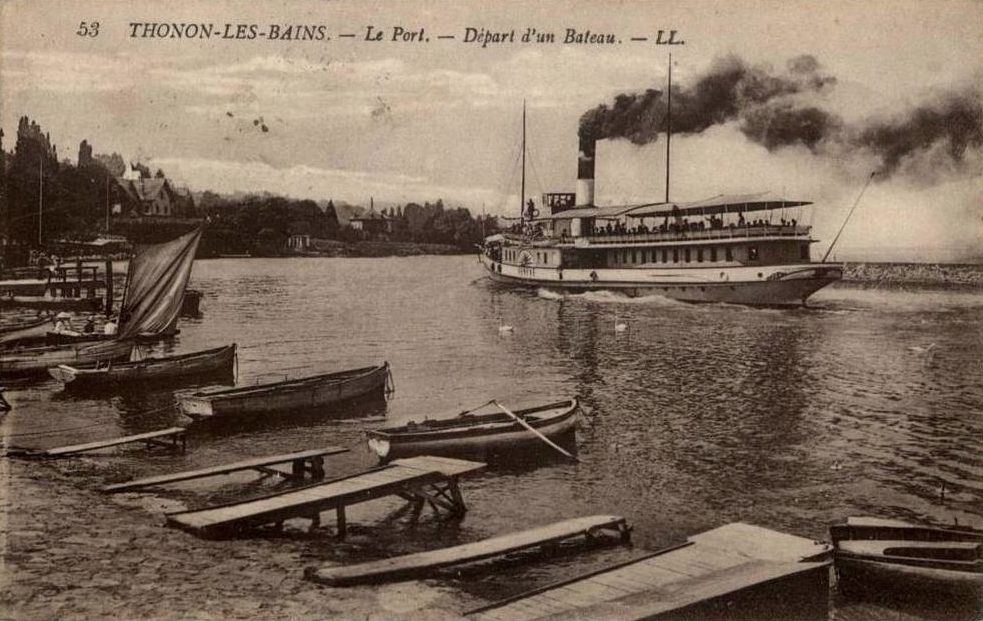
Steamer ferry departing the pier at Thonon-les-Bains across Lake Geneva. This is very much the same boat 'Abdu'l-Bahá is on when this story takes place. Postcard from Geneanet.
The Lake of Geneva seems like the Sea of Galilee to Juliet Thompson and 'Abdu'l-Bahá sits with His bronze 'abá around Him, His hands hidden in its sleeves, and He is majestic against the backdrop of the misty Alps.
It is in this setting that 'Abdu'l-Bahá speaks vastly important words on the power of the Covenant for individual believers:
Others are passing from an immortal to a mortal kingdom, but the Bahá'ís are journeying, in the Ark of the Covenant, from a mortal to an immortal world. The Jews once turned to the Kingdom, but when they looked backward to mortal things, they became dispersed. Then Christ led men to the Kingdom; their signs have remained. God be praised that now you are on a Ship bearing you to immortal worlds. Day by day your signs will become clearer.
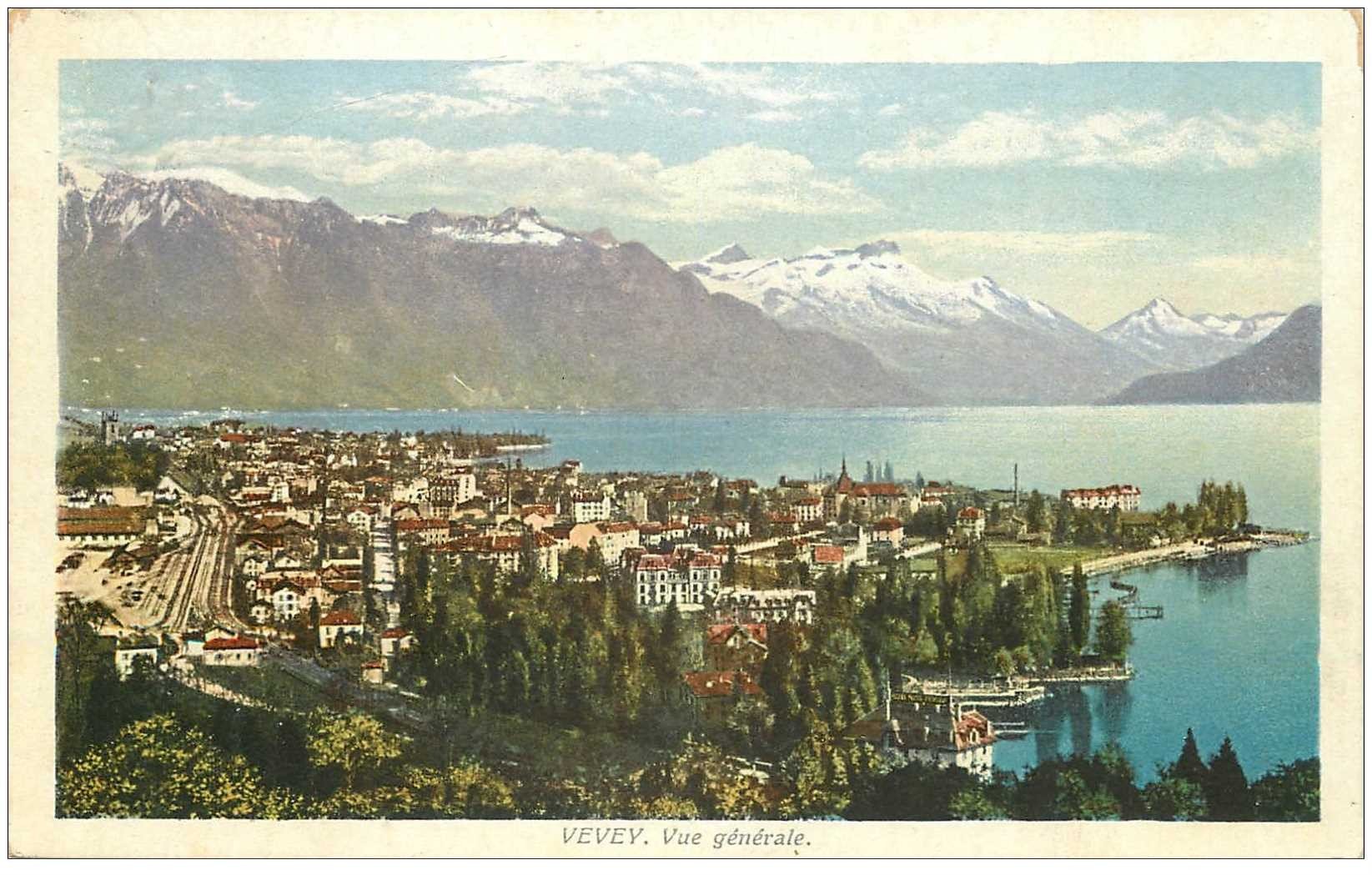 When they arrive at Vevey, Edith Sanderson, Mrs. Sanderson's daughter, takes them to the room her mother has reserved for 'Abdu'l-Bahá at the hotel. Mrs, Sanderson, though not attracted to the Bahá'í Faith, cannot take her eyes of the face of 'Abdu'l-Bahá, whispering to Juliet "His beautiful face!"
When they arrive at Vevey, Edith Sanderson, Mrs. Sanderson's daughter, takes them to the room her mother has reserved for 'Abdu'l-Bahá at the hotel. Mrs, Sanderson, though not attracted to the Bahá'í Faith, cannot take her eyes of the face of 'Abdu'l-Bahá, whispering to Juliet "His beautiful face!"
The conversation between the Sandersons, their friends and 'Abdu'l-Bahá is about immortality, but two important things come out of the visit in Switzerland, on top of 'Abdu'l-Bahá's statement on the ferry ride. This next moment during the Vevey visit is something to keep in mind for the remainder of 'Abdu'l-Bahá's Journeys to America: His words had tremendous impact despite the fact they were interpreted. Edith Sanderson, who understands Persian, makes an astute comment to Juliet Thompson about the poor quality of the English interpretation of 'Abdu'l-Bahá's words:
You cannot imagine, how ruinous the translation is. The Master puts life into every word. Translated, the words sound flat. Besides, the Persian is so rich and He has a way of saying the same thing over differently, in various poetic forms and with subtle shades of meaning. In the translation it is all alike.
Every moment with 'Abdu'l-Bahá in the West is a teaching moment. His reactions and His feelings cannot be predicted, even by those seemingly closest to Him. He is here to set a new standard and break with the old and this next moment shows this very clearly.
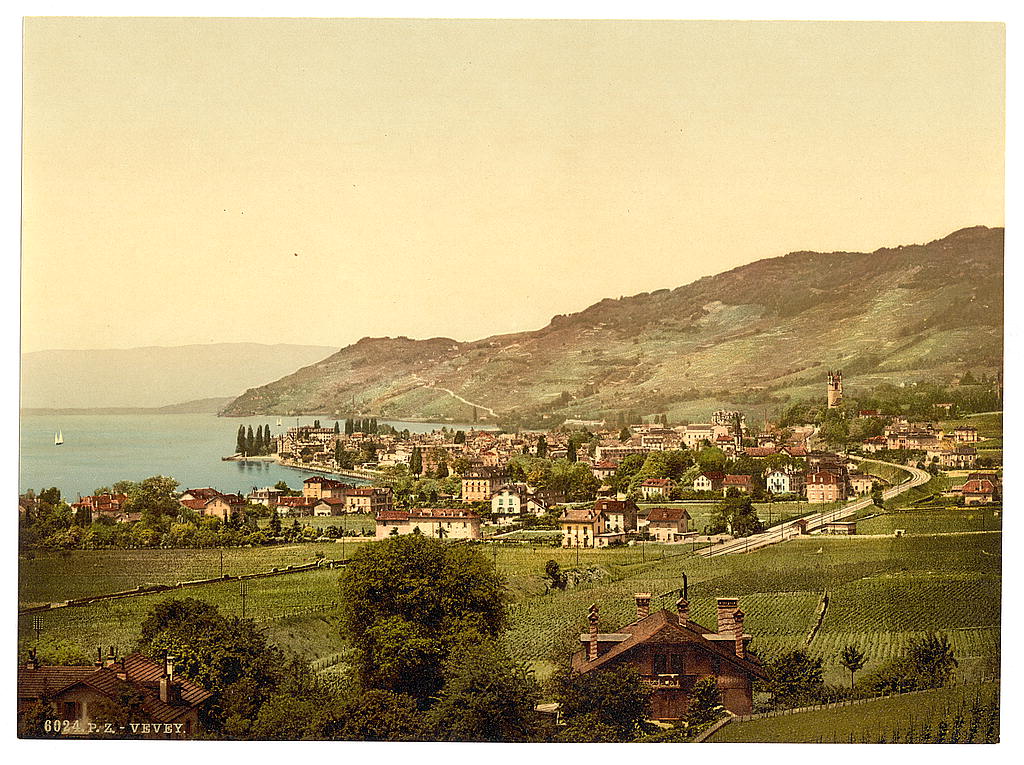
Vevey, general view of the town and Lake Geneva. Source: Library of Congress.
As lunch is announced, two of the Sanderson's companions take their leave. Miss Hopkins says goodby to 'Abdu'l-Bahá who tells her:
I will pray for you.
Miss Hopkins then replies:
And I will pray for you too.
Juliet Thompson is shocked, and Mrs. Sanderson is outraged. To them both, 'Abdu'l-Bahá says:
No, do not feel that way. It came from the heart; therefore it was beautiful.
Once lunch is over, 'Abdu'l-Bahá retires to His room to rest, after stopping in the hall of the hotel for a moment to greet an old French Lady, Mrs. Naber. As Juliet slips into the garden through a side door, she overhears something very sweet, a candid conversation between Mrs. Naber and Mrs Sanderson sitting on a stone bench, their white heads close together, speaking about 'Abdu'l-Bahá. Mrs Naber says:
He has such a good, such a simple bearing.
To which Mrs. Sanderson replies:
Yes, and eyes of fire !
It is important at some point in this survey of 'Abdu'l-Bahá's Journeys to the West to hear testimony of people who encountered Him who won't become Bahá'ís, to see how regular people, who won't join ranks with enkindled believers and devote their lives in service to the Cause, nonetheless saw the Master, and were touched by Him.
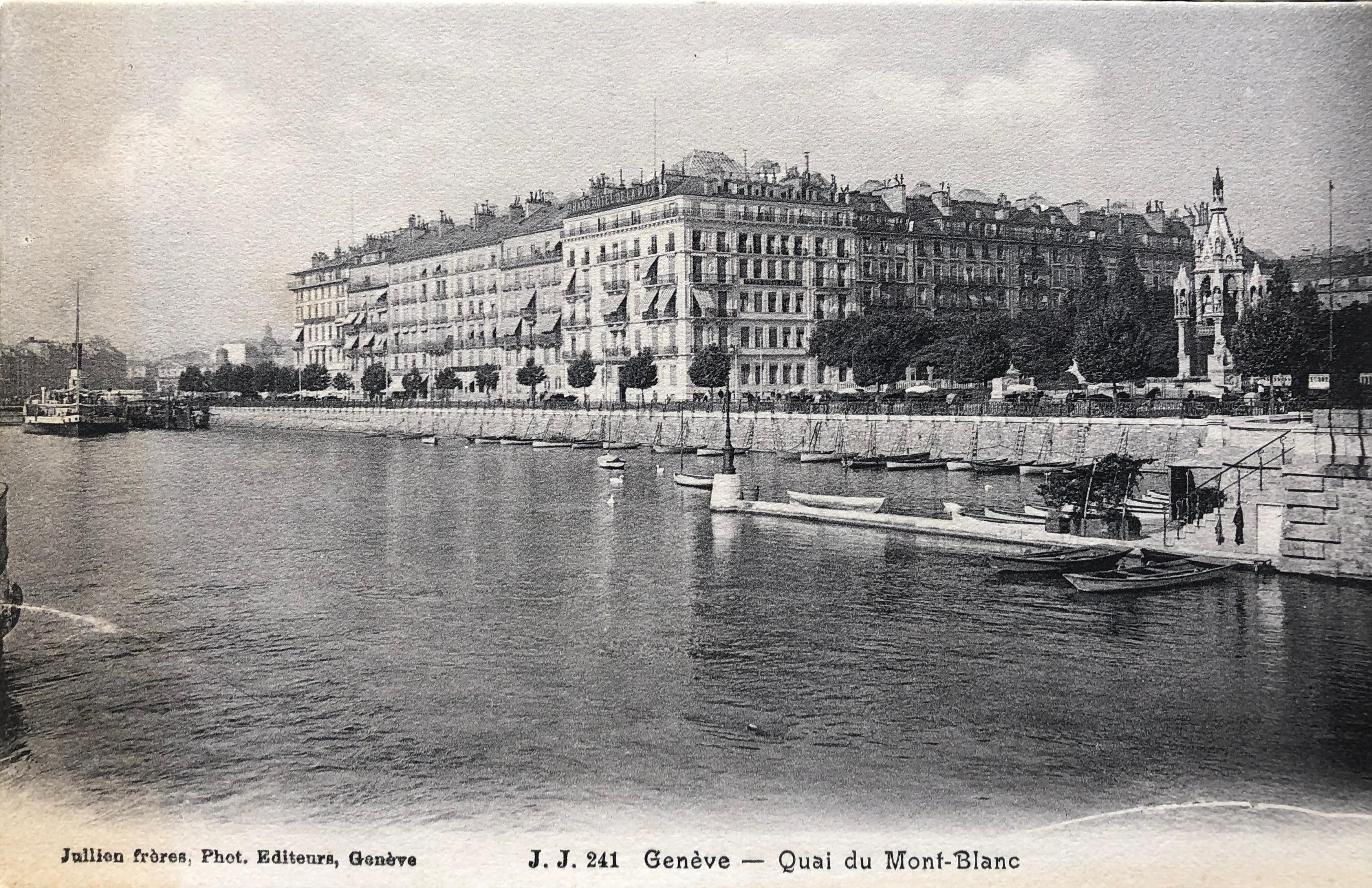
The Hôtel de la Paix in Geneva, on the shore of Lake Geneva, where 'Abdu'l-Bahá stayed four nights before journeying directly to London. Postcard from Daniel Foucher's personal collection.
'Abdu'l-Bahá stays four nights in the Hôtel de la Paix in Geneva starting August 30 and departs on the morning of September 3 on His journey to London, going through Paris without stopping.
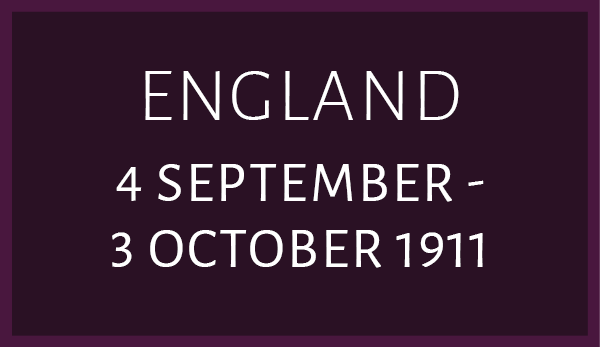
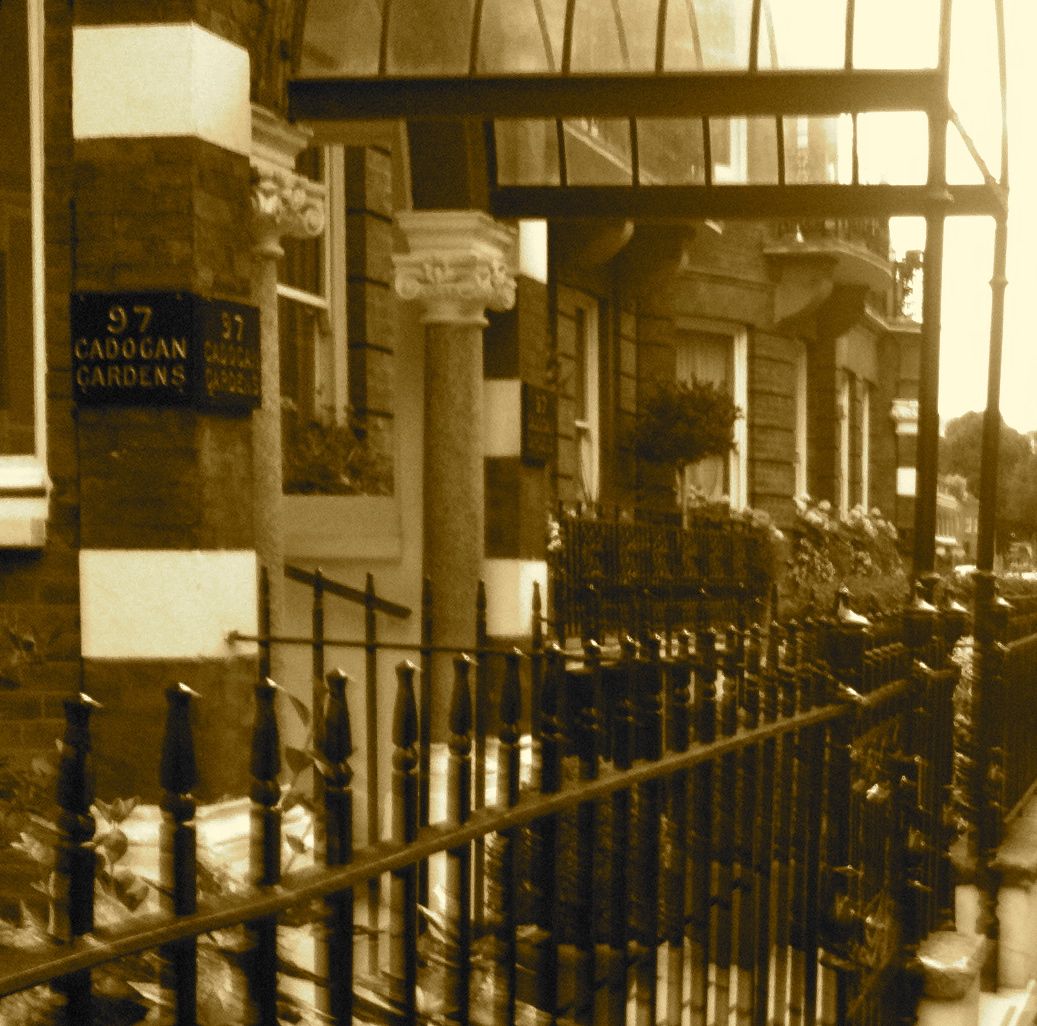
Modern view of 97, Cadogan Gardens (source)
During 'Abdu'l-Bahá first sojourn in London, Lady Blomfield places her house at 97, Cadogan Gardens, at His entire disposal. The home becomes a veritable mecca to every sort of person imaginable, who crowd to visit the Prisoner of 'Akká. The sound of their footsteps fills the house, they come from every country in the world, an endless stream of politicians, ministers and missionaries, journalists, healers, oriental scholars, students of the occult, and mystics, Catholics, Non-conformists, Theosophists, Hindus, Christian Scientists, Muslims, Zoroastrians and Buddhists. They keep coming, Salvation Army soldiers, women suffragists, social workers, dressmakers and great ladies, artisans and artists, writers and poets, unemployed people and prosperous businessmen, no one is above or below 'Abdu'l-Bahá's loving attention.
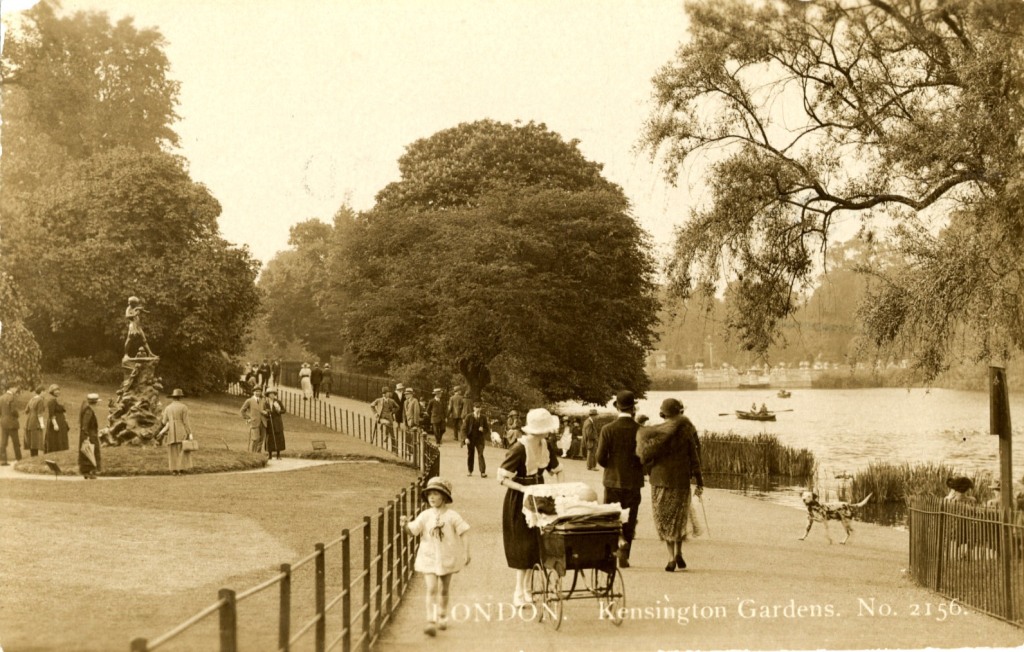
Kensington Gardens, one of a few parks and gardens 'Abdu'l-Bahá visited while in London. (source)
'Abdu'l-Bahá awakes at 5 in the morning and writes or dictates Tablets for a few hours. He receives visitors early in the morning, individually, or by twos or threes. Around 9, He enters the dining room and greets the friends who are eating breakfast. ‘Abdu’l-Bahá eats so little the friends are concerned, and at their insistence, ‘Abdu’l-Bahá consents to eat a little soup in the mornings.
Following breakfast, the Master retires to His room, where He chants prayers and resumes dictating Tablets in reply to the incessant flow of incoming mail. Around 10, the visitors have gradually filled the drawing room and ‘Abdu’l-Bahá enters, pausing in the doorway to smile at them, then makes His way to His usual chair. the Master proceeds to speak with the friends, not to them, replying to unspoken questions into a beautiful address. After lunch, 'Abdu'l-Bahá rests briefly, then usually drives out either to a park or to visit friends.
And 'Abdu'l-Bahá ends nearly every day with gatherings in the evening where He addresses those present. But 'Abdu'l-Bahá prays and meditates very late into the night, once He has retired from company.
10 September 1911 - 'Abdu'l-Bahá speaks in front of a public audience for the first time in His life
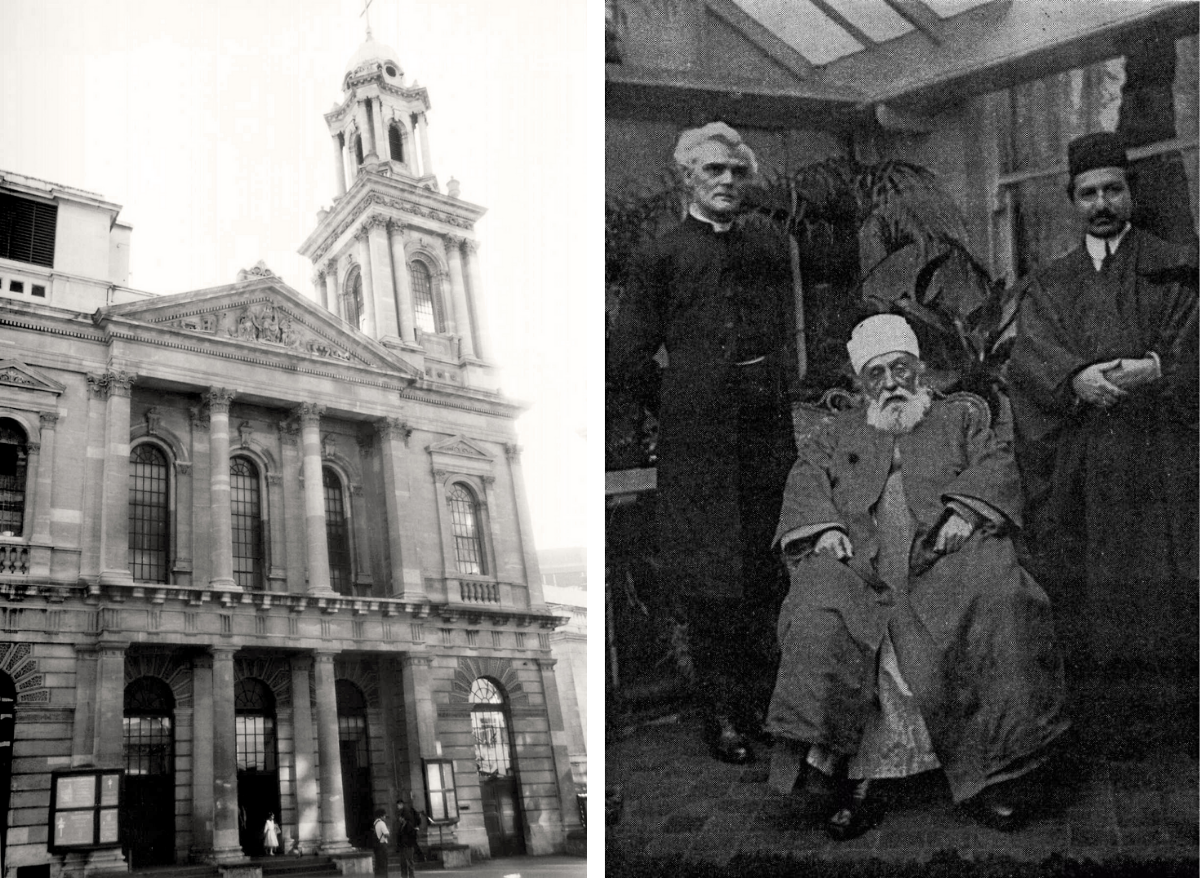
Left: The City Temple, London, where 'Abdu'l-Baha gave His first ever public talk on 10 September 1911. Bahá’í World News Service. Right: 'Abdu'l-Bahá and the Reverend Reginald John Campbell in September 1911. Published in The Christian Commonwealth on 13 September 1911 on pg 24. Wikimedia Commons.
Who else but 'Abu'l-Bahá? Who else but the Master, the Mystery of God, could have lived exclusively in Persia and the Ottoman Empire, never have attended a school, been an exile since childhood and a prisoner for forty years, then, at the age of 67 years old, speak fluently, eloquently, powerfully, but for the first time in His life to a public audience of two thousand almost all Westerners?
When 'Abdu'l-Bahá arrives at the City Temple in Holborn Circus, He writes the following marvelous words in the pulpit Bible (destroyed in 1941 during the bombing):
This book is the Holy Book of God, of celestial Inspiration. It is the Bible of Salvation, the Noble Gospel. It is the mystery of the Kingdom and its light. It is the Divine Bounty, the sign of the guidance of God.
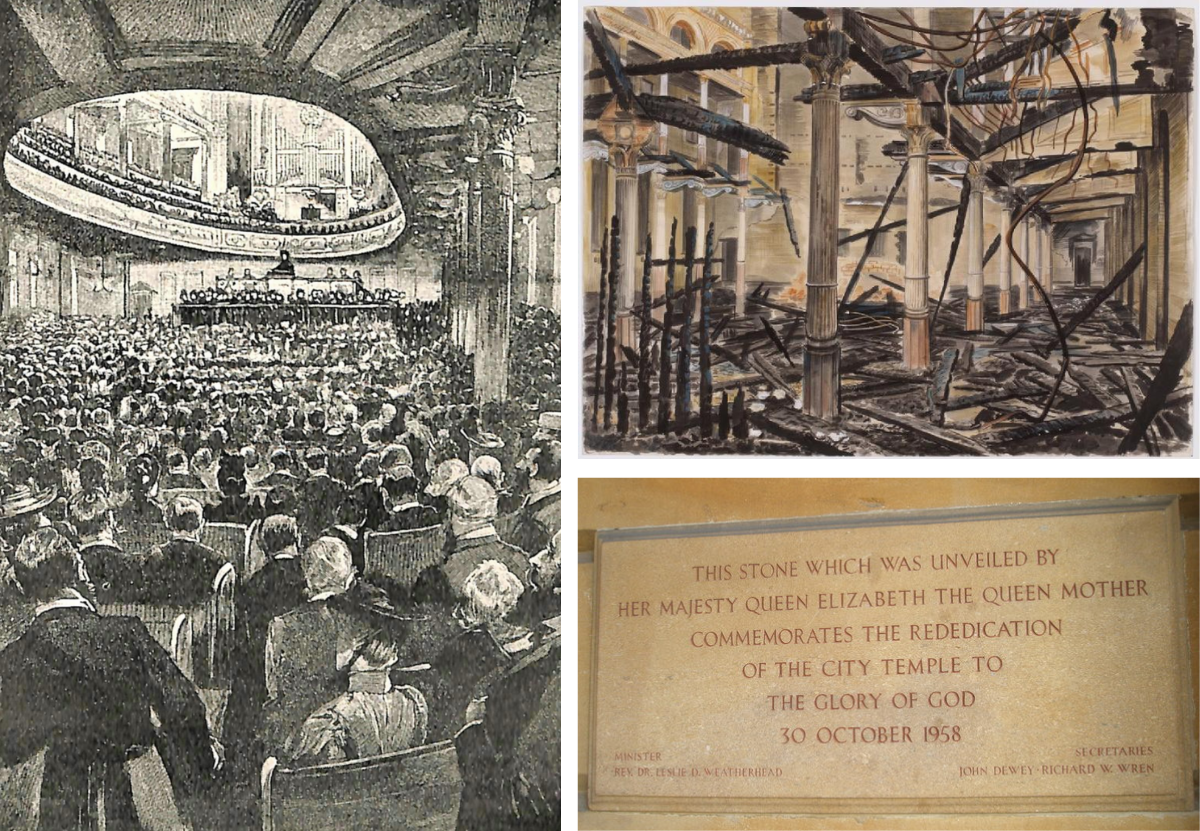
Left: What a full crowd at the City Temple looks like: 1899 engraving of Catherine Booth speaking for the last time in London, in City Temple. Wikimedia Commons. Right, top: The interior of the City Temple destroyed in The Blitz – watercolour by Vivian Pitchforth (1941). Wikimedia Commons. Right, bottom: Commemorative plaque outside The City Temple. After its reconstruction from bombardments during World War II, City Temple was rebuilt and Queen Elizabeth II rededicated the City Temple to "The Glory of God." As fate would have it, Bahá'u'lláh's name in Arabic also means "The Glory of God." Photo: Basher Eyre. Wikimedia Commons.
The Reverend Reginald John Campbell introduces Him, and ‘Abdu’l-Bahá then addresses the crowd in Persian from the pulpit of City Temple. The translation of His address is read by Major Wellesley Tudor Pole. He starts:
O Noble friends; seekers after God! Praise be to God! Today the light of Truth is shining upon the world in its abundance; the breezes of the heavenly garden are blowing throughout all regions; the call of the Kingdom is heard in all lands, and the breath of the Holy Spirit is felt in all hearts that are faithful. The Spirit of God is giving eternal life. In this wonderful age the East is enlightened, the West is fragrant, and everywhere the soul inhales the holy perfume. The sea of the unity of mankind is lifting up its waves with joy, for there is real communication between the hearts and minds of men. The banner of the Holy Spirit is uplifted, and men see it, and are assured with the knowledge that this is a new day. . . .
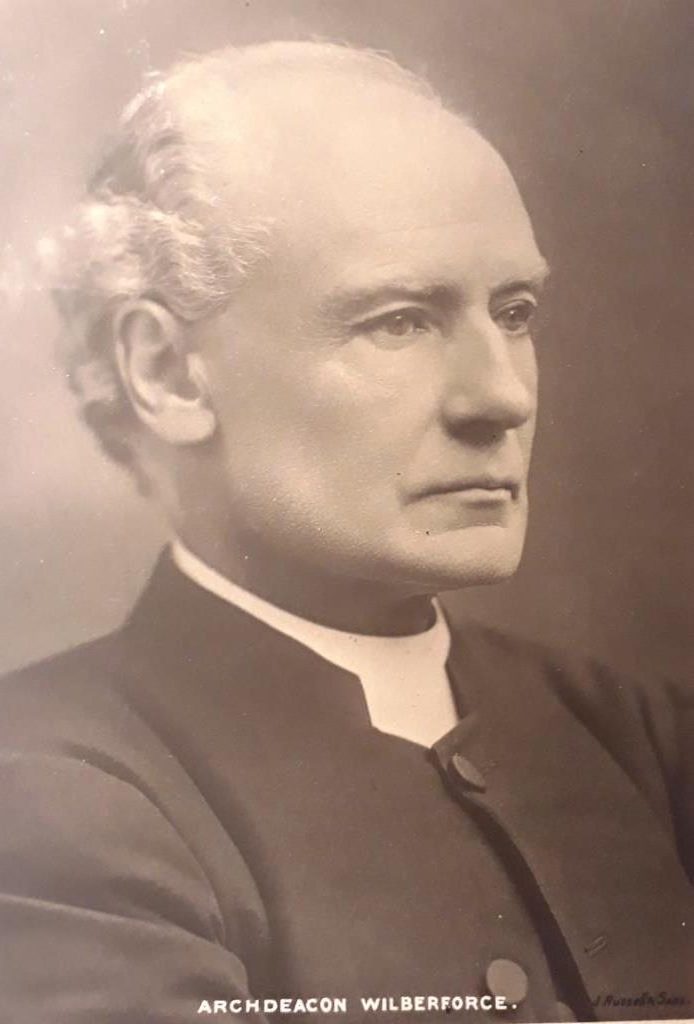
Basil Wilberforce, Anglican Cleric, Archdeacon of Westminster (1900-1916). Wikimedia Commons.
At the request of the Venerable Archdeacon Basil Wilberforce, 'Abdu'l-Bahá addresses the congregation of St. John the Divine (also known as St. John the Evangelist), a parish church annexed to Westminster, after the evening service.
Archdeacon Wilberforce's attitude throughout 'Abdu'l-Bahá's visit is very warm, and he introduces the Master as a revered Messenger from the East, someone who has suffered forty years of captivity and persecution, then crossed seas and countries on a mission of peace and unity.
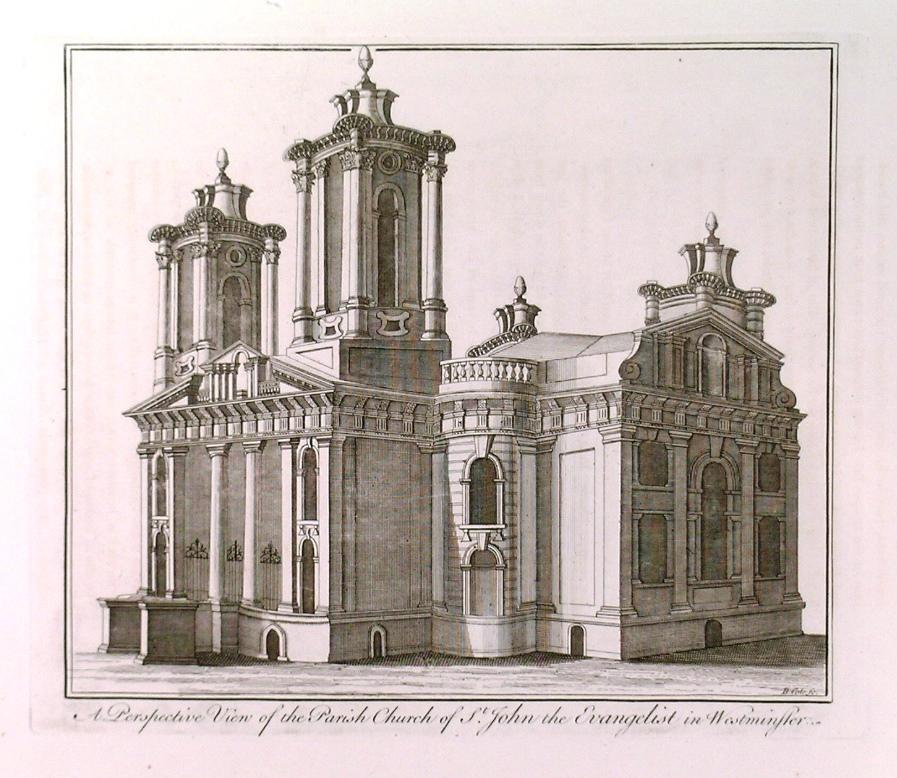
Parish Church of St. John the Evangelist in Westminster, London. AE Books.
The theme of 'Abdu'l-Bahá's talk is the transcendental greatness of the Godhead, as laid out by Bahá’u’lláh in the Kitáb-i-Íqán. The Archdeacon places the Bishop's chair on the chancel steps for 'Abdu'l-Bahá, a move which deeply angers opponents to the Faith, and standing next to Him, reads the translation of 'Abdu'l-Bahá's address himself.
The congregation is profoundly moved, and, when the Archdeacon kneels to receive 'Abdu'l-Bahá's blessing, they follow suit.
The Archdeacon says:
Truly the East and the West have met in this sacred place tonight.
Quoted in ‘Abdu’l-Bahá in London, Addresses and Notes of Conversations. page 21
The entire assembly stands and sings the hymn “O God our help in ages past” as ‘Abdu’l-Bahá and the Archdeacon walk down the aisle to the vestry hand in hand.
Outside the Church, Salvationists are holding their meeting and ‘Abdu’l-Bahá is deeply impressed and touched at the sight of the men, women and children gathered together praying and singing on a street corner in the evening.

Two photographs of 'Abdu'l-Bahá taken in Bristol during His visit in 1911. The Journey West.
'Abdul-Bahá leaves London on September 23 and arrives in Bristol at mid-day to visit Major Wellesley Tudor Pole, who had met Him in Ramleh the year previously. He is very pleased with the views from Major Wellesley Tudor Pole's home, the Clifton Guest House windows and balcony and with the fresh air. After a short rest, 'Abdu'l-Bahá is taken for a drive to see the sights of Bristol.
In the evening, at dinner, 'Abdu'l-Bahá speaks about the joy He is finding in freedom, and the growing interest in unity and peace He is finding throughout England and speaks of that dinner as a holy occasion that will be recorded in history. After supper, 'Abdu'l-Bahá addresses about 80 people in the Guest House salon. 'Abdu'l-Bahá speaks passionately about the coming of a New Age and the responsibilities of everyone, in the East and in the West. 'Abdu'l-Bahá then blesses the whole assembly in the name of Bahá'u'lláh and shakes hands with everyone.

Two photos of 'Abdu'l-Bahá at the Clifton Guest House at 17, Royal Crescent in Bristol in 1911, one where He is looking out from the balcony (Source), and the other one where He is pacing outside the Guest House (source).
On Sunday, September 24, 'Abdu'l-Bahá wakes very early and dictates letters and cables from 5 to 8 in the morning. After breakfast, He grants several private interviews to friends who have traveled from London.
After lunch, 'Abdu'l-Bahá walks throughout the Guest House blessing and dedicating each room to the service of Bahá'u'lláh and promises the house will become a center of peace and rest for pilgrims from east and west. He blesses the Oratory and all the works in the Guest House, calling them to Him and speaking to them about the dignity of work and true service.
Bristol seems to have been a very enjoyable respite of clean, fresh air for 'Abdu'l-Bahá after the smoke and noise of London. On His last morning in Bristol before returning to London, 'Abdu'l-Bahá receives visitors, including a Canon of the Anglican Church, then writes a beautiful prayer and blessing in the Clifton Guest House Visitor's book.
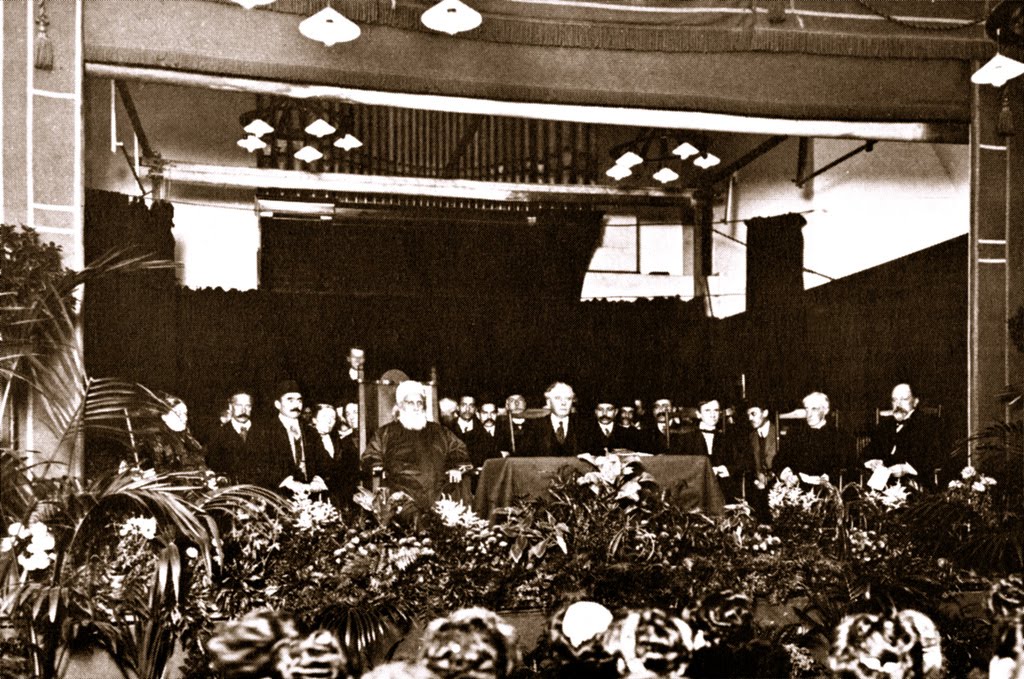
'Abdu'l-Bahá at Passmore Edwards Settlement in Tavistock Place, London at His Farewell Address on 29 September 1911. Any Thing Bahai Resources.
Mrs. Thornburgh-Cropper, one of the very first pilgrims to arrive in the Holy Land in 1898, organizes a farewell evening for ‘Abdu’l-Bahá. About four hundred and sixty people meet on Friday evening, September 29 in the hall of the Passmore Edwards’ Settlement at Tavistock Place, shortly before 'Abdu'l-Bahá’s departure for Paris. The atmosphere of the evening is infused with a beautiful spirit, and the proceedings carry a loft spiritual tone far from an ordinary meeting or a religious gathering. After the Lord’s Prayer, and prayers for Unity revealed by Bahá'u'lláh and Gelasius (from the Fifth Century), a series of speakers give addresses, all tending towards the themes of Unity, Peace and Universal Brotherhood. You can read them, some in full and some summarized, here and here. Below is a marvelous excerpt:
We have met together to bid farewell to ‘Abdu’l-Bahá, and to thank God for his example and teaching, and for the power of his prayers to bring Light into confused thought, Hope into the place of dread, Faith where doubt was, and into troubled hearts, the Love which overmasters self-seeking and fear. (…) ‘Abdu’l-Bahá brings, and has brought, a message of Unity, of sympathy and of Peace. He bids us all be real and true in what we profess to believe; and to treasure above everything the Spirit behind the form. With him we bow before the Hidden Name, before that which is of every life the Inner Life! He bids us worship in fearless loyalty to our own faith, but with ever stronger yearning after Union, Brotherhood, and Love
At the end, ‘Abdu’l-Bahá rises and gives His own farewell address. He stands, and His eyes filled with animation, speaks for fifteen minutes in His soft, musical Persian. He closes with a prayer, hands extended and palms turned upwards.
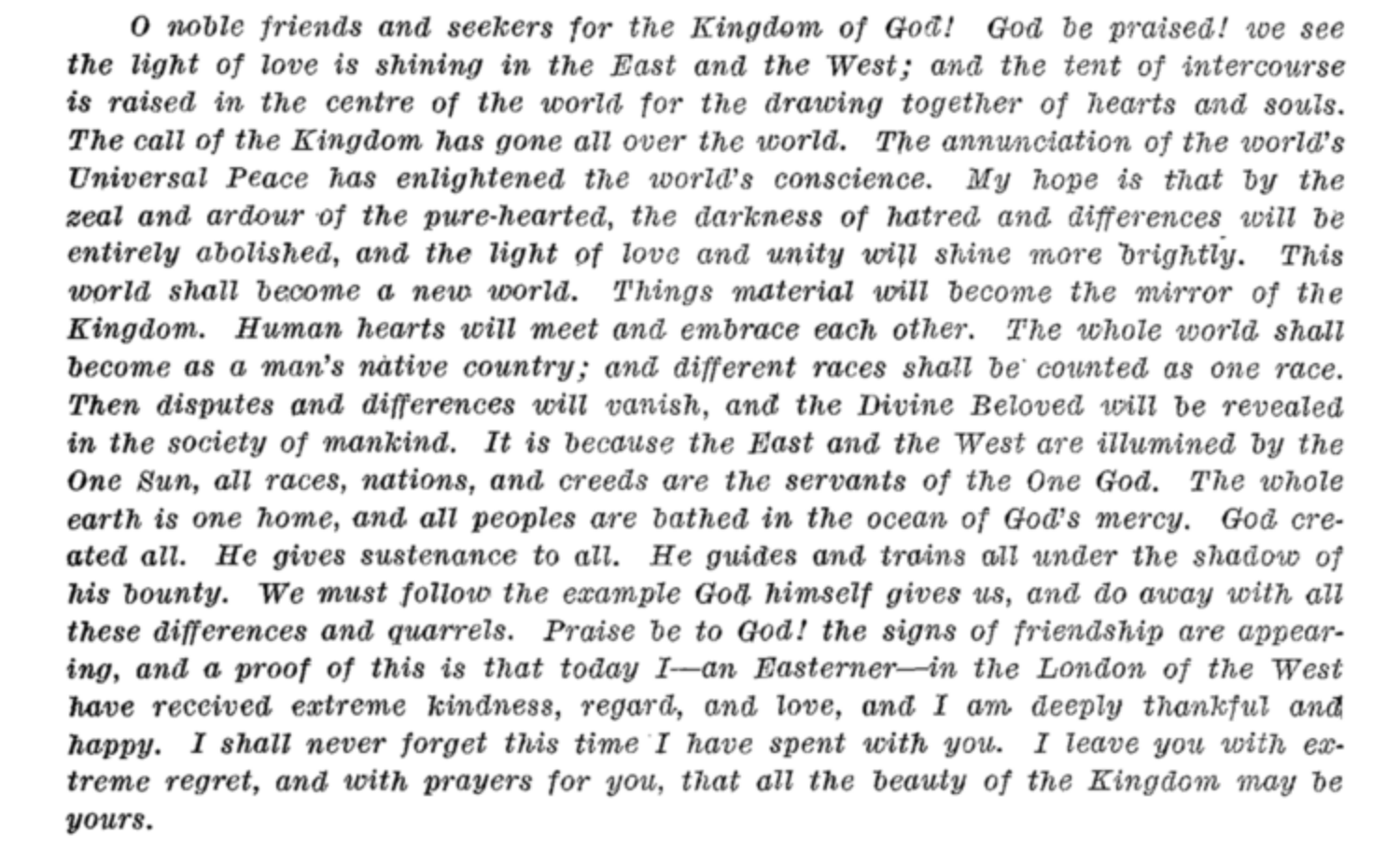
Prayer read by 'Abdu'l-Bahá at the conclusion of His Farewell Speech at Passmore Edwards Settlement. From Star of the West, Volume II, Number 13, page 5.
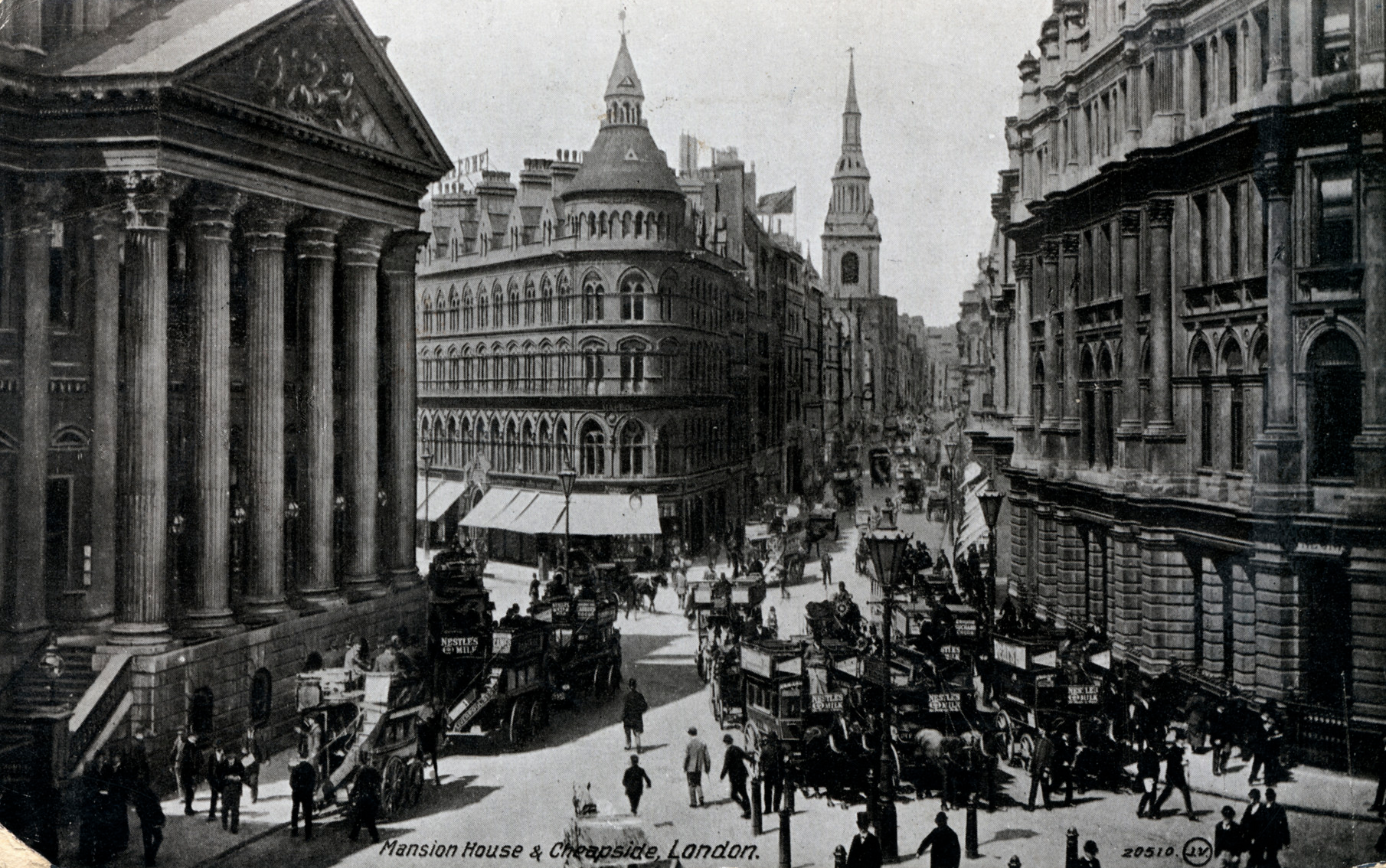
Mansion House (on the left) and Cheapside in 1911. Flickr.
The Right Honourable, the Lord Mayor of London, Sir Thomas Vezey Strong, had the express wish of meeting 'Abdu'l-Bahá. Accordingly, the Master pays him a visit, early on the morning of Monday, October 2, the day before He is to leave London. 'Abdu'l-Bahá and Sir Vezey Strong talk mostly about the social conditions of great cities and 'Abdu'l-Bahá says that London is the best-regulated city He has seen. He says:
Every man walking in the street is free as if he were in his own kingdom. There is a great spiritual light in London. The effort made for justice is real and in this country the law is the same for the poor as for the rich.
Abdu’l-Bahá in London, Addresses and Notes of Conversations pages 109-110.
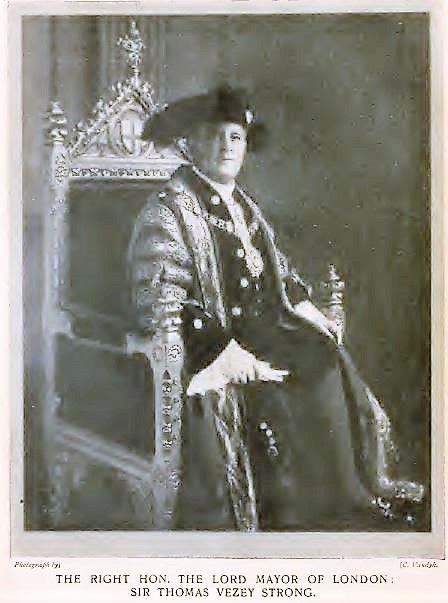
Sir Thomas Vezey Strong, the Lord Mayor of London. Find a Grave,
'Abdu'l-Bahá takes a great interest in hearing how inmates are taken care of once they leave prison and says something very interesting:
It is well with a country when the magistrates are as fathers to the people.
'Abdu'l-Bahá quoted in Redman, Earl. 'Abdu'l-Baha in Their Midst
In His quintessential, perfect true-to-Himself nature, before He leaves London, ‘Abdu’l-Bahá goes from having breakfast with the Mayor of London and speaking about the state of the world, to an East-end hospital to visit a seriously-ill young writer, who was very anxious to see Him. Only 'Abdu'l-Bahá.

During 'Abdu'l-Bahá's 1911 stay in London, He was photographed by the famous Lafayette studio. Bahá'í World News Service.
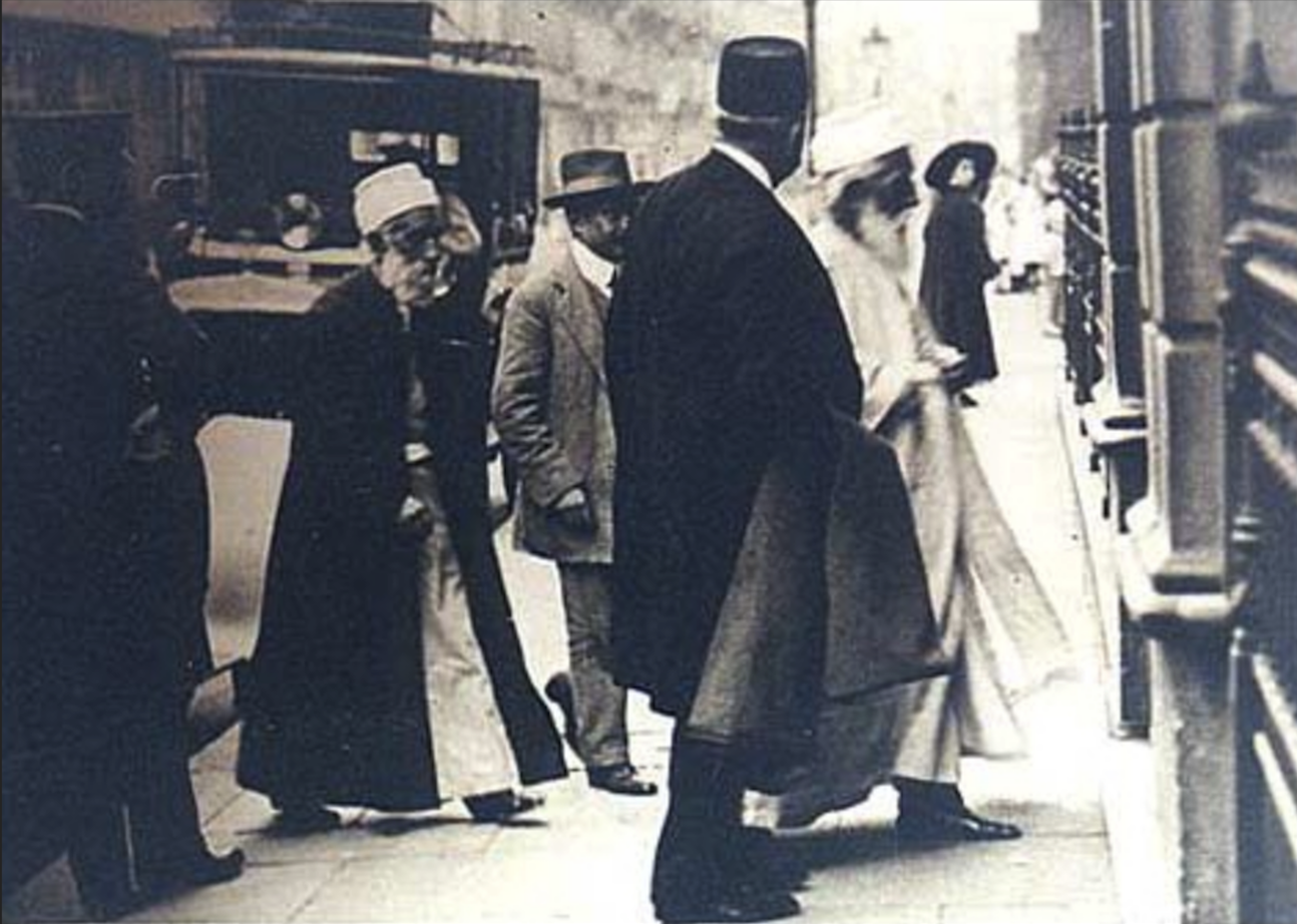
'Abdu'l-Bahá leaving London for Paris at Victoria Station on October 3, 1911. Courtesy of the National Spiritual Assembly of the Baha'is of the UK. Baha'i Blog.
The last morning of 'Abdu'l-Bahá's stay in London has arrived. Many friends are gathered at 97, Cadogan Gardens to say farewell, and 'Abdu'l-Bahá's fairly large party, His secretaries and several friends are now ready to depart to Victoria Station for the train. ‘Abdu’l-Bahá sits, calmly writing. When the friends try to remind 'Abdu'l-Bahá that time is running short to catch the train, the Master looks up and says:
There are things of more importance than trains.
'Abdu'l-Bahá continues to write. At some point during His stay in London, a Zoroastrian physician sends an elaborate telegram to Parsis in Bombay, saying:
The Torch of Truth has been lighted again in the East and the West by Abdu’l-Bahá.
His Parsi (Zoroastrian) brothers instruct this fellow, a member of one of the most ancient religions in the world, to perform an elaborate ceremony for 'Abdu'l-Bahá. It is this breathless, rushed, Zoroastrian physician who bursts in now, while 'Abdu'l-Bahá is writing, and while His entourage has been wanting Him to have left Cadogan Gardens already. He bows low before the Master and says:
In the name of the disciples of Zoroaster, The Pure One, I hail Thee as the ‘Promised Sháh Bahrám’!
The man has brought with him a sacred oil made of a rare perfume, and with it, anoints the head and breast of 'Abdu'l-Bahá, afterwards touching the hands of those present. He then places around 'Abdu'l-Bahá's neck and shoulders an exquisite garland of rose-buds and lilies. Once the brief but impressive ceremony is concluded, 'Abdu'l-Bahá removes the garland from His neck and leaves for Victoria Station towards Paris.
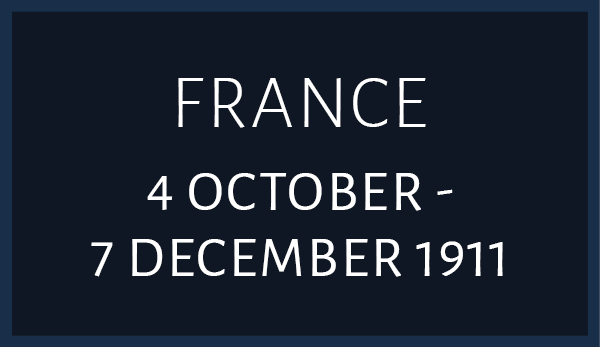
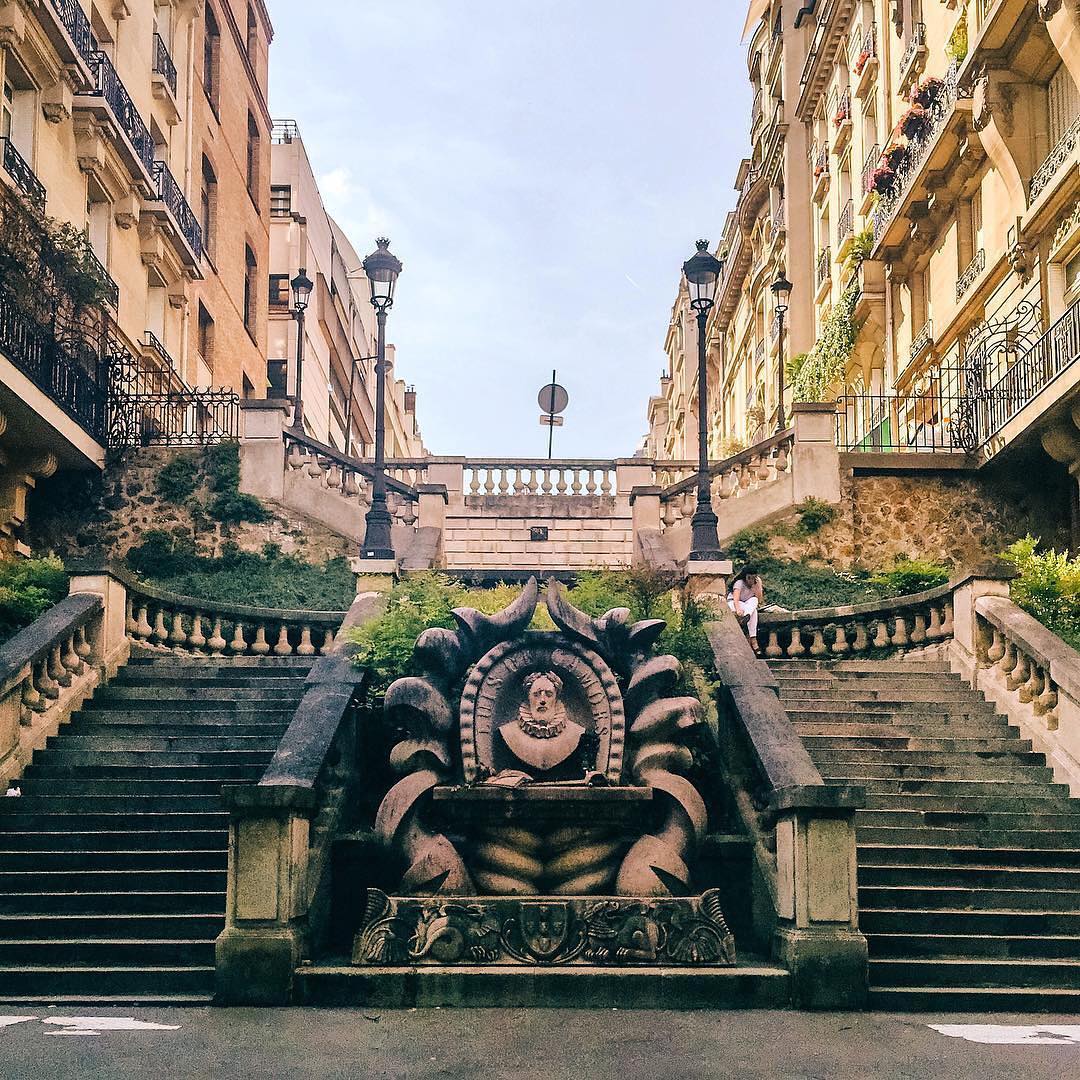
Massive stone stairs, among the most beautiful in Paris, leading up to Avenue de Camöens. The statue is of the Portuguese poet, Luís de Camões, for whom the street is named. © ruemargaux /Instagram. ParisZigZag.
'Abdu'l-Bahá' stays in Paris for nine full weeks, the longest He will stay anywhere in any one city for one stretch of time in Europe. For the duration of His stay in Paris, ‘Abdu’l-Bahá resides in an apartment at 4, avenue de Camoëns, very close to the Eiffel Tower and the Trocadéro. This beautiful apartment has since been purchased by the National Spiritual Assembly of France and is available for visits. ‘Abdu’l-Bahá is served and cared for during this time by Mr. and Mrs. Dreyfus-Barney, who have taken up residence nearby, and Lady Blomfield, 'Abdu'l-Bahá's sublime hostess in London, has also followed Him to Paris and repeats her hospitality exploits, this time joined by her two devoted daughters.
'Abdu'l-Bahá draws the same unending stream of visitors hailing from around the world, and the same varied crowd thronging to hear Him in Paris as He did in London. Every morning, according to His custom, 'Abdu'l-Bahá expounds on the teachings of Bahá'u'lláh to those gathered around Him, the learned and the illiterate, eager and respectiful of all creeds and nationalities, from the East and the West. ‘Abdu’l-Bahá speaks in Persian, which is translated into French by Laura and Hippolyte Dreyfus-Barney. Lady Blomfield's two daughters, Mary and Ellinor, the family friend Miss Beatrice Platt, and Lady Blomfield herself all take notes of 'Abdu'l-Bahá's daily talks. At 'Abdu'l-Bahá's request, the notes for 53 talks are edited and published in English under the title Paris Talks.
‘Abdu’l-Bahá’s 1911 sojourn in Paris is regulated by the talks He gives in the Camoëns apartment. The Trocadéro gardens abut the street He lives on, and ‘Abdu’l-Bahá finds strolling the avenues of the garden relaxing. Such is the majesty He exudes that one day, a passing coachman will remove his cap out of respect.
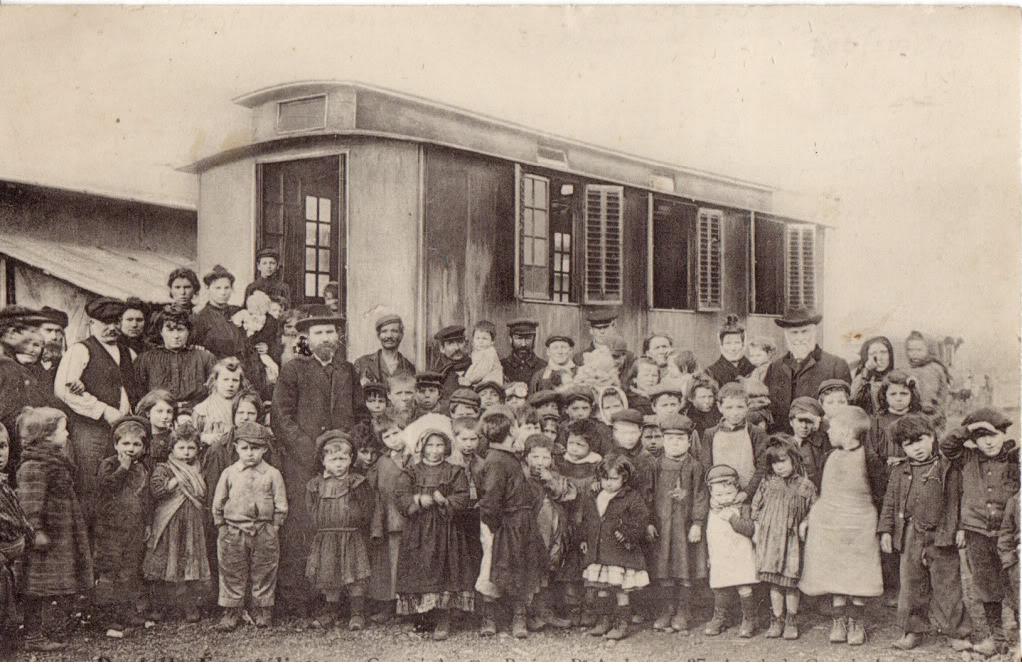
Social Action initiative of Mr & Mrs. Ponsonaille in front of Pastor Samuel Honyman Anderson's evangelical caravan for his work with the McCall Missions. Pastor Anderson is on the left in the dark suit, beard and the dark hat. The Ponsonaille couple at first worked out of one of these caravans. Photo graciously provided by the Bahá'ís de Picardie: Brève HIstorique des Bahá'ís de Picardie.
One of the most remarkable aspects of ‘Abdu’l-Bahá's Journeys to the West is His absolute, perfect and constant universal love. On October 15, 1911, 'Abdu'l-Bahá receives many important visitors. He meets with a prominent Persian scholar and intellectual, Mírzá Muḥammad Khán-i-Qazvíní, a close friend of Edward Granville Browne's. The man is the farthest thing from enkindled. He meets 'Abdu'l-Bahá, and in his recollections, he thinks to mention something as prosaic as the fact he ate a "very delicious broth" that contained "excellent garbanzo beans," which he hastens to add are "a very rare item in Paris."
This is where, at every single moment of His Journeys to the West, 'Abdu'l-Bahá is leaving enormously vital clues for posterity on what is important (what is about to happen) and what is most definitely not important (meeting with someone who cares about the quality of garbanzo beans).
Later in the day, after meeting the "important" Persian scholar, 'Abdu'l-Bahá goes beyond the walls of Paris for a deeply spiritual visit. After His morning address in 4, Avenue de Camöens, the Master invites all those present to join Him in the outskirts of the city, in a slum called Pré Saint Gervais in Seine-Saint-Denis where an initiative of Bahá’í social action is underway. He is going to meet people who do, rather than talk.
Désiré Jacques Victor and Élise Ponsonaille are poor. Désiré Ponsonaille works as a collector for a large department story in Paris. When they become Bahá'ís, they have a calling to serve Bahá'u'lláh by ministering to the poorest of children and orphans, so they settle in Pré Saint Gervais a few years before 1911. They realize that if they skip lunch (a deeply significant meal in French culture), they can give it to the children. They start their work in an old trailer where they read the Bahá'í Holy Writings. Soon, the crowd swells and various clergymen want to consolidate the crowd under their umbrella, but the Ponsonaille couple decline repeatedly. This angers the clergy who take the Ponsonaille’s trailer away. When the Paris Bahá'ís offer to build them a place, Désiré Ponsonaille asks only for the materials, and builds the humble place himself.

Left: Pré Saint Gervais in relation to Paris. Right: Path from the Station to the home of the Poinsonaille, 22, rue Ledru Rollin. Source: Courtesy of Armindo Pedro from the website Bahá'ís de Picardie.
‘Abdu’l-Bahá and His party step of the train onto the main street in Pré Saint Gervais. They walk down the end of a narrow lane, soldiers and women drinking and screaming inside open doors, linen drying out of windows, women and children everywhere. Finally, an acquaintance directs them to a small gate, past the abandoned trailer into a small plank cabin, 6 by 8 meters wide, with a raised platform a rough plank desk on one end, with a Greatest Name in a frame hanging from it.
This is what the cabin looks like through Alice Beede’s eyes, through physical eyes:
…after three months spent going around Paris every day, I assure you I had never seen such a dirty, miserable quarter.
Star of the West, Volume II, Number 18, page 6
But this is what how 'Abdu'l-Bahá sees the cabin, through the eyes of the spirit:
I have been in many beautiful houses, but this is more beautiful to me than any of the others, for the spirit of the love of Bahá'u'lláh is here.
Star of the West, Volume II, Number 18, page 6
A half dozen guests join the party and Élise Ponsonaille leads the crowd of children in a song, after which Mr. Ponsonaille reads a Tablet ‘Abdu’l-Bahá had sent. He speaks for a while, and the children sing again, and it is obvious they have all been eagerly awaiting ‘Abdu’l-Bahá’s promised visit. At last silence, and the crowd rises to its feet when ‘Abdu’l-Bahá quickly enters and starts speaking from the front of the room.
I am very glad to be here with you. I am very glad to see you all here. I love you very much. I have been in many beautiful houses, but this is more beautiful to me than any of the others, for the spirit of the love of Bahá'u'lláh is here. You are all receiving the teachings of God and learning how to act and live and some day you will be great and wise for having learned the truth. I have seen many beautiful rich children, but to me you are more beautiful, and I love you all (as Christ loved little children) here. Monsieur and Madame Ponsonaille are your spiritual teachers. They give you food and understanding eternal of God, while your parents are giving you your material food and care for your bodies. You must love these good friends.
Turning to Désiré and Élise, ‘Abdu’l-Bahá says:
This is a great work you are doing for the love of God in this great day, through the power of Bahá'u'lláh. Your station is great. Your names will go down through all the ages. Kings and Queens have never been talked of and remembered as you will be. You are workers in the Kingdom of Abhá and I am very happy and love you very much.
Then, 'Abdu'l-Bahá tilts His head back, raises His upturned hands together, as if to receive the outpouring of the Holy Spirit and chants a prayer. He steps down from the platform and, surrounded by children, lays His hands on their heads, and takes their hands in His and frays Himself a passage to the door. Some of the children had been boisterous and had to be quieted, but from the moment 'Abdu'l-Bahá enters the cabin, not a single one moves or speaks, and now as He leaves, they fall over each other, yearning for Him to take their hands. Outside the cabin, 'Abdu'l-Bahá stands near Désiré Ponsonaille and hands him many gold coins from inside His ‘abá before leaving. They will see each other again in a year and three months, when ‘Abdu’l-Bahá returns to Paris after his Journey to North America.
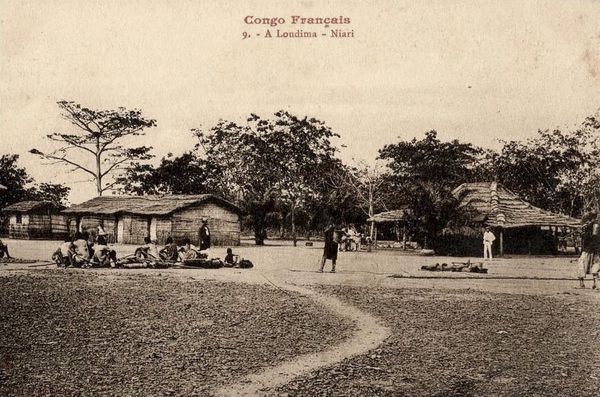
Loudima, in the Niari in the French Congo around 1900, when the social worker speaking to 'Abdu'l-Bahá in 1911 would have been there. © Audema from Le Blog de Fabrice au Congo.
Visitors from every country in the world, from all walks of life throng to 4, Avenue de Camöens to tell their myriad stories to 'Abdu'l-Bahá. Those closest to 'Abdu'l-Bahá, Lady Blomfield and her daughters, His secretaries, Laura and Hippolyte Dreyfus-Barney hear them all, but one particularly impresses them, and for very good reason.
One day in the winter of 1911, a social worker comes to 'Abdu'l-Bahá and confides in Him:
O 'Abdu'l-Bahá, I have come from the French Congo, where I have been engaged in mitigating the hardships of some of the natives. For sixteen years I have worked in that country.
'Abdu'l-Bahá's words of comfort to the man are truly mind-expanding. His response is:
It was a great comfort to me in the darkness of my prison to know the work which you were doing.
We will never begin to understand the infinitude of things 'Abdu'l-Bahá not only knew but felt and experienced on a plane of empathy that defies the capacity of the human mind to imagine. From 4,800 kilometers away, 'Abdu'l-Bahá was comforted by the worthy toils of this suffering social worker in the French Congo, one of the remotest corners of the planet. In 1895, when the man reached his post in Congo, three short years after the Ascension of Bahá'u'llá, 'Abdu'l-Bahá was being attacked on all sides by the Covenant-breakers, six years later, as the man was still at his post, 'Abdu'l-Bahá had been re-incarcerated in 'Akká, because of the evil plottings of His enemies.
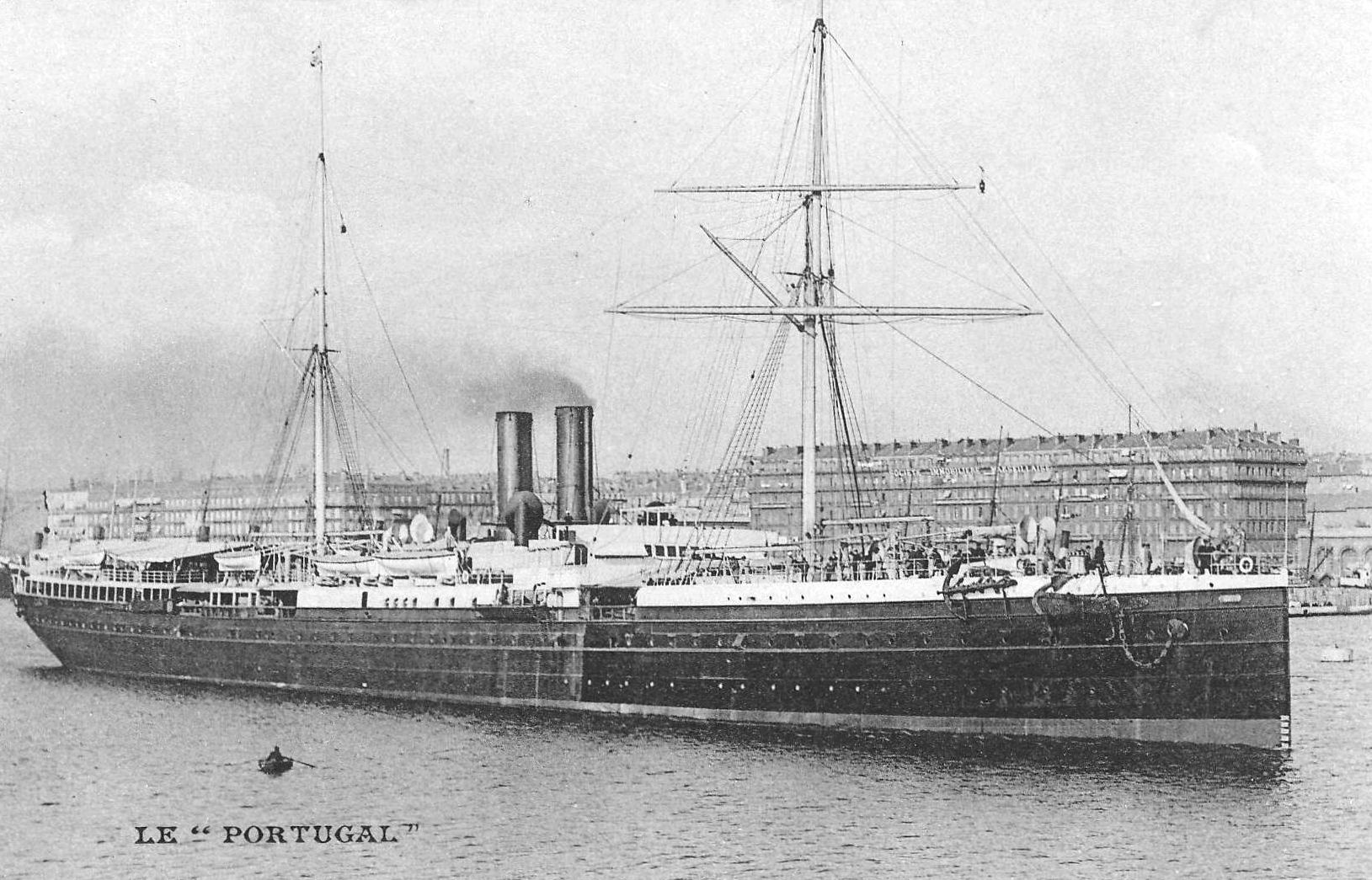
Le Portugal in Marseille sometime after 1900. L'Encyclopédie des messageries maritimes.
'Abdu'l-Bahá arrives in Marseille from Paris on 3 December 1911. He speaks at the Alliance théosophiste on December 6 and boards Le Portugal on December 7, bound for Port Said to winter in Ramleh, after having expended all His energies during the last four months in France, Switzerland and England.
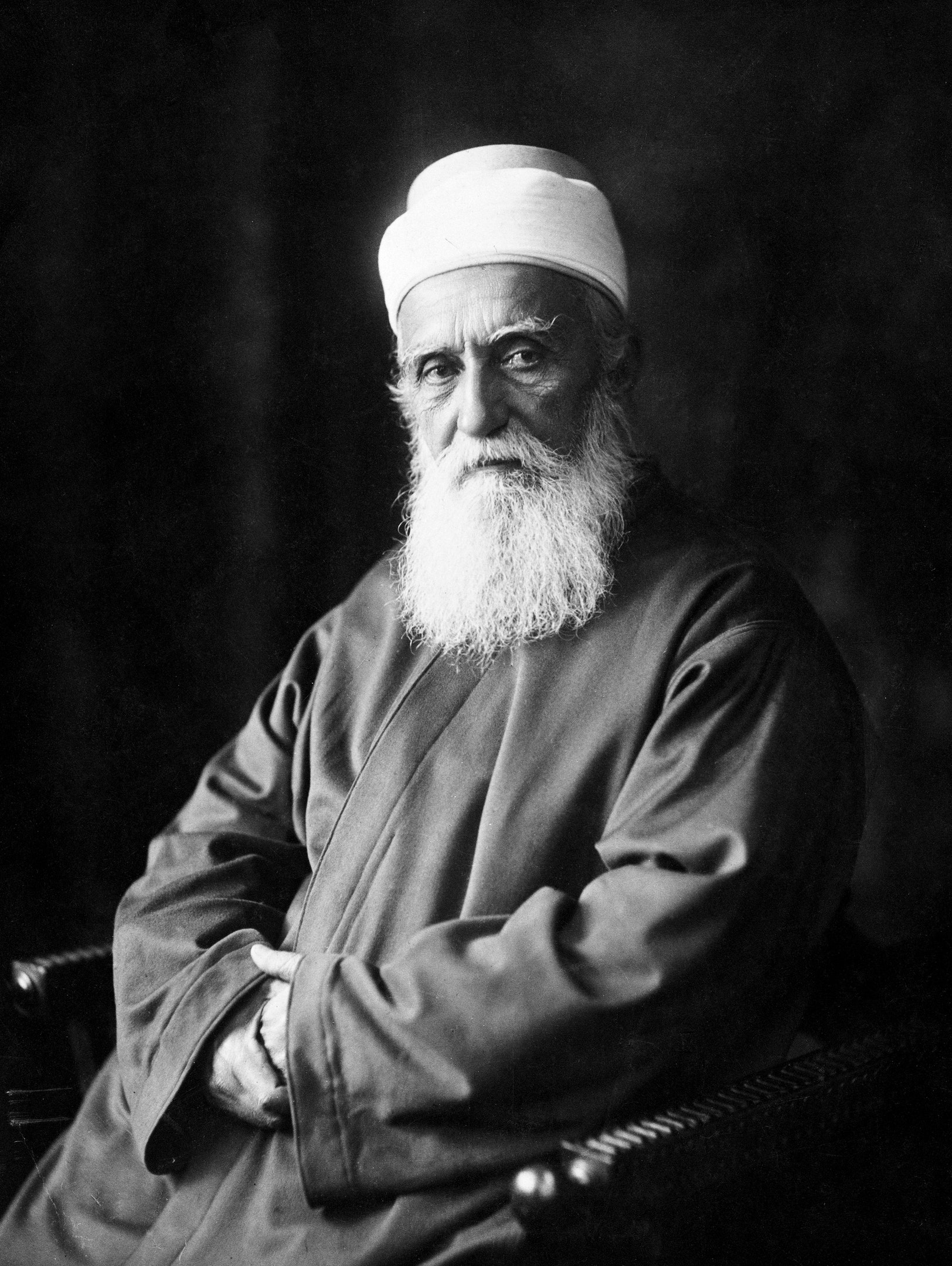
Beautiful portrait of 'Abdu'l-Bahá taken by the photographers Frédéric Boissonnas and André Taponier, in their studio at the prestigious address 12, rue de la Paix in Paris in October 1911. Bahá'í Media Bank.
We were not able to find an exact date for the portrait session of the photograph above at Boissonas et Taponier. Below is another iconic portrait of 'Abdu'l-Bahá, again from Boissonas et Taponier, and it is believed this is the portrait of Himself that 'Abdu'l-Bahá liked the most, and was known to have presented copies of it to American friends in the United States during His visit.

Portrait of 'Abdu'l-Bahá, purported to be His favorite, taken by the photographers Frédéric Boissonnas and André Taponier, in their studio at the prestigious address 12, rue de la Paix in Paris in October 1911. Bahá'í Media Bank.
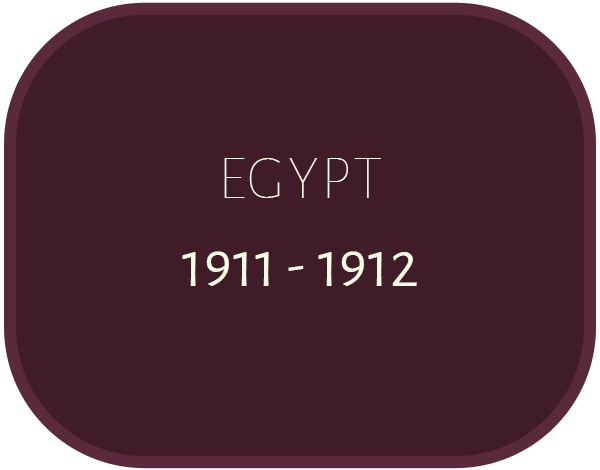
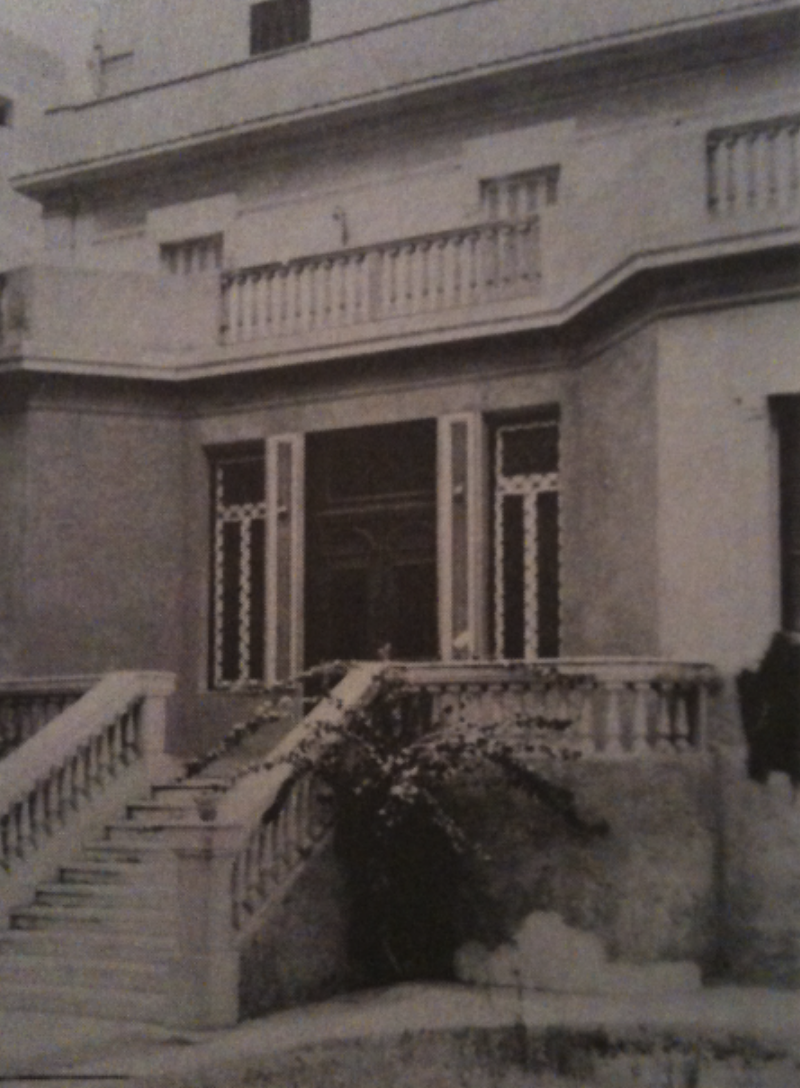
Villa occupied by the Master in Ramleh in 1912. The Journey West.
'Abdu'l-Bahá spends the winter of 1911 - 1912 in Egypt, recovering from His whirlwind four-month trip through France, Switzerland, England and France again. His physical strength is depleted, and He needs rest. It does not seem like 'Abdu'l-Bahá makes definite plans for where to go when in His Journeys to the West, and intuition guides many of His decisions. The American Bahá'ís start writing letters to 'Abdu'l-Bahá, asking, begging, pleading with Him to come to America as soon as they hear in Star of the West that 'Abdu'l-Bahá has left the Holy Land for the first time in forty years and embarked on travels through Europe. From second-hand sources, these demands become quite insistent and incessant. Isabella Brittingham, a very prominent teacher of the Cause and named a Disciple of 'Abdu'l-Bahá by Shoghi Effendi, also writes to the Master in 1911, presumably on this same subject. On April 28, 1911, 'Abdu'l-Bahá reveals a Tablet to Isabella Brittingham in response which contains these extraordinary words:
If the believers of God in New York and other cities of America establish, in a befitting manner, union and harmony with spirit, tongue, heart and body, suddenly they shall find 'Abdul-Bahá in their midst.
Quoted in Star of the West
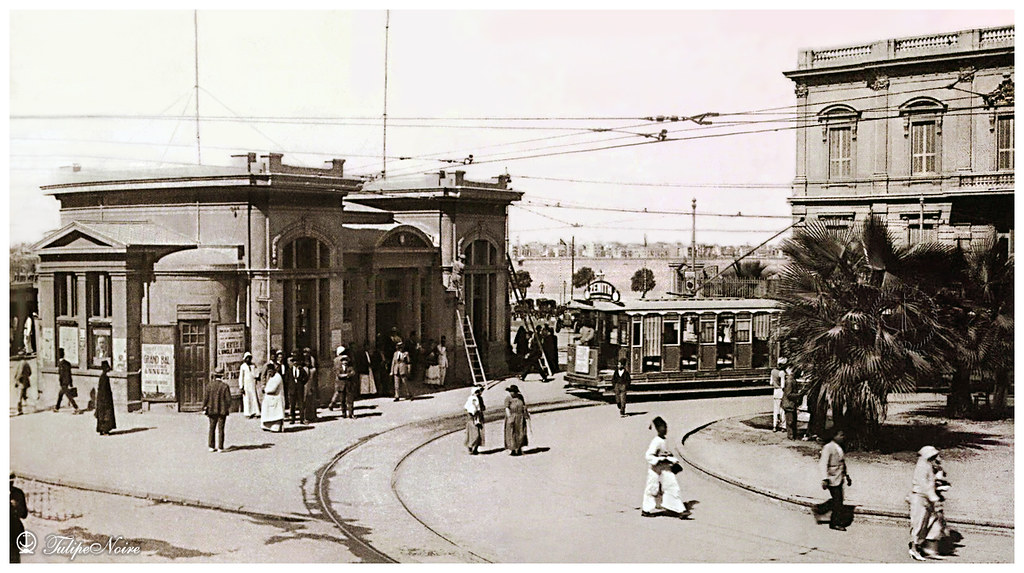
Ramleh, Alexandria tram station in 1924. 'Abdu'l-Bahá often takes the tram alone in Ramleh, paying for His fare Himself. He leaves from here for the harbor in Alexandria on March 25, 1912. Source.
Mírzá Maḥmúd-i-Zarqání (of "Maḥmúd's Diary" fame) tells the same story with additional details. According to Zarqání, when the American Bahá'ís hear of 'Abdu'l-Bahá's travels in Europe, they feel sure He will also come to America. In fact, many Bahá'ís joyfully make the two-week journey by steamer to London to be in 'Abdu'l-Bahá's presence. They continually plead with the Master to keep going west, but 'Abdu'l-Bahá decides instead to return to Egypt for the winter months. Over those three months, each week sees more and more invitations from America until, at last, 'Abdu'l-Bahá agrees, to the greatest joy of the American Bahá'ís. Zarqáníi mentions a very heartbreaking detail. According to Him, before leaving for America, 'Abdu'l-Bahá will often mention
This journey is a long one and my body is very weak. We shall remain at sea for more than two weeks; it will be difficult for my body to bear. But as it is for the sake of diffusing the divine fragrances, I shall undertake it, trusting in God and severing myself from all else save Him.
'Abdu'l-Bahá quoted in Mahmúd-i-Zarqání, Mírzá. Mahmúd’s Diary Chronicling ʻAbdu’l-Bahá’s Journey to America.
It is too easy to forget that 'Abdu'l-Bahá is human, because He is so superhuman in everything that He does. These humble, modest, understated lines show that the Journey to America He is about to undertake, like so many things He has done in His life, like building the Shrine of the Báb, will be done at the expense of His comfort and His health, and His very tried and tired body.
'Abdu'l-Bahá returns to the lovely Alexandria suburb of Ramleh, where He had set up residence in 1910-1911 and remains there for the duration of this winter period. Ramleh is a very modern city, and in fact, looks quite like Paris in many of the contemporary photos from the time of 'Abdu'l-Bahá.
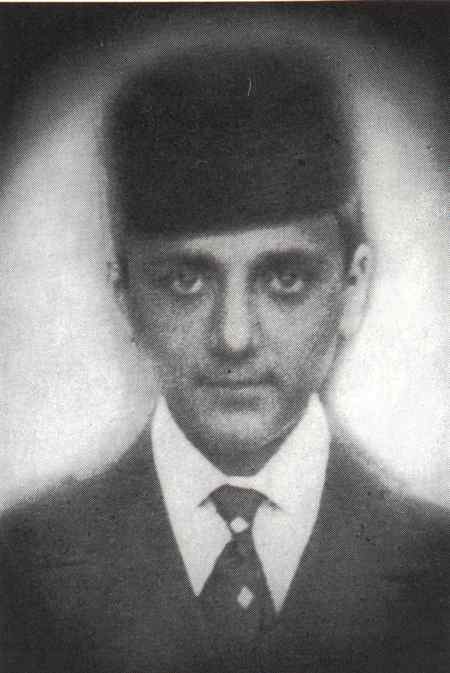
Shoghi Effendi at 15 in 1912, during his studies in Beirut. Médiathèque Bahá'íe.
At some point before the end of March 1912, 'Abdu'l-Bahá sends for His beloved grandson, Shoghi Effendi. Shoghi Effendi, now a young man of 15 studying in Beirut, and has been following His beloved Grandfather's travels. He has heard so much about America and longs to travel with 'Abdu'l-Bahá on this momentous trip. The excitement is mutual on the part of 'Abdu'l-Bahá, who has even purchased long robes and two turbans, one green and one white, like His, for Shoghi Effendi to wear in America. When Shoghi Effendi tries on his new clothes for 'Abdu'l-Bahá, his Grandfather's eyes shine with pride and pleasure. The teenager burns with anticipation for the voyage, at the idea of being at 'Abdu'l-Bahá's side as He travels through North America and promulgates the message of Bahá'u'lláh. The day before they set sail, Shoghi Effendi asks his very close friend Ali Yazdi:
Do you want to go to the ship and see my cabin?
The two boys, joined by other Bahá'ís take the electric tram from Ramleh to the harbor and there is the Cedric, a White Star Liner. It is a majestic ship, one of only two that travel the Alexandria to New York route with a single stop in Naples. Shoghi Effendi takes Ali Yazdi on board and gives him the complete tour of the ship, from the upstairs to the dining room and his cabin. Ali Yazdi is very happy for his overjoyed friend who promises to write when he arrives in America.
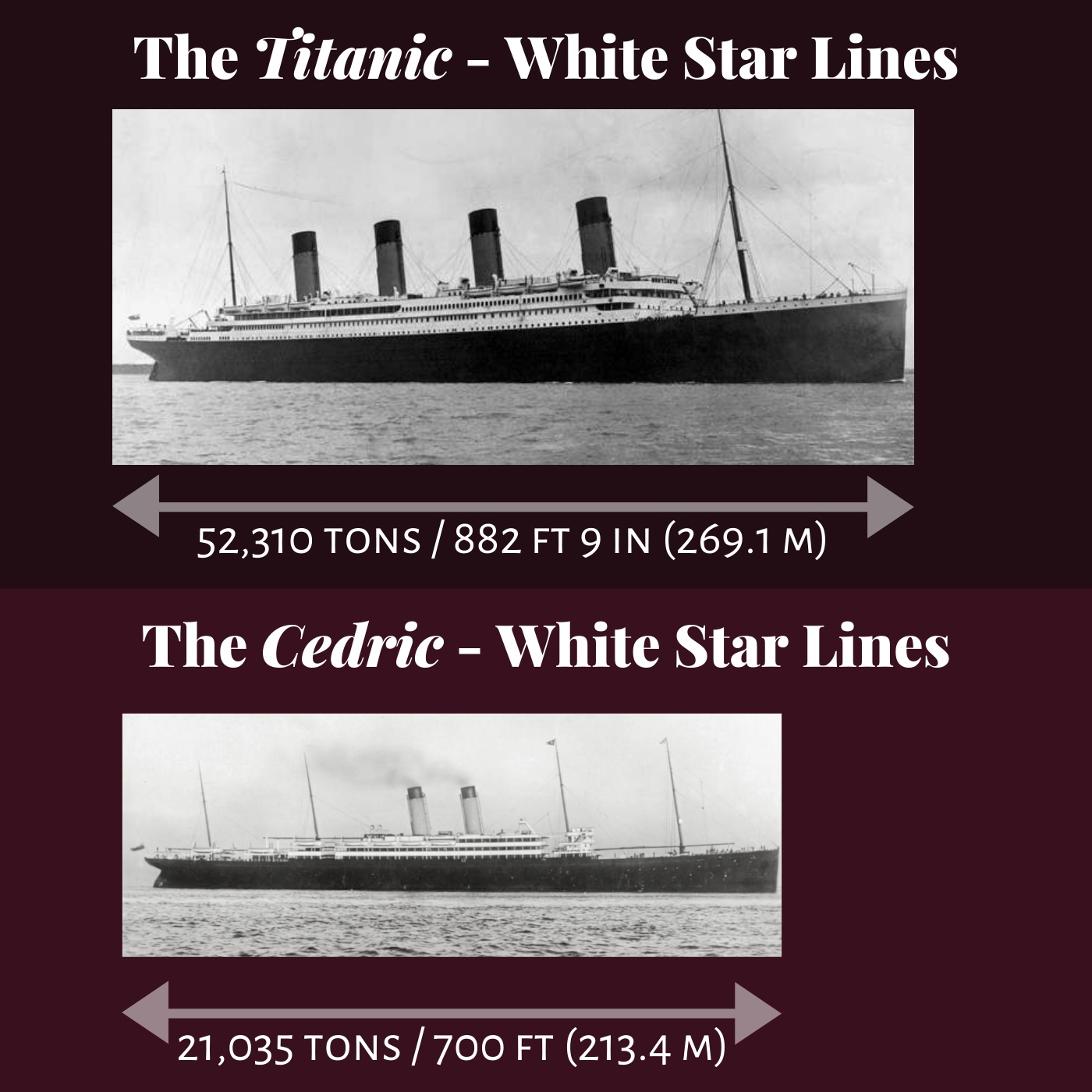
The Titanic vs. the Cedric, both ships from the White Star Lines. Comparison in tonnage and length from information on Wikipedia. Original Graphic by Violetta Zein
When plans for 'Abdu'l-Bahá's Journey to America become solid, the Bahá'ís suggest He travel with the Titanic, about to make her maiden voyage from Southampton, England to New York City. The Titanic is a brand new ocean liner, the largest ever made, unsinkable, majestic, luxurious, fit for the son of a Manifestation of God. In their eagerness and impatience to see 'Abdu'l-Bahá, the American Bahá'ís raise 18,000 dollars for His journey. Eighteen thousand 1912 dollars, calculated for inflation, is equivalent to more than half a million dollars today! During His Journeys to the West, 'Abdu'l-Bahá never once accepted money to defray His costs, and He did not make an exception here. 'Abdu'l-Bahá, was informed of the contribution and a portion of the money was forwarded to Him by cable. 'Abdu'l-Bahá sent a cable in return saying that the funds contributed by the friends for this purpose should not be accepted, and He instructed the Bahá'ís to donate the collected money to the poor, then He returned the money He had received. In terms of His sea voyage, 'Abdu'l-Bahá wanted a direct route from Alexandria, as opposed to traveling to England to board the Titanic, He also preferred a slower boat, and a longer sea journey, and so He chose the less opulent, less imposing, less shiny, older, Cedric, a ten year-old ocean liner which sailed from Alexandria on March 25th 1912.
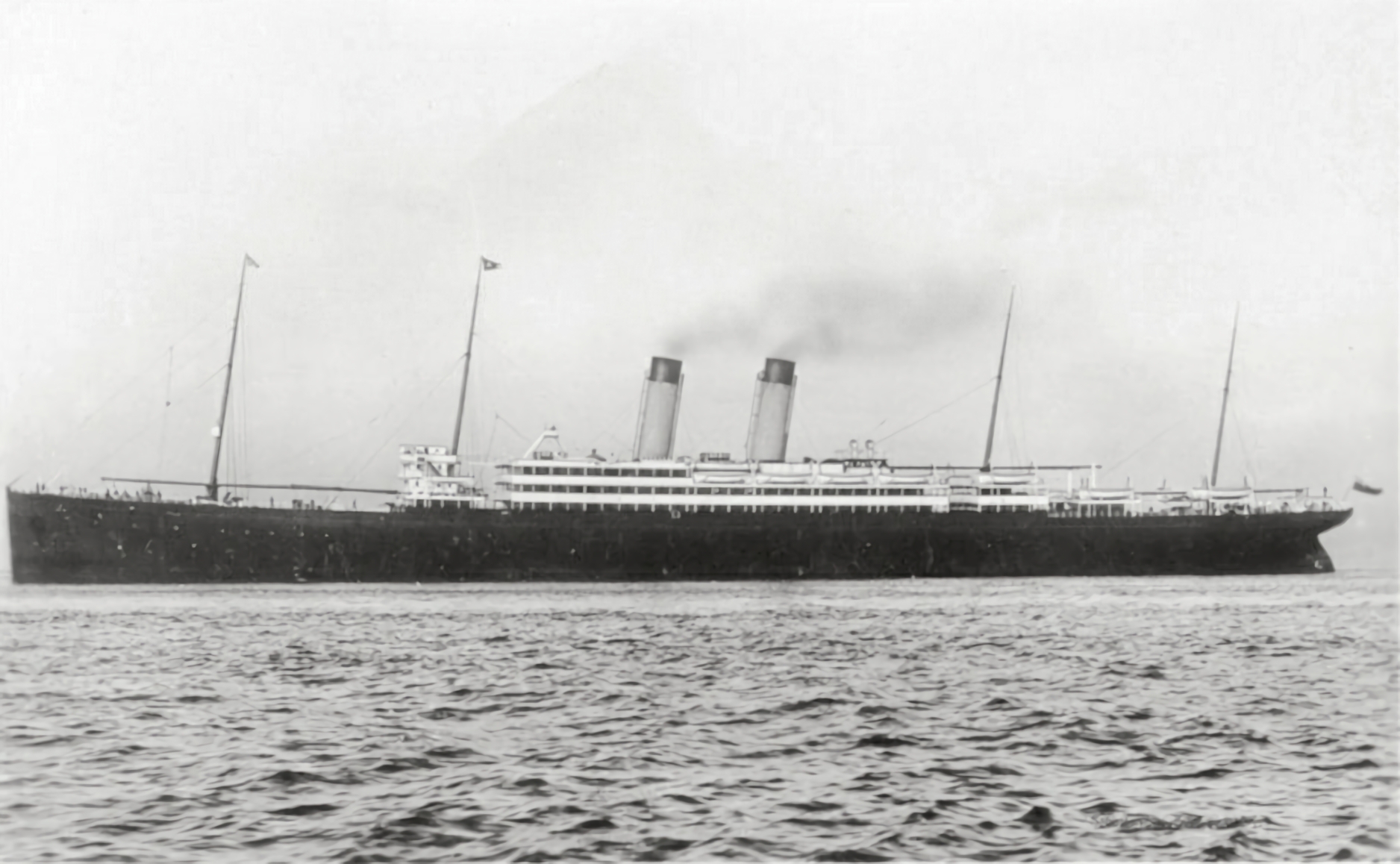
The British passenger liner Cedric of the White Star Lines (same company as the Titanic) photographed during a North Atlantic Route voyage. Picture taken between 1903 and circa 1914. Wikimedia Commons.
On Monday, March 25, 1912, ‘Abdu’l-Bahá leaves the house He has spent the winter in and turns to wave His last farewell to His anxious and worried family, looking down at Him from the veranda. He is 68, has suffered so much and is going to the other side of the world. But there are no doubts in 'Abdu'l-Bahá's mind as He strides through the garden gate without looking back.
Trailed by about thirty silent believers, following behind Him, 'Abdu'l-Bahá walks several blocks towards the shore and takes the electric tram to Alexandria and the Cedric. 'Abdu'l-Bahá boards the steamship with Shoghi Effendi; His personal attendants, Siyyid Asadu'lláh-i-Qumí and Áqá Khusraw (who was of Burmese origin); His secretaries, Mírzá Maḥmúd-i-Zarqání and Mírzá Munír-i-Zayn; His translator, Dr. Amínu'lláh Faríd. And 'Abdu'l-Bahá is off to America!
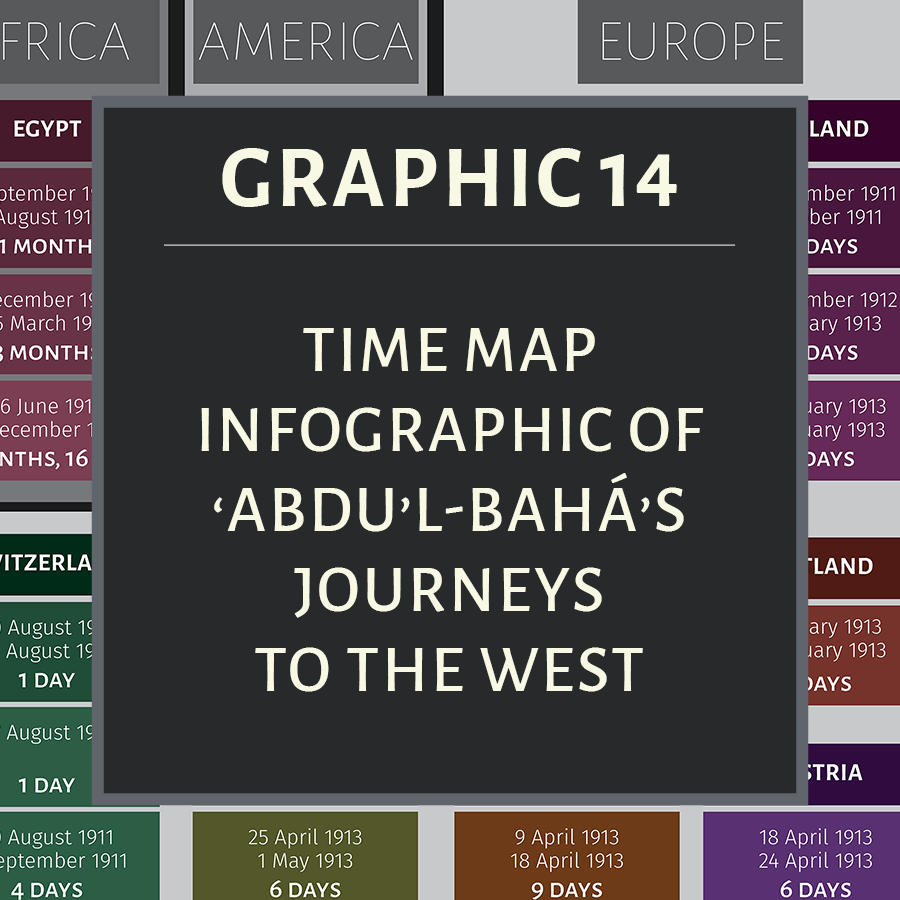
Time map infographic of each stay by ‘Abdu’l-Bahá in the ten countries ‘Abdu’l-Bahá visited during His Journeys to the West. Each stay is indicated by dates which correspond to the Timeline of His Journeys and have been gleaned over several months from Tablets, letters from the House of Justice, books, articles, pilgrim notes, footnotes, passing mentions and chronologies too numerous to cite or mention. This website was used in calculating duration between dates. A map of the total amount of time spent by ‘Abdu’l-Bahá in each country is available here. Original graphic by Violetta Zein.
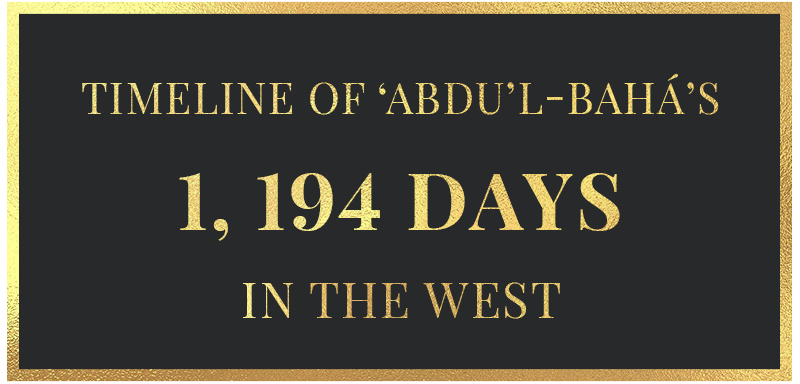
29 August 1910: ‘Abdu'l-Bahá Departs for His Journeys to the West
1 September 1910 (est) - 1 October 1910: Port Said
The date of 1 september 1910 is, we believe a very exact estimate of the date of the arrival of 'Abdu'l-Bahá in Egypt. From a letter of the Universal House of Justice dated 29 August 2010, we know that Abdu’l-Bahá leaves Haifa on 29 August 1910, The steamer journey takes two full days from Haifa to Port Said not counting departure and arrival days, so that would put 'Abdu'l-Bahá's arrival on September 1, 1912. which is corroborated by all the reports of His arrival in Egypt "in September," When 'Abdu'l-Bahá leaves Egypt on 2 December 1913, He arrives in Haifa on 5 December 1913, the same amount of travel time.
1 October 1910 - May 1911: Ramleh and Alexandria
Early May 1911: Cairo
11 August 1911: Alexandria
16 - 20 August 1911: Marseille
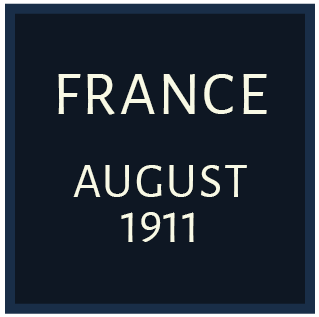
20 - 21 August 1911: Geneva, Switzerland
21 -27 August 1911: Thonon-les-bains
- 27 August 1911: 'Abdu'l-Bahá speaks about The oneness of humanity and of religions in Thonons-les-Bains
27 August 1911: Vevey, Switzerland
27 - 30 August 1911: Thonon-les-bains
30 August - 3 September 1911: Geneva
4 - 9 September 1911: London, England
- 4 September 1911: Notes of Conversations: The Arrival in London
- 5 September 1911: 'Abdu'l-Bahá is interviewed by the editor of The Christian Commonwealth, Mr Albert Dawson, and later meets with the Rev R. J. Campbell
- 8 September 1911: Discourse given at Miss E. J. Rosenberg’s Unity Meeting, in London
- 9 September 1911: The small house and the path to true happiness at the home of Alice Buckton in London
9 September 1911: Byfleet, England
- 9 September 1911: Notes of Conversations: At Byfleet
10 - 22 September: London, England
- 10 September 1911: Address given by ‘Abdu’l-Bahá at the City Temple in London
- 12 September 1911: A Heavenly Meeting: a meeting of the friends at the home of Mrs. Thornburgh-Cropper in London
- 13 September 1911: Discourse at Mrs. Thornburgh-Cropper’s, in London
- 13 September 1911: Persian-English friendship and a brief history: a meeting of the friends at the home of Mrs. Thornburgh-Cropper in London
- 14 September 1911: 'Abdu’l-Bahá sends greetings to the Theosophical Society: a meeting at the office of the Editor-in-chief of the Journal of the Freemasons and Theosophists, in London
- 17 September 1911: Discourse of ‘Abdu’l-Bahá at St. John’s, Westminster in London
- 22 September 1911: Discourse by ‘Abdu’l-Bahá given at the Unity Meeting of Misses Jack and Herrick
23 - 25 September 1911: Bristol, England
- 23-25 September 1911: Notes on Conversations: The visit to Bristol, written by by Tudor Pole
- 23 September 1911: Some of the Experiences of His Forty Years Imprisonment (From an Interview given by ‘Abdu’l-Bahá to the Weekly Budget)
25 September - 3 October 1911: London, England
- 28 September 1911: Notes of Conversations: Spiritual Relationship
28 - 29 September 1911: Vanners, England
29 September - 3 October 1911: London, England
- 29 September 1911: Meeting of Farewell to ‘Abdu’l-Bahá. Reprinted by kind permission, from the Christian Commonwealth, in London
- 29 September 1911: A Message from ‘Abdu’l-Bahá Written for The Christian Commonwealth
- 30 September 1911: Discourse of ‘Abdu’l-Bahá given at the Theosophical Head Quarters
- 1 October 1911: Notes on Conversations: A Bahá’í Wedding, in London
- 2 October 1911: Visit to the Lord Mayor
- 3 October 1911: Eleven essentials: the Bahai principles as taught by Abdu’l-Baha in London
- 3 October 1911: The Farewell
4 October - 2 December 1911: Paris
- 5 October 1911: The Holy Spirit is the source of Life: a talk given at the home of Edith and Margaret Sanderson in Paris
- 16 & 17 October 1911: The Duty of Kindness and Sympathy towards Strangers and Foreigners
- 18 October: The Power and Value of True Thought Depend upon Its Manifestation in Action
- 19 October 1911: God Is the Great Compassionate Physician Who Alone Gives True Healing
- 20 October 1911: The Need for Union between the Peoples of the East and West
- 20 October 1911, in the evening: God Comprehends All; He Cannot Be Comprehended
- 21 October 1911: The Pitiful Causes of War, and the Duty of Everyone to Strive for Peace
- 22 October 1911: The Sun of Truth
- 23 October 1911: The Light of Truth Is Now Shining upon the East and the West
- 24 October 1911: The Universal Love
- 25 October 1911: The Imprisonment of ‘Abdu’l‑Bahá at 4, Avenue de Camoëns
- 26 October 1911: God’s Greatest Gift to Man
- 27 October 1911, in the morning: The Clouds That Obscure the Sun of Truth at 4, Avenue de Camoëns
- 27 October 1911: Religious Prejudices
- 27 October 1911: The Benefits of God to Man at 4, Avenue de Camoëns
- 28 October 1911: Beauty and Harmony in Diversity
- 30 October 1911: The True Meaning of the Prophecies Concerning the Coming of Christ
- 31 October 1911: The Holy Spirit, the Intermediary Power between God and Man at 4, Avenue de Camoëns
- 1 November 1911: The Two Natures in Man
- 2 November 1911: Material and Spiritual Progress
- 3 November 1911: The Evolution of Matter and Development of the Soul
- 4 November 1911: The Spiritual Meetings in Paris
- 5 November 1911: The Two Kinds of Light and Spiritual Aspiration in the West
- 6 November 1911: Lecture Given at a Studio in Paris
- 7 November 1911: Bahá’u’lláh
- 8 November 1911: Good Ideas Must Be Carried into Action
- 9 November 1911: The True Meaning of Baptism by Water and Fire
- 9 November 1911: Discourse at “l’Alliance Spiritualiste”, in the Salle de l’Athénée, St. Germain, Paris
- 10 November 1911: The First Principle—Search after Truth at 4, Avenue de Camoëns
- 10 November 1911: The Evolution of the Spirit
- 11 November 1911: The Second Principle—The Unity of Mankind
- 12 November 1911: The Fourth Principle—The Acceptance of the Relation between Religion and Science at 4, Avenue de Camoëns
- 13 November 1911: The Fifth Principle—The Abolition of Prejudices at 4, Avenue de Camoëns
- No date given: The Sixth Principle—Means of Existence at 4, Avenue de Camoëns
- No date given: The Seventh Principle—Equality of Men
- No date given: The Eighth Principle—Universal Peace at 4, Avenue de Camoëns
- 14 November 1911: The Tenth Principle—Equality of Sex at 4, Avenue de Camoëns
- 15 November 1911: The Desires and Prayers of ‘Abdu’l‑Bahá
- 17 November 1911, in the morning: Concerning Body, Soul and Spirit at 4, Avenue de Camoëns
- 17 November 1911: The Ninth Principle—The Noninterference of Religion with Politics at 4, Avenue de Camoëns
- 18 November 1911: The Eleventh Principle—The Power of the Holy Spirit at 4, Avenue de Camoëns
- 18 November 1911, in the evening: Involvement of the faithful in political life, and showing justice in all walks of life: in the home of Monsieur Dreyfus, Paris
- 19 November 1911: The Bahá’ís Must Work with Heart and Soul to Bring About a Better Condition in the World
- 19 November 1911: Opposition and its beneficial effects
- 20 November 1911: On Calumny
- 21 November 1911: There Can Be No True Happiness and Progress without Spirituality
- 22 November 1911: Pain and Sorrow
- 23 November 1911: The Perfect Human Sentiments and Virtues
- 23 November 1911: The Italian attack on Tripoli, and human heartlessness: a talk given at Abdu’l-Baha’s lodgings in Paris during the war between Italy and Tripoli
- 24 November 1911: The Cruel Indifference of People towards the Suffering of Foreign Races
- 25 November 1911: We Must Not Be Discouraged by the Smallness of Our Numbers
- 26 November 1911: Words Spoken by ‘Abdu’l‑Bahá in Pastor Wagner’s Church (Foyer de l’Ame) in Paris
- No date given: Talk at the Theosophical Society, Paris
- 28 November 1911: This Great and Glorious Cause at 4, Avenue de Camoëns
- 1 December 1911: The Last Meeting at 15 Rue Greuze, Paris
3 - 7 December 1911: Marseille
12 December 1911 - 25 March 1912: Alexandria and Ramleh
28 - 30 March 1912: Naples, Italy
11 - 20 April 1912: New York City
- 11 April 1912: Talk at Home of Mr. and Mrs. Edward B. Kinney - 780 West End Avenue, New York
- 12 April 1912: Talk at Home of Mr. and Mrs. Howard MacNutt - 935 Eastern Parkway, Brooklyn, New York
- 12 April 1912: Talk at Studio of Miss Phillips - 39 West Sixty-seventh Street, New York
- 13 April 1912: Talk at Home of Mr. and Mrs. Alexander Morten - 141 East Twenty-first Street, New York
- 14 April 1912: Talk at Church of the Ascension - Fifth Avenue and Tenth Street, New York
- 14 April 1912: Talk at Union Meeting of Advanced Thought Centers - Carnegie Lyceum, West Fifty-seventh Street, New York
- 15 April 1912: Talk at Home of Mountfort Mills - 327 West End Avenue, New York
- 16 April 1912: Talk at Hotel Ansonia to Bahá’í Friends of New Jersey - Broadway and Seventy-third Street, New York
- 17 April 1912: Talk at Hotel Ansonia - Broadway and Seventy-third Street, New York
- 17 April 1912: Talk at Home of Mr. and Mrs. Edward B. Kinney - (Same as above)
- 18 April 1912: Talk at Home of Mr. and Mrs. Marshall L. Emery - 273 West Ninetieth Street, New York
- 19 April 1912: Talk at Earl Hall - Columbia University, New York
- 19 April 1912: Talk at Bowery Mission - 227 Bowery, New York
20 - 28 April 1912: Washington D.C.
- 20 April 1912: Talk at Orient-Occident-Unity Conference - Public Library Hall, Washington, D.C.
- 21 April 1912: Talk at Studio Hall - 1219 Connecticut Avenue, Washington, D.C.
- 21 April 1912: Talk at Universalist Church - Thirteenth and L Streets, Washington, D.C.
- 22 April 1912: Talk at Home of Mr. and Mrs. Arthur J. Parsons - 1700 Eighteenth Street, NW, Washington, D.C.
- 23 April 1912: Talk at Howard University - Washington, D.C.
- 23 April 1912: Talk at Home of Mr. and Mrs. Arthur J. Parsons - (Same as above)
- 23 April 1912: Talk to Bethel Literary Society - Metropolitan African Methodist Episcopal Church, M Street, NW, Washington, D.C.
- 24 April 1912: Talk at Children’s Reception - Studio Hall, 1219 Connecticut Avenue, Washington, D.C.
- 24 April 1912: Talk at Home of Mr. and Mrs. Arthur J. Parsons - (Same as above)
- 24 April 1912: Talk at Home of Mrs. Andrew J. Dyer - 1937 Thirteenth Street, NW, Washington, D.C.
- 25 April 1912: Talk to Theosophical Society - Home of Mr. and Mrs. Arthur J. Parsons - (Same as above)
- 25 April 1912: Message to Esperantists - Home of Mr. and Mrs. Arthur J. Parsons - (Same as above)
- 25 April 1912: Talk at Home of Mr. and Mrs. Arthur J. Parsons - (Same as above)
29 April - 1 May 1912: Chicago, Illinois
- 30 April 1912: Talk at Public Meeting Concluding Convention of Bahá’í Temple Unity Drill Hall, Masonic Temple, Chicago, Illinois
- 30 April 1912: Talk at Hull House, Chicago, Illinois
- 30 April 1912: Talk at Fourth Annual Conference of the National Association for the Advancement of Colored People at Handel Hall, Chicago, Illinois
1 May 1912: Wilmette, Illinois
- 1 May 1912: Talk at Dedication of the Mashriqu’l-Adhkár Grounds, Wilmette, Illinois
2 - 3 May 1912: Chicago, Illinois
- 2 May 1912: Talk at Hotel Plaza in Chicago, Illinois
- 2 May 1912: Talk to Federation of Women’s Clubs at the Hotel La Salle, Chicago, Illinois
- 2 May 1912: Talk at Bahá’í Women’s Reception at the Hotel La Salle, Chicago, Illinois
- 2 May 1912: Talk at Hotel Plaza in Chicago, Illinois
- 2 May 1912: Talk at Hotel Plaza in Chicago, Illinois
- 3 May 1912: Talk at Hotel Plaza in Chicago, Illinois
- 3 May 1912: Talk at Hotel Plaza in Chicago, Illinois
4 May 1912: Evanston, Illinois
- 4 May 1912: Talk to Theosophical Society at Northwestern University Hall, Evanston, Illinois
5 May 1912: Chicago, Illinois
- 5 May 1912: Talk at Children’s Meeting at the Hotel Plaza in Chicago, Illinois
- 5 May 1912: Talk at Plymouth Congregational Church on 935 East Fiftieth Street in Chicago, Illinois
- 5 May 1912: Talk at All-Souls Church in Lincoln Center, Chicago, Illinois
6 May 1912: Cleveland, Ohio
- 6 May 1912: Talk at Euclid Hall in Cleveland, Ohio
- 6 May 1912: Talk at Sanatorium of Dr. C. M. Swingle in Cleveland, Ohio
7 May 1912: Pittsburgh, Pennsylvania
- 7 may 1912: Talk at Hotel Schenley in Pittsburgh, Pennsylvania
8 May 1912: Washington D.C.
11 May 1912: New York City
- 11 May 1912: Talk at 227 Riverside Drive, New York
12 May 1912: Montclair, New Jersey
- 12 May 1912: Talk at Unity Church in Montclair, New Jersey
12 May 1912: New York City
- 12 May 1912: Talk at Meeting of International Peace Forum at Grace Methodist Episcopal Church, West 104th Street, New York
- 13 May 1912: Talk at Reception by New York Peace Society at the Hotel Astor, New York
14 - 16 May 1912: New Paltz, New York
- 15 May 1912: The Oneness of the Reality of Humankind, address at the Lake Mohonk Conference on International Arbitration
17 - 19 May 1912: New York City
- 19 May 1912: Talk at Church of the Divine Paternity at Central Park West, New York
19 May 1912: Jersey City, New Jersey
- 19 May 1912: Talk at Brotherhood Church at Bergen and Fairview Avenues, Jersey City, New Jersey
20 May 1912: New York City
- 20 May 1912: Talk at Woman’s Suffrage Meeting at the Metropolitan Temple, Seventh Avenue and Fourteenth Street, New York
21 - 22 May 1912: Boston, Massachusetts
- 22 May 1912: Talk at the Tremont Temple at the Unitarian Conference in Boston, Massachusetts
23 May 1912: Cambridge, Massachusetts
- 23 May 1912: Talk at Home of Mr. and Mrs. Francis W. Breed at 367 Harvard Street, Cambridge, Massachusetts
23 May 1912: Worcester, Massachusetts
25 - 26 May 1912: Boston, Massachusetts
- 25 May 1912: Huntington Chambers in Boston, Massachusetts
26 - 30 May 1912: New York City
- 26 May 1912: Talk at Mount Morris Baptist Church on Fifth Avenue and 126th Street, New York
- 28 May 1912: Talk at Reception at Metropolitan Temple on Seventh Avenue and Fourteenth Street, New York
- 29 May 1912: Talk at Home of Mr. and Mrs. Edward B. Kinney at 780 West End Avenue, New York
- 30 May 1912: Talk at Theosophical Lodge on Broadway and Seventy-ninth Street, New York
31 May - 1 June 1912: Fanwood, New Jersey
- 31 may 1912: Talk at Town Hall in Fanwood, New Jersey
2 June 1912: New York City
- 2 June 1912: Talk at Church of the Ascension on Fifth Avenue and Tenth Street, New York
3 June 1912: Milford, Pennsylvania
3 June 1912: Philadelphia, Pennsylvania
5 - 8 June 1912: New York City
- 8 June 1912: Talk at 309 West Seventy-eighth Street, New York
9 June 1912: Philadelphia, Pennsylvania
- 9 June 1912: Talk at Unitarian Church on Fifteenth Street and Girard Avenue, Philadelphia, Pennsylvania
- 9 June 1912: Talk at Baptist Temple on Broad and Berks Streets, Philadelphia, Pennsylvania
10 - 20 June: New York City
- 11 June 1912: Talk at Open Committee Meeting at the home of Mr. and Mrs. Edward B. Kinney, 780 West End Avenue, New York
- 12 June 1912: Talk at 309 West Seventy-eighth Street, New York
- 15 June 1912: Talk at 309 West Seventy-eighth Street, New York
15 - 16 June 1912: Brooklyn, New York
- 16 June 1912: Talk at Fourth Unitarian Church on Beverly Road, Flatbush, Brooklyn, New York
- 16 June 1912: Talk at Home of Mr. and Mrs. Howard MacNutt at 935 Eastern Parkway, Brooklyn, New York
- 16 June 1912: Talk at Central Congregational Church on Hancock Street, Brooklyn, New York
17 - 20 June 1912: New York City
- 17 June 1912: Talk at 309 West Seventy-eighth Street, New York
- 18 June 1912: Talk at 309 West Seventy-eighth Street, New York
- 20 June 1912: Talk at 309 West Seventy-eighth Street, New York
21 – 27 June 1912: Montclair, New Jersey
- 23 June 1912: Talk at Montclair, New Jersey
28 – 29 June 1912: West Englewood, New Jersey (Now called Teaneck)
- 29 June 1912: Talk at Unity Feast, Outdoors in West Englewood, New Jersey
29 June 1912: Morristown, New Jersey
30 June – 13 July 1912: New York City
- 1 July 1912: Talk at 309 West Seventy-eighth Street, New York
- 1 July 1912: Talk at 309 West Seventy-eighth Street, New York (different talk)
- 5 July 1912: Talk at 309 West Seventy-eighth Street, New York
- 5 July 1912: Talk at 309 West Seventy-eighth Street, New York (different talk)
- 6 July 1912: Talk at 309 West Seventy-eighth Street, New York
14 July 1912: Brooklyn, New York
15 - 16 July 1912: West Englewood, New Jersey (Now called Teaneck)
16 - 22 July 1912: New York City
- 14 July 1912: Talk at All Souls Unitarian Church on Fourth Avenue and Twentieth Street, New York
- 15 July 1912: Talk at Home of Dr. and Mrs. Florian Krug at 830 Park Avenue, New York
23 – 25 July 1912: Boston, Massachusetts
- 23 July 1912: Talk at Hotel Victoria in Boston, Massachusetts
- 24 July 1912: Talk to Theosophical Society at The Kensington on Exeter and Boylston Streets, Boston, Massachusetts
- 25 July 1912: Talk at Hotel Victoria in Boston, Massachusetts
25 July – 16 August: Dublin, New Hampshire
- 5 August 1912: Talk at Dublin Inn in Dublin, New Hampshire
- 6 August 1912: Talk at Home of Mr. and Mrs. Arthur J. Parsons in Dublin, New Hampshire
16 – 23 August 1912: Green Acre in Eliot, Maine
- 16 August 1912: Talk at Green Acre in Eliot, Maine
- 17 August 1912: Talk at Green Acre in Eliot, Maine
- 17 August 1912: Talk at Green Acre in Eliot, Maine (different talk)
- 17 August 1912: Talk at Green Acre in Eliot, Maine (different talk)
- 17 August 1912: Talk at Green Acre in Eliot, Maine (different talk)
24 - 29 August 1912: Malden, Massachusetts with talks in Boston, Massachusetts
- 24 August 1912: Arrival in Malden, Massachusetts
- 25 August 1912: Talk at the New Thought Forum at the Metaphysical Club in Boston, Massachusetts
- 26 August 1912: Talk at Franklin Square House in Boston, Massachusetts
- 27 August 1912: Talk at Metaphysical Club in Boston, Massachusetts
- 29 August 1912: Talk at Home of Madame Morey at 34 Hillside Avenue, Malden, Massachusetts
30 August - 9 September 1912: Montreal
- 1 September 1912: Talk at Church of the Messiah in Montreal, Canada
- 1 September 1912: Talk at Home of Mr. and Mrs. William Sutherland Maxwell at 716 Pine Avenue West, Montreal, Canada
- 1 September 1912: Talk at Home of Mr. and Mrs. William Sutherland Maxwell (different talk)
- 2 September 1912: Talk at Home of Mr. and Mrs. William Sutherland Maxwell
- 3 September 1912: ‘Abdu’l‑Bahá’s address to Socialists and Labor leaders in Coronation Hall in Montreal, Canada
- 5 September 1912: Talk at St. James Methodist Church in Montreal, Canada
9 - 12 September 1912: Buffalo, New York
- 10 September 1912: Niagara Falls
12 - 15 September 1912: Chicago, Illinois
15 - 16 September 1912: Kenosha, Wisconsin
16 - 18 September 1912: Chicago, Illinois
- 16 September 1912: Talk at Home of Mrs. Corinne True at 5338 Kenmore Avenue, Chicago, Illinois
19 - 20 September 1912: Minneapolis, Minnesota
- 20 September 1912: Talk at Home of Mr. Albert L. Hall at 2030 Queen Avenue South, Minneapolis, Minnesota
20 September 1912: Saint Paul, Minnesota
- 20 September 1912: Talk at Home of Dr. and Mrs. Clement Woolson at 870 Laurel Avenue, St. Paul, Minnesota
21 - 22 September 1912: Omaha, Nebraska
23 September 1912: Lincoln, Nebraska
24 -27 September 1912: Denver, Colorado
- 24 September 1912: Talk at Home of Mrs. Sidney E. Roberts in Denver, Colorado
- 25 September 1912: Talk at Second Divine Science Church at 3929 West Thirty-eighth Avenue, Denver, Colorado
28 September 1912: Glenwood Springs, Colorado
29 September - 1 October 1912: Salt Lake City, Utah
3 - 7 October 1912: San Francisco, California
7 October 1912: Oakland, California
- 7 October 1912: Talk to Japanese Young Men’s Christian Association at the Japanese Independent Church, Oakland, California
8 October 1912: Palo Alto, California
- 8 October 1912: Talk at Leland Stanford Junior University in Palo Alto, California
10 - 12 October 1912: San Francisco, California
- 10 October 1912: Talk at Open Forum in San Francisco, California
- 12 October 1912: Talk at Temple Emmanu-El at 450 Sutter Street, San Francisco, California
13 -16 October 1912: Pleasanton, California
16 -18 October 1912: San Francisco, California
18 -19 October 1912: Los Angeles, California
19 October 1912: Inglewood, California
19 - 21 October 1912: Los Angeles, California
21 -25 October 1912: San Francisco, California
25 -27 October 1912: Sacramento, California
- 25 October 1912: Talk at Hotel Sacramento in Sacramento, California
- 26 October 1912: Talk at Assembly Hall, Hotel Sacramento in Sacramento, California
28 October 1912: Salt Lake City, Utah
29 October 1912: Denver, Colorado
31 October - 4 November 1912: Chicago, Illinois
- 31 October 1912: Talk at Hotel Plaza in Chicago, Illinois
- 1 November 1912: Talk at Home of Mrs. Corinne True at 5338 Kenmore Avenue, Chicago, Illinois
4 - 5 November 1912: Cincinnati, Ohio
- 5 November 1912: Talk at Grand Hotel in Cincinnati, Ohio
6 - 11 November 1912: Washington, D.C.
- 6 November 1912: Talk at Universalist Church at Thirteenth and L Streets, NW, Washington, D.C.
- 7 November 1912: Talk at Home of Mr. and Mrs. Arthur J. Parsons at 1700 Eighteenth Street, NW, Washington, D. C.
- 8 November 1912: Talk at Eighth Street Temple, Synagogue in Washington, D. C.
- 9 November 1912: Talk at Home of Mr. and Mrs. Arthur J. Parsons
- 9 November 1912: Talk at Home of Mr. and Mrs. Arthur J. Parsons (different talk)
- 9 November 1912: Talk at Bahá’í Banquet at Rauscher’s Hall, Washington, D. C.
- 10 November 1912: Talk at Home of Mr. and Mrs. Arthur J. Parsons
- 10 November 1912: Talk at Home of Mr. and Mrs. Joseph H. Hannen at 1252 Eighth Street, NW, Washington, D. C.
- 10 November 1912: Talk at 1901 Eighteenth Street, NW, Washington, D. C.
11 November 1912: Baltimore, Maryland
12 - 23 November 1912: New York City
- 15 November 1912: Talk at Home of Miss Juliet Thompson at 48 West Tenth Street, New York
- 16 November 1912: Talk at 309 West Seventy-eighth Street in New York City
- 17 November 1912: Talk at Genealogical Hall at 252 West Fifty-eighth Street, New York
- 18 November 1912: Talk at Home of Mr. and Mrs. Frank K. Moxey at 575 Riverside Drive, New York
23 November 1912: Montclair, New Jersey
23 November - 5 December 1912: New York City
- 23 November 1912: Talk at Banquet at the Great Northern Hotel on 118 West Fifty-seventh Street, New York
- 29 November 1912: Talk at Home of Mr. and Mrs. Edward B. Kinney at 780 West End Avenue, New York
- 2 December 1912: Talk at Home of Mr. and Mrs. Edward B. Kinney
- 2 December 1912: Talk at Home of Mr. and Mrs. Edward B. Kinney (different talk)
- 3 December 1912: Talk at Home of Dr. and Mrs. Florian Krug at 830 Park Avenue, New York
- 3 December 1912: Talk to Mr. Kinney’s Bible Class at 780 West End Avenue, New York
- 3 December 1912: Talk at Home of Mr. and Mrs. Edward B. Kinney
- 4 December 1912: Talk to Theosophical Society at 2228 Broadway, New York
- 5 December 1912: Talk on Day of Departure On Board Steamship Celtic, New York
13 - 16 December 1912: Liverpool, England
- 13 December 1912: 'Abdu'l-Bahá arrives in Liverpool on the Celtic and stays and the Adelphi Hotel
- 14 December 1912: 'Abdu'l-Bahá addresses the Theosophical Society, Liverpool at 8.00pm
- 15 December 1912: 'Abdu'l-Bahá addresses the congregation at Pembroke Chapel Baptist Church.
- 16 December 1912: 'Abdu'l-Bahá travels to London by train
16 - 31 December 1912: London, England
- 17 December 1912: 'Abdu'l-Bahá attends a a large reception held in at Caxton Hall, at that time Town Hall for the City of Westminster,
- 18 December 1912: In the morning, 'Abdu'l-Bahá gives a talk at 97 Cadogan Gardens on ‘The Spiritual Worlds’.
- 20 December 1912: 'Abdu'l-Bahá speaks at the Westminster Palace Hotel
- 26 December 1912: 'Abdu'l-Bahá answers questions from guests gathered at 97 Cadogan Gardens, including:
- 27 December 1912: Lady Blomfield held a reception, and 'Abdu'l-Bahá speaks of the meeting of the East and the West
- 29 December 1912: King's Weigh House Chapel in London: an evening meeting at the King’s Weighhouse Congregational Church at the corner of Weighhouse Street and Duke Street, London
31 December 1912: Oxford, England
- 31 December 1912: 'Abdu'l-Bahá visits Oxford to address a meeting at Manchester College
1 - 6 January 1913: London, England
- 1 January 1913: 'Abdu'l-Bahá addresses the friends gathered at Lady Blomfield, home at 97 Cadogan Gardens
- 2 January 1913: In the evening, 'Abdu'l-Bahá addressed The Women’s Freedom League at Essex Hall.
- 4 January 1913: 'Abdu'l-Bahá gives a talk on "The Four Kinds of Love" at Lady Blomfield, home at 97 Cadogan Gardens
- 5 January 1913: Despite not feeling well, 'Abdu'l-Bahá speaks at a meeting organised by Elizabeth Herrick in the evening
- 6 January 1913: 'Abdu'l-Bahá travels to Edinburgh by train
6 - 10 January 1913: Edinburgh, Scotland
- 7 January 1913: 'Abdu'l-Bahá addresses the Esperanto Society in Edinburgh
- 8 January 1913: 'Abdu'l-Bahá gives a talk in the afternoon
- 9 January 1913: 'Abdu'l-Bahá speaks at the Manse in the afternoon
- 9 January 1913: 'Abdu'l-Bahá addresses the Theosophical Society at 28 Great King Street in the evening
- 10 January 1913: 'Abdu'l-Bahá leaves Edinburgh for London, by train
10 - 15 January 1913: London, England
- 11 January 1913: 'Abdu'l-Bahá addresses a meeting at Caxton Hall in London
- 12 January 1913: 'Abdu'l-Bahá addresses a Quaker meeting at the Friends’ Meeting House, St. Martin’s Lane, London, W.C.
- 12 January 1913: 'Abdu'l-Bahá addresses the New Congregational Church in Woolwich in the evening
- 13 January 1913: 'Abdu'l-Bahá addresses the Peace Society at Caxton Hall
- 15 January 1913: 'Abdu'l-Bahá travels to Bristol by train
15 - 16 January 1913: Bristol, England
- 15 January 1913: 'Abdu'l-Bahá arrives in Bristol and stays at Major Tudor Pole's House, the Clifton Guest House
- 16 January 1913: 'Abdu'l-Bahá returns to London by train
16 -17 January 1913: London, England
- 16 January 1913: 'Abdu'l-Bahá addresses an audience at Lady Blomfield's home at 97 Cadogan Gardens in the afternoon
17 January 1913: Woking, England
- 17 January 1913: 'Abdu'l-Bahá visits a mosque in Woking, England
18 - 21 January 1913: London, England
- 19 January 1913: 'Abdu'l-Bahá addresses members of the ‘Higher Thought’ movement in London
- 21 January 1913: 'Abdu'l-Bahá leaves England for France from Victoria Station
21 January - 1 April 1913: Paris, France
- 12 February 1913: ʻAbdu’l-Bahá addresses the Paris Esperanto Group at a special banquet in His honor
- 13 February 1913: ʻAbdu’l-Bahá gives an address on the various forms of life, the outpourings of divine grace, and the momentousness of this age at the headquarters of the Theosophical Society of France
- 21 February 1913: ʻAbdu’l-Bahá gives an address to the Alliance Spiritualiste on peace, unity, and human brotherhood at the hall of the Union Chrétienne de Jeunes Gens, the French name for the YMCA
- 31 March 1913: ʻAbdu’l-Bahá leaves France for Germany
1 - 4 April 1913: Stuttgart, Germany
- 1 April 1913: ʻAbdu’l-Bahá arrives by train from France
- 3 April 1913: ʻAbdu’l-Bahá speaks at the Bürgermuseum (the People's Museum) in Stuttgart
4 April 1913: Esslingen, Germany
- 4 April 1913: ʻAbdu’l-Bahá attends and speaks at a children's party organized by the Bahá'í friends in Esslingen
4 - 7 April 1913: Stuttgart, Germany
- 6 April 1913: ʻAbdu’l-Bahá speaks at the Oberen Museum (the Upper Museum) in Stuttgart
7 April 1913: Bad Mergentheim
- 7 April 1913: ʻAbdu’l-Bahá travels to Bad Mergentheim where he visits the Kurhaus and the Kurpark
7 - 8 April 1913: Stuttgart, Germany
- 8 April 1913: ʻAbdu’l-Bahá leaves Stuttgart by train for Budapest, Hungary
8 April 1913: Vienna, Austria
- 8 April 1913: ʻAbdu’l-Bahá speaks to a group of Bahá'ís in Vienna, Austria while changing trains en route to Budapest, Hungary
9 - 18 April 1913: Budapest, Hungary
- 9 APril 1913: 'Abdu'l-Bahá arrives in Budapest, Hungary by train and stays at the Hotel Ritz
- 10 April 1913: ʻAbdu’l-Bahá gives a talk about the the nature of divine and material civilization to a meeting of the Theosophists
- 11 April 1913: Utterly fatigued, ʻAbdu’l-Bahá nonetheless gives a talk at the Parliament Hall on the oneness of humanity
- 11 April 1913: ʻAbdu’l-Bahá gives a talk on the "Qualities of the Great Educator" to a large delegation of Theosophists in the Hotel Ritz
- 12 April 1913: ʻAbdu’l-Bahá speaks to a meeting of the Theosophical Society on the life of Bahá'u'lláh
- 14 April 1913: ʻAbdu’l-Bahá is invited by Alajos Paikert, one of the leaders of the Turanian Society, to give a talk at the Hungarian National Museum, Múzeum krt. 14-16
- 18 April 1913: ʻAbdu’l-Bahá leaves Budapest for Vienna, Austria by train
18 -24 April 1913: Vienna, Austria
- 19 April 1913: ʻAbdu’l-Bahá speaks at a gathering of Theosophists held at the home of Professor Lajos Thern
- 21 April 1913: ʻAbdu’l-Bahá speaks at the Theosophical Society lodge, where He discusses the divine verses, the complete bonds that exist between all things, and other subjects
- 22 April 1913: ʻAbdu’l-Bahá returns to the Theosophical Society lodge to give another talk on the teachings of Baháʼuʼlláh
- 24 April 1913: ʻAbdu’l-Bahá leaves Vienna by train to return to Stuttgart, Germany
24 - 30 April 1913: Stuttgart, Germany
- 24 April 1913: ʻAbdu’l-Bahá arrives in Stuttgart by train from Vienna, Austria
- 25 April 1913: ʻAbdu’l-Bahá speaks at the Bürgermuseum (the People's museum), for a second time, in Stuttgart
30 April 1913: Bebenhausen, Germany
- 30 April 1913: ʻAbdu’l-Bahá visits the royal hunting lodge in the village of Bebenhausen, near Tübingen
30 April - 1 May 1913: Stuttgart, Germany
- 1 May 1913: ʻAbdu’l-Bahá addresses the assembled friends who arrive at the train station to bid Him farewell as He leaves to Paris, France by train
2 May - 12 June 1913: Paris, France
- 23 May 1913: After an eventful day, 'Abdu'l-Bahá gives a talk on the advents of the Báb and Baháʼuʼlláh
- 6 June 1913: Ahmed Izzet Pasha, the former Grand Vizier of the Ottoman Empire, gives a dinner party in honor of ‘Abdu’l-Bahá
- 12 June 1913: 'Abdu'l-Bahá leaves Paris for Marseilles, France
12 to 13 June 1913: Marseille, France
- 12 June 1913: 'Abdu'l-Bahá arrives in Marseille by train
- 13 June 1913: 'Abdu'l-Bahá leaves Marseille by steamer on the Himalaya for Port Said
17 June - 11 July 1913: Port Said
- 17 June 1913: 'Abdu'l-Bahá arrives in Port Said on the Himalaya
11 - 17 July 1913: Ismáʻílíyyih
17 July - 13 October 1913: Ramleh, Alexandria
13 - 15 October 1913: Abú qír, Alexandria
15 - 22 October 1913: Ramleh, Alexandria
22 October - 8 November 1913: Alexandria
8 - 16 November 1913: Port Said
- 8 November 1913: 'Abdu'l-Bahá travels by steamer on the SS Jerusalem to Port Said
17 November - 2 December 1913: Ramleh, Alexandria
- 2 December 1913: 'Abdu'l-Bahá starts His voyage home, by boarding the steamer Baron Call to Port Said
2 - 3 December 1913: Port Said
- 2 December 1913: 'Abdu'l-Bahá arrives in Port Said
- 3 December 1913: 'Abdu'l-Bahá leaves Port Said in the evening, aboard the SS Baron Call, headed for Jaffa.
5 December 1913: ‘Abdu'l-Bahá returns from His Journeys to the West
References for Part V
Introduction
Shoghi Effendi, God Passes By: Chapter XIX – ‘Abdu’l‑Bahá’s Travels in Europe and America
‘Abdu’l-Bahá’s Journeys to the West 1910 – 1913: Estimates. of people encountered, talks and cities visited from Earl Redman’s research
Egypt 1910 – 1911
September 1910 – 1 October 1910 – Arrival in Egypt: Savi, Julio. 2013. “‘Abdu’l-Bahá in Egypt: Early September 1910 – 5 December 1913”, page 325.
1 October 1910 – ‘Abdu’l-Bahá almost travels to the Europe: Balyuzi, H.M. ‘Abdu’l-Bahá: The Centre of the Covenant of Bahá’u’lláh, page 136.
October 1910 – Early May 1911 – ‘Abdu’l-Bahá in Ramleh: Balyuzi, H.M. ‘Abdu’l-Bahá: The Centre of the Covenant of Bahá’u’lláh, page 136.
‘Abdu’l-Bahá in Ramleh in the eyes of an eleven-year-old-boy: Yazdi, Ali M. Memories of ‘Abdu’l-Bahá.
Shortly after ‘Abdu’l-Bahá settles in Ramleh – He sends for Shoghi Effendi: Rabbání, Rúḥíyyih. The Priceless Pearl, Chapter 1
Mid-November 1910 – Major Wellesley Tudor Pole: The story of the Glastonbury cup from Wikipedia: Wellesley Tudor Pole, Balyuzi, H.M. ‘Abdu’l-Bahá: The Centre of the Covenant of Bahá’u’lláh, page 138, story of Tammadun’s mission from Bahai Chronicles: Wellesley Tudor Pole.
10 – 16 April 1911 – Louis Gregory comes on pilgrimage: Redman, Earl. ‘Abdu’l-Baha in Their Midst. Kindle Edition and Star of the West Volume 2, Number 10 page 6.
Early May 1911 – Cairo and the first notables: Balyuzi, H.M. ‘Abdu’l-Bahá: The Centre of the Covenant of Bahá’u’lláh, page 138.
11 August 1911 – ‘Abdu’l-Bahá leaves Egypt for Europe: Name of the ship from Jasion, Jan Teofil. ‘Abdu’l-Bahá in France 1911 & 1913.
France August 1911
23 August 1911 – The most extraordinary story of kindness: Date of the meeting from Jan Jasion via email and confirmed by Juliet Thompson in her diary: she says the Ẓillu’s-Sulṭán met ‘Abdu’l-Bahá the day before she arrived, which was August 24, 1911. Details from Thompson, Juliet and Marzieh Gail. The Diary of Juliet Thompson Chapter 3. Details of the role the Ẓillu’s-Sulṭán played in the martyrdom of the King and Beloved of Martyrs from Wikipedia: Núrayn-i-Nayyirayn and from Taherzadeh, Adib. The Revelation of Bahá’u’lláh, Volume 4 (Mazra‘ih & Bahjí, 1877–1892)
24 August 1911 – Unity: Thompson, Juliet and Marzieh Gail. The Diary of Juliet Thompson Chapter 3 with thanks to Gita Baghdadi-Hoogenstraaten for suggesting this story
25 August 1911 – A Prince comes to lunch: Thompson, Juliet and Marzieh Gail. The Diary of Juliet Thompson Chapter 3
28 August 1911 – ‘Abdu’l-Bahá’s first published address in the West: Jasion, Jan Teofil. ‘Abdu’l-Bahá in France 1911 & 1913 pages 44-49, Thompson, Juliet and Marzieh Gail. The Diary of Juliet Thompson Chapter 3 and for the description by the Egyptian journalist for Al-Ahram Cairo newspaper: Al-Ahram issue of 16 September 1910 [sic.] (as mentioned in Dr. Suhail Bushrui’s Arabic book “Abbas Effendi, Commemorating the Centenary of His Visit to Egypt (1910-1913), but the exact date should be 16 September 1911; translation courtesy of Gamal Hassan. With thanks to Gita Baghdadi-Hoogenstraaten for suggesting this story
Switzerland
27 August 1911 – ‘Abdu’l-Bahá visits Vevey: Thompson, Juliet and Marzieh Gail. The Diary of Juliet Thompson Chapter 3.
3 September 1911 – ‘Abdu’l-Bahá leaves for London: Name of the hotel from Redman, Earl. ‘Abdu’l-Baha in Their Midst. Kindle Edition
England September – October 1911
4 September 1911 – 3 October 1911 – ‘Abdu’l-Bahá at 97, Cadogan Gardens: National Spiritual Assembly of the Bahá’ís of the United Kingdom. In the Footsteps of ‘Abdu’l-Bahá Volume I: The Master in the British Isles 4 September 1911 – 3 October 1911 page 6 and Star of the West, Volume II, Number 11.
10 September 1911 – ‘Abdu’l-Bahá speaks in front of a public audience for the first time in His life: Shoghi Effendi, God Passes By. and National Spiritual Assembly of the Bahá’ís of the United Kingdom. In the Footsteps of ‘Abdu’l-Bahá Volume I: The Master in the British Isles 4 September 1911 – 3 October 1911 page 11
17 September 1911 – ‘Abdu’l-Bahá and the Archdeacon of Westminster: ‘Abdu’l-Bahá in London, Addresses and Notes of Conversations page 21 and Shoghi Effendi, God Passes By.
23 & 24 September 1911 – In Bristol with Wellesley Tudor Pole: Sept, 25th. Wellesley Tudor-Pole Star of the West Vol. II No. 12 page 7 and Abdu’l-Bahá in London, Addresses and Notes of Conversations page 81-84.
29 September 1911 – Passmore Edwards Settlement: National Spiritual Assembly of the Bahá’ís of the United Kingdom. In the Footsteps of ‘Abdu’l-Bahá Volume I: The Master in the British Isles 4 September 1911 – 3 October 1911 page 18 and Abdu’l-Bahá in London, Addresses and Notes of Conversations pages 33-36.
2 October 1911 – Breakfast with the Mayor of London: Abdu’l-Bahá in London, Addresses and Notes of Conversations pages 109-110.
Personalities who encountered ‘Abdu’l-Bahá in England and Scotland: Shoghi Effendi, God Passes By.
3 October 1911 – ‘Abdu’l-Bahá leaves London for Paris: Lady Blomfield in The Chosen Highway pp. 174-1755 and Abdu’l-Bahá in London, Addresses and Notes of Conversations page 113.
France October – December 1911
5 October – 2 December 1911 – Paris Talks: Shoghi Effendi, God Passes By and Balyuzi, H.M. ‘Abdu’l-Bahá: The Centre of the Covenant of Bahá’u’lláh pages 159-160.
The unfathomable powers of ‘Abdu’l-Bahá: Balyuzi, H.M. ‘Abdu’l-Bahá: The Centre of the Covenant of Bahá’u’lláh page 168 and ady Blomfield in The Chosen Highway
15 October 1912 – ‘Abdu’l-Bahá and Mr. & Mrs. Ponsonaille: I was made aware fo this story from Redman, Earl. ‘Abdu’l-Baha in Their Midst. Kindle Edition, where I got the fantastic story about the garbanzo beans . The section is based on Star of the West, Volume II, Number 18, page 6
3- 7 December 1911 – In Marseille: Dates, talk on 5 December and name of ship from email correspondence with Jan Jasion dated June 3, 2021
Egypt 1911 – 1912
12 December 1911 – 25 March 1912 – ‘Abdu’l-Bahá winters in Ramleh to prepare for America: Balyuzi, H.M. ‘Abdu’l-Bahá: The Centre of the Covenant of Bahá’u’lláh pages 171-172 and Rabbání, Rúḥíyyih.The Priceless Pearl, Chapter 1, story about Isabella Brittingham from Whitehead, O.Z. Some Early Bahá’ís of the West. pages 135-136. Story about Americans insisting from Mahmúd-i-Zarqání, Mírzá. Mahmúd’s Diary Chronicling ʻAbdu’l-Bahá’s Journey to America. Oxford: George Ronald, 1998 (1913)
Shoghi Effendi accompanies ‘Abdu’l-Bahá to America: Rabbání, Rúḥíyyih.The Priceless Pearl, Chapter 1 and Redman, Earl. ‘Abdu’l-Baha in Their Midst. Kindle Edition
The Titanic vs. the Cedric: For the details on the amount collected and the cable by ‘Abdu’l-Bahá: The Bahá’í World Volume IV (1926 – 1928) – Part Four – Introduction to “The Promulgation of Universal Peace” by Howard McNutt page 220 other details: Balyuzi, H.M. ‘Abdu’l-Bahá: The Centre of the Covenant of Bahá’u’lláh pages 171-172. Note: Balyuzi quotes the amount collected as 13,200 sterling, which would amount to close to 1.5 million dollars today. The amount collected was in the United States, Howard McNutt was an American Bahá’í present at the time, and tickets on the Titanic cost a few thousand dollars, so Howard McNutt’s figure is more plausible on many levels, which is why it was used.
25 March 1912 – ‘Abdu’l-Bahá leaves Ramleh: Redman, Earl. ‘Abdu’l-Baha in Their Midst. Kindle Edition
![]()
